Cardoso: Non-Bank Financial Institutions Key to Regional Integration, Economic Stability
Declares increasing transaction volumes by fintechs pose major risks to

Declares increasing transaction volumes by fintechs pose major risks to






Eromosele Abiodun in Lagos and Blessing Ibunge in Port Harcourt
The Nigeria Customs Service (NCS), yesterday, announced the interception of nine containers bearing offensive items, including arms, ammunition, illicit drugs and second hand clothings with total duty paid value of N13.915 billion.
Comptroller-General of NCS, Bashir Adewale Adeniyi, who disclosed this at a press briefing in Onne, River State, said one of the containers, a 40-footer with numbers:MAEU165396 originated from Turkey.
Adeniyi said the said container became a subject of interest for the Nigeria Customs Service based on the number of risk factors associated with its importation.
According to Adeniyi, thorough examination of the container revealed the following alarming contents: Eight Hundred and Forty-Four (844) units of rifles One Hundred and Twelve Thousand, Five Hundred (112,500) pieces of live ammunition
“The breakdown is as follows: 764 units of Tomahawk Jojef Magnum Black Pump Action Rifles 10 units of VC Verney Caron Gunmakers Jojef Magnum Silver Pump Action Rifles50 units of VC Verney Caron Gunmaker Double Barrel Rifles 20 units of VC Verney Caron Gunmaker Single Barrel Rifles Exclusive Series, Sterling High-Quality Live Ammunition 34g – 25 Plastic Shotgun Shells (70MM).”
The rifles and ammunition, he said, were concealed using various
items such as doors, furniture, plumbing fittings, and leather bags. The duty-paid value of the single container was N4.171 billion.
Adeniyi, however, disclosed that three suspects had been arrested in connection with the seizure.
“We have followed its sail across continents and we have benefitted immensely from credible information through our collaboration with intelligence communities both at local, national and international levels.
“The importer tried to circumvent our procedure through the outlet of a private bonded terminal. On Friday 21st of June 2024, the auspicious container was subjected to thorough physical examination, hence the discovery.”
In related development, the Customs CG said officers, through synergy, collaboration, and intelligence sharing, on Saturday, 29 June 2024, intercepted yet another 8×40-foot container on transit to a bonded warehouse from Onne Port.
“The container numbers are TCKU6879285, CMAU5985012, CMAU7515384, CMAU4297020, SEKU5488437, BMOU4363156, MRKU4616024, and MRSU3068928.
“Upon examination, they were found to contain the following: Six containers laden with: 1,050,000 bottles of CSC Cough Syrup with Codeine (100ml), 3,500,000 tablets of Trodol Benzhexol Tablets (5mg) Duty-paid value: N9.60 billion. Two containers laden with: 720 bales of used clothes with duty-paid value of N144 million. The total duty-paid value of the nine displayed containers
is N13.915billion.”
Adeniyi said the Licences and Permit issued for the operation of all the Warehouses and Terminals as well as those of their Customs Agents involved in these cases have been suspended pending the determination of their involvement.
He also said Customs Officers, who were found complicit in the perpetration of the nefarious act
would be heavily sanctioned in a manner that would be approved by the Board of the Nigeria Customs Service.
According to him, officers who kept faith with the Oath of allegiance to the Federal Republic of Nigeria and refused to be bribed into releasing these containers would be adequately rewarded in a manner provided by the Nigeria Customs Service Act 2023.
“Finally, this seizure serves as a strong warning to others who may be contemplating similar misadventures. My message to them is simple: we will run you out of business.
“The Nigeria Customs Service, under my leadership, will not tolerate any action that compromises the economy and security of our beloved nation,” Adeniyi concluded.
“Let me warmly commend the professional commitment of the Customs Area Comptroller Onne Port, Mohammed Babandede and through him his Officers and Men, for the meticulous approach deployed to this operation. I also acknowledge our various partners, local and international who provided us the much-needed information to successfully prosecute this operation.
Insists states have to negotiate to reflect economic reality
James Emejo in Abuja
Nigerian civic organisation, BudgIT, has said a blanket minimum wage implementation was currently not feasible given the horizontal fiscal imbalance among the 36 states of the federation.
In its “Wage Bill of States” report which analysed the country’s current minimum wage controversy, particularly states revenue capacity, wage bill and fiscal imbalance, BudgIT stated that considering the wage bill of states and average monthly salary to a worker, each state would have to negotiate its own minimum wage based on its economic reality.
The organisation noted that though all the states earned N7.85 trillion in
Tinubu, Buhari, Yahaya Condole with Ex-Borno Gov on Mother's Demise
Deji Elumoye in Abuja and Segun Awofadeji in Gombe
President Bola Tinubu and his predecessor, Muhammadu Buhari have mourned Hajiya Aisa, the mother of the former Governor of Borno State, Senator Ali Modu Sheriff.
The president, in a release issued by his Media Adviser, Ajuri Ngelale, while commiserating with Sheriff, urged him to take comfort in the knowledge that the deceased lived an exemplary life defined by strong virtues and transitioned at the hallowed age of 93. Tinubu prayed that Allah grant the departed Aljannah Firdausi and comfort to her family.
On his part, former President Muhammadu Buhari paid tribute to Aisa, highlighting her deep influence
in shaping the character and the success of her children, saying that she led a glorious life. According to the former president in a statement issued by his spokesperson, Garba Shehu: "There is no greater loss than losing one's mother.”
He added: “My condolences to Senator Ali Sheriff and the larger Sheriff family on the passing away of their mother. May Allah accept her good deeds.”
Buhari is also dispatching a team led by two of his former ministers, Mustapha Baba Shehuri and Abubakar Aliyu, and a former presidential aide, Garba Shehu to represent him at the third day prayers on Wednesday.
He also extended his condolences to the Governor, Prof. Babagana Zulum, the Shehu of Borno, Alhaji
Abubakar Ibn Umar Garbai Al-Amin Elkanemi and the entire people of the state on the loss of the prominent citizen.
Also, Gombe State Governor, Inuwa Yahaya has conveyed his heartfelt condolences to the former governor and prominent figure in the All Progressives Congress (APC).
In his condolence message to the Sheriff family, Yahaya expressed deep sorrow over the loss, recalling the significant impact Aisa had on her family and community.
He described her as a woman of great strength and character, whose motherly guide and legacy will continue to be remembered.
He said: "The news of Hajia Aisa's demise is deeply saddening. She lived a life full of grace and devotion, and her absence will be profoundly felt by all of us who knew her.”
2023, 15 per cent of the amount was earned by Lagos alone, while 51 per cent of the cumulative revenue went to the top eight states including Lagos, Delta, Rivers, Akwa Ibom, Bayelsa, Oyo, Ogun and Ondo.
It further based its conclusion on the fraction of states revenue spent on personnel cost for 2023, whereby Kano spent the most at 40.91 per cent, Imo 37.64 per cent and Adamawa 37.32 per cent.
States’ (excluding Taraba) 2023 personnel actual (salaries, allowances and social benefits including pensions and gratuity stood at N1.94 trillion to 1.16 million workers while monthly average personnel cost per state employee stood at N4.74 billion to same number of beneficiaries.
In addition, the report showed the fraction of state revenues spent on personnel cost in the review year.
States’ actual personnel cost as a percentage of actual revenue in 2023 further showed that Taraba expended 37.24 per cent; Ogun 35.58 per cent; Niger 35.34 per cent; Oyo 35.22 per cent; Kogi; 35.12 per cent; Sokoto 33.82 per cent; Osun 33.37 per cent; Cross River 33.31 per cent; Enugu 32.01 per cent; Yobe 30.80 per cent;
Katsina 30.04 per cent and Nasarawa 29.96 per cent.
Others include Ondo 29.92 per cent; 29.21 per cent; Kaduna 29 per cent; Jigawa 28.06 per cent; Benue 25.35 per cent; Bauchi 25.34 per cent; Ekiti 25.13 per cent; Rivers 25.13 per cent; Plateau 24.79 per cent; Kwara 24.56 per cent; Zamfara 24.31 per cent; Kebbi 23.89 per cent; Gombe 23.64 per cent and Borno 22.06 per cent.
Others are Abia 20.04 per cent; Delta 17.74 per cent; Anambra 17.61 per cent; Lagos 16.58 per cent; Bayelsa 16.44 per cent; Ebony 16.38 per cent and Akwa Ibom 15.57 per cent.
The report further highlighted the horizontal fiscal imbalance among the states in 2023 as the actual revenue (excluding loans) - revenue as a percentage of cumulative revenue of Lagos stood at N1.18 trillion (15.09 per cent); Delta N722.96 billion (9.21 per cent); Rivers N526.20 billion (6.70 per cent); Akwa-Ibom N469.66 billion (5.98 per cent); Bayelsa N363.55 billion (4.63 per cent); Oyo N266.01 billion (3.39 per cent); Ogun N247.90 billion (3.16 per cent); Ondo N205.17 billion (2.61 per cent); Edo N195.67 billion (2.49 per cent) and Kano N193.94 billion (2.47 per cent). Others are Kaduna N185.93 billion (2.37 per cent); Anambra N176.41 billion (2.25 per cent); Kwara
Peter Uzoho
Minister of Power, Chief Adebayo Adelabu, yesterday refuted reports that an explosion occurred at Zungeru power on Monday, describing them as false.
In a statement issued by his Special Adviser, Strategic Communication and Media Relations, Mr. Bolaji Tunji, the minister said the Zungeru power plant was on the grid and running at optimum capacity.
He described the report of an explosion at the power facility as a figment of the imagination of the purveyors of such information.
“I have spoken with the Managing Director of Mainstream Energy and I can assure you that nothing of such took place in Zungeru. The plant is working and it continues to supply to the grid.
"We have video evidence from Zungeru that nothing like that occurred today and whoever is interested should go there to find
out. It is rather unfortunate that people will sit down somewhere and cook up this sort of story. It is unpatriotic, such people should desist from creating unnecessary panic,” Adelabu said. He added: “We have seen the worst in the sector, we can only get better. We promised incremental supply of power and that is what is happening now and that's why we have the present improvement and it will continue”.

L-R; Chairman, Parent-Teacher Association (PTA) of Powerfields School, Matthew Amadi; member, Governing Council, Powerfields Group of Schools, Akodu Kamardeen; Chairman, Governing Council, Powerfields Group of Schools, Tope Shonubi; Daughter of Bright Gyimah, Caroline Uzoigwe; member of Governing Council, Muhtar Bakare and School Administrator, Ngozi Emezue during the official inauguration of Bright Gyimah Centre for innovation at the Powerfields Group of Schools, Egbin, lkorodu, Lagos...weekend
One life lost in cold blood is as gruesome as millions lost, says Shettima Declares death toll now 32 Northern, southern senators commiserate with victims, Nigerian army, others ECOWAS Speaker decries rising terrorism, violent extremism, organised crimes in region Region faces threat of disintegration, says body’s president, Touray Akpabio tasks body’s Parliament to address regional challenges
deji elumoye, michael olugbode, sunday aborisade, Ikechukwu aleke in Abuja and John shiklam in Kaduna
Foremost northern group, Arewa Consultative Forum (ACF), yesterday, reacted to weekend’s coordinated suicide bomb attacks on Gwoza community in Borno State, saying the fight against terrorism must be total and uncompromising. ACF said this in a statement by the forum's spokesperson, Tukur Muhammad- Baba.
The reaction came as Vice President Kashim Shettima, who felt a sense of personal loss as an indigene of Borno State, maintained, "One life lost in cold blood is as gruesome as millions lost in cold blood," obviously quoting the late founding Editor-in-Chief of Newswatch Magazine, Dele Giwa.
Shettima disclosed that the death toll from the multiple attacks had reached 32.
Northern and southern senators equally condemned the disaster that befell the Gwoza community, and initially claimed the lives of at least 18 persons and injured numerous others.
In a similar vein, Speaker of the Economic Community of West African States (ECOWAS) Parliament, Hadja Mémounatou Ibrahima, decried the surge in the threat of terrorism, violent extremism, and organised crimes in the West African sub-region.
President of the ECOWAS Commission, Omar Touray, also said aside from the many threats related to peace, security, and poverty in the region, West Africa also faced the risks of disintegration.
At the same time, President of the Nigerian Senate, Godswill Akpabio, tasked the ECOWAS Parliament to come up with legislative instruments to tackle the myriad challenges of the sub region.
Meanwhile, the Multinational Joint Task Force said the recent aerial bombardment by the air component of Operation Lake Sanity II killed no fewer than 70 terrorists in the Lake Chad Basin.
At least 32 people have so far been declared killed, with over 40 others injured on Saturday in the multiple attacks by female suicide bombers during a wedding in Gwoza.
The first suicide bomber detonated during the marriage celebration, minutes later the second bomb went off near the General Hospital area of the town, while the third bomber
at the funeral service disguised as a mourner.
In the statement, ACF said, "The fight against the criminal elements must be total and uncompromising and implemented first on firefight and later at the ideological levels.”
The forum said it was worrisome and disheartening that such attacks could occur when the community had begun to look forward to a relatively terror-free life.
The statement by Muhammad-Baba said no effort should be spared to ensure speedy return to normalcy for the people of Borno and all communities across the country under siege by terrorists and bandits.
ACF stated that the attacks were specifically targeted for maximum effect, at a wedding ceremony, a funeral and a hospital, by brainwashed female agents.
The statement said, "The Arewa Consultative Forum is greatly sad- dened to receive news about coordinated suicide bomb attacks on Gwoza community of Borno State, as experienced on Saturday, 29th June, 2024.
"The sordid events led to the death of at least 19 persons, including women and children (perhaps still counting), with scores of people wounded.
"Although no persons or groups have claimed responsibility for the cowardly attacks, they had all the tale tell hallmarks of the well-known terror strategies of Boko Haram religious extremist insurgents.
"ACF strongly condemns the dastardly and evil attacks and extends condolences to the families, friends and loved ones on the loss of lives."
The forum said the attack was a clear indication "that although degraded by battles with security agents, Boko Haram insurgents still retain a modicum of capability and capacity to wreck misery on hap- less communities on account of a misguided religious ideology".
It lamented that it was "very worrisome and disheartening that such attacks would occur when the community has begun to look forward to relatively terror-free lives, away from the criminality-infested existence of the last few years".
ACF called for strategic synergy between government, communi- ties, and international bilateral and multilateral agencies to exterminate the Boko Haram insurgents.
It stated, "No efforts should be spared to ensure speedy return to
normalcy for the people of Borno and, indeed, all communities across the nation under siege by extremists, insurgents, terrorists and bandits.”
ACF said, "Government needs to intensify the current policy on engaging with bandits, extremists and insurgents, seeking to win them back into normal society.
"However, the strategy must be anchored on the basis of overwhelming and demonstrable force. The terror merchants must be stopped from holding grounds, absolutely anywhere in Nigeria, for much longer."
Shettima: One Life Lost in Cold Blood is as Gruesome as Millions Lost in Cold Blood
Shettima, yesterday, paid a con- dolence visit to victims and families of those who lost their lives in the attacks. He said, "One life lost in cold blood is as gruesome as millions lost in cold blood."
Apparently quoting the late founding Editor-in-Chief of Newswatch Magazine, Dele Giwa, Shettima described the incident as pathetic.
Speaking with newsmen shortly after meeting and commiserating with victims of the attack at the State Specialist Hospital, Maiduguri, Shettima conveyed the condolences of President Bola Tinubu to the Borno State government and the people of Gwoza.
The vice president, who made a personal donation to all the victims of the attacks and condoled with families of those killed by the multiple explosions, said the heart of the president was with them.
He said, "The heart of President Bola Tinubu is with the victims and he specifically instructed us to come and offer our condolences and commiserations to the victims of this incident.
"We are here with the Director General of NEMA, with the Minister of Agriculture, with the Minister of Transportation and, of course, the Chief Whip of the Senate, a son of the soil from Gwoza, who was here since yesterday (Sunday), and the acting governor. They have been working round the clock to provide succour and support to the victims."
Pegging the death toll at 32, Shettima stated that while 42 persons injured in the suicide bomb attacks were brought to the Specialist Hospital, 14 had been discharged after receiving treatment, with 26 still receiving
treatment.
He said, "It was a very pathetic scene. Our hearts go out to the victims. So far, we have recorded 32 deaths; 42 of those injured were brought in from Gwoza and about 14 have been discharged, while about 26 are currently receiving attention.
"I want to use this forum to most sincerely register our profound gratitude to the Borno State government, the National Emergency Management Agency (NEMA), the State Emergency Management Agency (SEMA) and ICRC for rising to the challenges of the times and giving their best in terms of support."
While in Maiduguri, Shettima also attended the funeral prayer for the late mother of former Borno State Governor, Senator Ali Modu Sheriff, Hajiya Aisa, at the family residence of Late Galadima Modu Sheriff, along Damboa Road.
The mother to the former governor died in Abuja on Sunday at the age of 93 after a protracted illness.
On Shettima’s entourage were Deputy Governor of Borno State, Umar Usman Kadafur; Senate Chief Whip, Senator Ali Ndume; Minister of Agriculture and Food Security, Senator Abubakar Kyari; Sa'idu Ahmed Alkali; former Nigerian Ambassador to China, Baba Ahmed Jidda; Director General of NEMA, Zubaida Umar, and other top government officials.
Northern, Southern Senators Commiserate with Borno Suicide Victims, Nigerian Army
Northern Senators Forum expressed sorrow over the suicide attacks that befell Gwoza community. Their southern counterparts also condemned the attack.
The northern senators, led by Senator Abdulaziz Yar'adua, in a statement, said the horrific acts of violence, as relayed by the Director General of Borno State Emergency Management Authority, Dr. Barkindo Saidu, "have shattered our hearts and tested our resilience."
Part of the statement read, "We stand united in condemning the cowardly deeds of those who seek to spread fear and chaos among our peaceful communities.
"The loss of innocent lives and the suffering inflicted upon families in Gwoza have deeply wounded us all.
"Our thoughts and prayers are with the families who have been bereaved and the individuals fighting for their
lives in the aftermath of this senseless tragedy.
"We salute the unwavering courage and dedication of the medical teams, rescue workers, and the Nigerian Army, who have responded with valour and selflessness in the face of adversity.”
The southern senators condemned the acts in a statement by their chairman, Senator Adetokunbo Abiru; Secretary General, Senator Barinada Mpigi; and Publicity Secretary, Senator Asuquo Ekpenyong.
They said in the statement, "We are deeply shocked and saddened by the barbaric attack and our thoughts and prayers are with the victims, their families, and the entire community affected by this senseless act of violence.
"These heinous acts of terrorism are a stark reminder of the persistent security challenges facing our nation.
The despicable act once again highlights the urgent need for a collective, collaborative and robust response to terrorism in our country.
"We call upon the federal government and all security agencies to intensify their efforts in combating terrorism and ensuring the safety and security of all Nigerians. Those responsible for this atrocity must be swiftly brought to justice.”
Speaker of ECOWAS Parliament, Hadja Mémounatou Ibrahima, decried the increasing threat of terrorism, violent extremism and organised crimes in the West African sub-region.
Speaking during the 2024 First Ordinary Session of the ECOWAS Parliament in Abuja, Ibrahima said the session was taking place in a difficult international context for the entire planet earth.
She stated that as the world had barely emerged from pandemics and epidemics, although not fully, it was still grappling with a number of scourges and challenges, such as poverty, climate change, the RussianUkrainian crisis, and the conflict in the Middle East, to name a few.
Ibrahima said, “Unfortunately, the problems are compounded by another phenomenon of staggering proportions in the region, namely, the upsurge in the threat of terrorism, violent extremism and organised crime, which is costing the lives of our valiant
defence and security forces, as well as thousands of innocent people.” She explained that there were various political, economic and security crises in several member states, which the sixth legislature must urgently help to address.
“These include the desire expressed by three of our member states to withdraw from the community, as well as the growing tensions between the Republics of Benin and Niger, not to mention other constant concerns in the region, such as terrorism, food insecurity, irregular migration, and the adverse effects of climate change,” she said.
President of ECOWAS Commission, Omar Touray, said beside the many threats related to peace and security, as well as challenges related to poverty, the West African sub-region was also facing the risks of disintegration.
Touray said, “As you all know, on January 29th, Burkina Faso, Mali, and Niger notified the commission of their intention to leave ECOWAS with immediate effect.
“Our people – the people of West Africa – have lived within an integrated ECOWAS community for several decades.
“Populations have benefited from freedom of movement within our ECOWAS space and have begun to perceive the advantages of our common market, where local products are traded freely in a market of over 400 million inhabitants.
“In addition, the use of a common passport and a common biometric identity card for travel within our community space has been introduced.
“Given these advantages, it is clear that disintegration will not only disrupt the freedom of movement and establishment of people, but it will also aggravate insecurity in the region.
“More specifically, the with- drawal of the three aforementioned countries will deal a severe blow to security cooperation, particularly, in terms of intelligence sharing and participation in the fight against regional terrorism and other joint security initiatives.”
Touray said the three countries’ withdraw would adversely affect “the operationalisation of the ECOWAS standby force that our member states' defense ministers have just agreed to activate, as well as the Accra Initiative and the Multinational Joint Taskforce”. Continues online

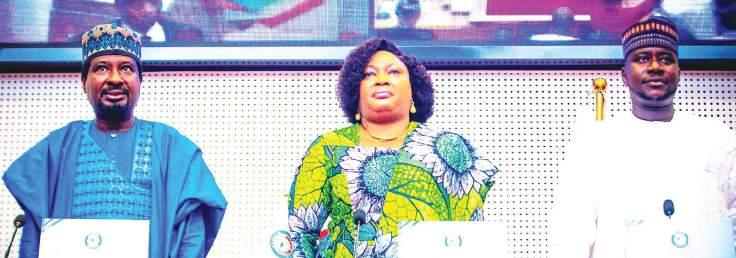
Nestoil, Nigeria’s biggest Engineering, Procurement, Construction & Commissioning (EPCC) company yesterday said that the principle of ‘lowest bidder’ which has been taken advantage of by those he described as ‘briefcase’ contractors was hobbling the growth of the oil industry.
Speaking at the ongoing Nigeria Oil & Gas (NOG) Week in Abuja, the Group Managing Director of Nestoil, Dr Ernest Azudialu-Obiejesi, argued that for Nigeria to be able to develop capacities in the industry and begin to export those capacities, it must have a credible contracts bidding process.
He spoke on a panel themed: “Exportation of Local Capacity: Maximising Regional Opportunities“ during the Nigerian content session seminar by the Nigerian Content Development Monitoring Board (NCDMB).
Azudialu-Obiejesi stated that to ensure those capacities in terms of human resources, capital and equipment are exported to other countries, the current setbacks in terms of how laws are enforced to protect the local companies, must be tackled.
“We have also seen that one of the reasons why the local companies are not doing very well is because they don't have what we call a good bidding process. This is a bidding process where everybody says it’s the lowest bidder.
“And there are a lot of people who are briefcase contractors who don't have capacity, but they will tell you they have connection. And because of that, they go and bid for jobs they cannot do at the lowest
prices. So these things have to be checkmated.
“If we checkmate those things, it's going to help the local content capacity, so that when you are bidding for a job in the oil and gas industry, you compare apples to apples and not apples to oranges, so that people of the same technical capacity can bid for a job,” he stressed.
He further argued that laws that are enacted must be enforceable to ensure that they can benefit indigenous firms.
In an interview on the sidelines of the programme, he pointed out that Nigeria can begin to export capacities in the oil and industry when it is able to entrench current opportunities efficiently.
He explained that the African Continental Free Trade Zone Area (AFCTA) when fully implemented will help break all the current barriers inhibiting trans-border businesses.
The GMD said that the company has grown from a service company in 1991 to an oil producing company now, becoming one of the biggest pipeline companies in Nigeria and serving the International Oil Companies (IOCs).
“Today, one of the biggest lines that Shell has used in Nigeria for the past 20 years was built by Nestoil. Apart from that, we built so many pipelines for the IOCs, both for Chevron and Mobil.
“Nestoil has grown from pipeline to dredging, from dredging to major fabrications for offshore companies. Also it has gone into dredging and has gone into even aviation services. We give helicopter services to so many oil and gas companies today in Nigeria, ” Azudialu-Obiejesi added.
He stated that the company
now has a dry dock facility in Port Harcourt, stressing that it remains one of the biggest in civil works, mechanical works, and has grown capacities to even export the experiences and the technologies it has acquired to other countries.
According to him, some of the people trained by Nestoil, are now captains of industry and have gone to other companies to set up businesses of their own.
Earlier in his opening remarks, Executive Secretary NCDMB, Felix Ogbe, said the seminar was an excellent platform to provide clarity, expositions, tips, and guidance to industry practitioners on several issues in the Nigerian local content space. He pledged that the board will evaluate current policies and guidelines to encourage the development of
indigenous capabilities and guarantee that the policies and guidelines are not misused, misapplied, or misinterpreted.
“Let me use this opportunity to reiterate the board's unwavering dedication to implementing the presidential policy directive on local content compliance.
“The presidential policy directive, when fully implemented, will sig-
nificantly impact Nigeria's oil and gas industry, grow our economy, ensure cost competitiveness and attract further investments to the industry and the country at large,” he added.
He explained that the board was also determined to establish an enabling business environment that will attract more investors to the country's oil and gas sector.
The National Agency for the Prohibition of Trafficking in Persons (NAPTIP) has promised to give more bite to its ongoing war on trafficking in persons by embracing data collection and collaborating with all important stakeholders.
Director-General of NAPTIP, Professor Fatima Waziri-Azi, made the pledge on Monday at the opening of a capacity building programme for NAPTIP officers and Civil Society Organisations (CSOs) on Human Trafficking and the Harmonised Reporting Tools.
Waziri-Azi, represented by the agency’s Director, Legal and Prosecution, Mr. Hassan Tahir, stated that the place of data in national development could not be over emphasised.
She added, “Data collection is the basis of our programming for human
trafficking. It is a known fact that data drives policy interventions and operational activities in several fields, and particularly, the counter-trafficking sphere.
“Reliable data enables us to identify trends, allocate resources effectively, and craft evidence-based strategies that are impactful towards the detection and elimination of the heinous crime of human trafficking.”
She further said, “To all the participants, this workshop provides you a unique opportunity to make a difference in counter trafficking efforts in Nigeria, especially, in the agency.
“You are privileged to have been selected to be here. I, therefore, urge you to remain focused and fully engaged throughout this training. Your role is critical, and the skills you acquire here will not only enhance your capabilities but also empower you to train other data collection
John Shiklam in Kaduna
Ahmed Dangiwa, Minister of Housing and Urban Development, says more than 80 per cent of Nigerians cannot afford mortgage to own houses.
The minister said this on Monday at the maiden edition of the Kaduna International Housing Exhibition, which held at the Yar’Adua Hall, in Kaduna.
According to the minister, statistics have shown that almost half of Nigeria's population of over 201 million are poor and have weak purchasing power.
He added that the recent macro-economic challenges, including inflation have made things worse.
He said the major issue governments at all levels need to address in the desire to deliver sustainable housing to citizens, is the issue of
affordability.
His words: "In fact, of the 43 million households, over 85 per cent have less than N1.1m purchasing power. Of this, 40 per cent (about 17.2 million households fall into the poverty income group and 47 per cent (about 20.2 million) fall into the low-income group.
“On the whole, statistics reveal that Nigeria is a low-income country as it has only 13 per cent of its population as middle class.
"The recent macro-economic challenges including inflation have made things worse.”
Dangiwa however said that against this backdrop, the President Bola Tinubu-led government, through the Ministry of Housing and Urban Development, is planning to establish a National Social Housing Fund (NSHF).
He explained that under the NSHF, the federal government is aiming to pull funds from the government budget, philanthropic organisations and well-meaning Nigerians to provide decent shelter for people with no income, low income and vulnerable citizens who cannot afford to own their homes.
He said: “Some of these units will be delivered at no cost. We have developed the concept which is undergoing review. Once concluded, we will present it to the Federal Executive Council (FEC) for approval and legislation."
According to him, "Social housing is not only a necessity, but also a security insurance for the rich and the poor.
"Housing is capital intensive and the government has limited funds. We must find alternative collective
avenues to help our brothers and sisters who are underprivileged; it is for our collective good.
“In this way, the underprivileged will know that we are one; that we are our brother's keepers and that will help social cohesion, understanding and peace.
"This is because home ownership gives individuals a sense of belonging and a stake in the community.”
He commended the Kaduna State Government for its practical, inclusive and pragmatic vision for housing delivery, part of which led the to the organization of the Kaduna International Housing Exhibition.
Speaking earlier, Governor Uba Sani, represented by Hadiza Balarabe, his deputy, said one of the priorities of his administration is the provision of affordable housing for citizens.
officers across the various formations of NAPTIP nationwide and to other stakeholders, especially, the CSOs.”
Waziri-Azi said, “The consultants and other experts have been carefully selected and they will guide you through various pertinent topics. The excellence shown in this training will undoubtedly have a positive impact throughout the entire agency, bolstering our collective efforts against human trafficking.”
She reminded the participants, “You are aware of the performance bond that I signed early this year with the Honourable Attorney-General of the Federation and Minister of Justice.
“That performance bond is based on the eight priorities of the present administration, which is evidence based. You are key to achieving that performance bond as the agency relies on you as data officers of your departments and units to track those activities we said would be carried out and ensure full compliance, with evidence of achievements harvested.
“This would be done alongside your work plans, which are also in tandem with the National Action Plan.”
She told the participants, “Our job as a critical agency of government is to always stand tall in contributing to national development and ensuring the safety of our vulnerable population whom criminal elements are seeking to devour.
“We have from the onset vowed to make life unbearable for human traffickers and all those involved in various acts of violence against persons in Nigeria, and we are not ready to shy away from that responsibility.
“We shall continue to make our communities difficult for human traffickers to operate.”
She said some participants from the workshop would be selected and sent to the commands to cascade the training.
On his part, the agency’s Director, Research and Programme Department, Mr. Josiah Emerole, said, “This
capacity building has come at a very auspicious time when the agency is focusing more on evidence-based programming, which only proper data collection, analysis and dissemination can provide.
“It is also coming at a time when the present administration of President Bola Tinubu is focusing on evidencebased performance from all Ministries Departments and Agencies (MDAs) in line with the performance bonds signed with ministers.”
Emerole disclosed that at the end of the workshop, “The reporting tools will be used as the accepted template for reporting counter trafficking activities in the agency and to the agency. The CSOs and other stakeholders are to adopt same template in reporting to the National Stakeholders Consultative Forum (NSCF).
“CSOs present are to step down this training to other member organisations for uniform reporting while training for STF on the template will be conducted during the Bootcamp early August 2024.
“NAPTIP participants shall step down the training in their respective departments and units.
“Selected participants would facilitate step down trainings across the NAPTIP commands in the next activity phase.”
A goodwill message from the Acting Country Representative of the United Nations Office on Drugs and Crime (UNODC), Nigeria Country Office, Danilo Campisi, said, “Based on lessons learned from implementing the first NAP of 2009 to 2012, improved data collection, monitoring, evaluation, and reporting of the level and success of implemented activities through the development of a harmonised data collection system with stringent reporting tools and guidelines that allow for high-quality and timely reporting is one of the integral objectives for the implementation of the current NAP, which significantly explains further, our reason for being here today.”
Emmanuel Addeh in Abuja
The Nigerian Upstream Petroleum Regulatory Commission (NUPRC) led by Mr Gbenga Komolafe, is spearheading the formation of the African Petroleum Regulators Forum (AFRIPERF) to, among others, facilitate knowledge sharing as well as technology transfer in the continent’s oil industry.
Speaking at a maiden gathering in Abuja yesterday to fast-track the establishment of the organisation, Komolafe said the objectives of AFRIPERF were clear and ambitious and would be pursued with all Hevigour.noted that the forum when fully formed, will promote cooperation and coordination among regulators of African petroleum producing countries as well as
Emmanuel Addeh in Abuja
Nigeria and not President Bola Tinubu needs a presidential private jet for several reasons, including the fact that the current one being used by the president was purchased during the Olusegun Obasanjo administration and has been used by four other Nigerian leaders, THISDAY can report. There have been controversies over the proposed purchase of a new presidential jet, following the problems encountered by the airplane on separate trips to Saudi Arabia, The Netherlands and South Africa. However, THISDAY can tell that aside from the fact that the presiden-
John Roberts stated, "We conclude that under our constitutional structure of separated powers, the nature of presidential power requires that former presidents have some immunity from criminal prosecution for official acts during his tenure in office."
It added, "At least with respect to the president's exercise of his core constitutional powers, this immunity must be absolute. As for his remaining official actions, he is also entitled to immunity."
Trump is the Republican candidate challenging Democratic President Joe Biden in the November 5 US election in a rematch from four years ago.
The court’s slow handling of the blockbuster case already had helped Trump by making it unlikely that any trial on these charges brought by Special Counsel Jack Smith could be completed before the election.
Trump had argued that he was immune from prosecution because he was serving as president when he took the actions that led to the charges. Smith had opposed presidential immunity from prosecution based on the principle that no one was above the law.
During April 25 arguments in the case, Trump’s legal team urged the justices to fully shield former presidents from criminal charges –“absolute immunity” – for official acts taken in office. Without immunity, Trump’s lawyer said, sitting presidents would face “blackmail and extortion” by political rivals due to the threat of future prosecution. The court’s 6-3 conservative majority included three justices Trump appointed.
Smith’s election subversion charges embodied one of the four criminal cases Trump had faced.
Trump, 78, is the first former US president to be criminally prosecuted as well as the first former president convicted of a crime.
In the special counsel’s August 2023 indictment, Trump was charged with conspiring to defraud the United States, corruptly obstructing an official proceeding and conspiring to do so, and conspiring against the right of Americans to vote. He pleaded not guilty.
Trump’s trial had been scheduled to start on March 4 before the delays over the immunity issue. Now, no
enhance the dissemination of best practices.
In addition, the NUPRC chief executive explained that it will enhance the capacity of its member countries in the sustainable management of petroleum resources and help to advocate for the interests of African petroleum producers on the international stage.
Besides, Komolafe explained that the proposed AFRIPERF will promote investments and economic development in the petroleum sector across Africa.
The roundtable was themed: “Fostering Collaboration and Sustainability in Africa’s Petroleum Industry: The Launch of AFRIPERF and Critical Next Steps.”
The establishment of the AFRIPERF, he said, signifies the regulators’ commitment to working together to
tial jet of any nation remains, in some way, the country’s projection of its national brand to other nations, for leaders of all modern democracies, a good presidential fleet also serves as a boost for robust international engagements.
The House of Representatives Committee on National Security and Intelligence had recently asked the federal government to purchase two new aircrafts for President Bola Tinubu and Vice President Kashim Shettima.
Contained in a report of the committee’s investigation into the status of the aircraft in the presidential air fleet, the committee stressed that it was in the best interest of the
trial date is set. Trump made his immunity claim to the trial judge in October, meaning the issue has been litigated for about nine months.
In a separate case brought in New York State court, Trump was found guilty by a jury in Manhattan on May 30 on 34 counts of falsifying documents to cover up hush money paid to a porn star to avoid a sex scandal before the 2016 election.
Trump also faced criminal charges in two other cases. He pleaded not guilty in those and called all the cases against him politically motivated.
A lawyer for the special counsel’s office told the Supreme Court during arguments that the “absolute immunity” sought by Trump would shield presidents from criminal liability for bribery, treason, sedition, murder and, as in this case, trying to overturn the proper results of an election and stay in power.
During the arguments, justices asked hypothetical questions involving a president selling nuclear secrets, taking a bribe or ordering a coup or political assassination.
If such actions were official conduct, Trump’s lawyer argued, a former president could be charged only if first impeached by the House of Representatives and convicted in the Senate – something that has never happened in US history.
In a May Reuters/Ipsos poll, just 27 per cent of respondents – nine per cent of Democrats, 50 per cent of Republicans, and 29 per cent of independents – agreed that presidents should be immune from prosecution unless they have first been impeached and convicted by Congress.
Smith, seeking to avoid trial delays, had asked the justices in December to perform a fast-track review after Trump’s immunity claim was rejected by US District Judge Tanya Chutkan that month.
Trump opposed the bid. Rather than resolve the matter promptly, the justices denied Smith’s request and let the case proceed in a lower court, which upheld Chutkan’s ruling against Trump on February 6. The immunity ruling came 20 weeks after Trump on February 12 sought relief from the Supreme Court. By contrast, it took the court less than nine weeks in another major case to reinstate Trump to the presidential
overcome common challenges and seize the opportunities that lie ahead to achieve their national aspirations in developing and utilisation of their hydrocarbon resources.
He explained that currently, Africa holds substantial oil and gas reserves, with the continent's proven oil reserves estimated to be around 125 billion barrels, representing approximately 7-9 per cent of the world's total oil reserves.
On the other hand, he stated that the proven natural gas reserves are estimated at around 620 Trillion Cubic Feet (TCF), which is about 7-8 per cent of the global total.
“Aside from hydrocarbon resources, Africa is blessed with potential for green and blue hydrogen, solar, wind, biomass and critical minerals to develop clean energy technologies as well as a growing
country to procure the aircrafts to avoid a situation that would create a national crisis.
The committee was mandated by the lower chamber of the National Assembly in May to conduct a comprehensive investigation into the aircraft in the presidential fleet to ascertain their airworthiness and technical status.
The assignment followed a motion by the House Committee Chairman on National Security and Intelligence, Satomi Ahmed. It led to a heated debate on the floor of the House, when some lawmakers suggested that the president should travel via commercial aircraft or by road.
primary ballot in Colorado after he appealed a lower court’s ruling that had disqualified him for engaging in an insurrection by inciting and supporting the January 6, 2021 attack on the US Capitol by his supporters.
The timeline of the court’s immunity ruling likely does not leave enough time for Smith to try Trump on federal election subversion charges and for a jury to reach a verdict before voters head to the polls.
Trump took numerous steps to try to reverse his 2020 loss to Biden.
Federal prosecutors have accused Trump of pressuring government officials to overturn the election results and encouraging his supporters to march to the Capitol on January 6, 2021 to push Congress not to certify Biden’s victory, based on false claims of widespread voting fraud.
Trump supporters attacked police and stormed the Capitol, sending lawmakers and others fleeing. Trump and his allies also are accused of devising a plan to use false electors from key states to thwart certification.
Not since its landmark Bush
included Fintech companies, were crucial in ensuring both financial stability and the specialised financial intermediation the institutions were licensed to perform.
He stated that though the NBFIs might be small in number compared to conventional banks, that “should not be a crutch to excuse them from global best practices”.
Represented by CBN acting Director, Other Financial Institutions Department (OFID), Mr. Abayomi Orogundade, the CBN governor, said supervisors must ensure that fintech regulatory requirements were tailor-made to foster compliance with international standards.
He stressed the need to strengthen the anti-money laundering practices, deepen supervisory capacity on cybersecurity and fintech regulation, and implement risk based supervisory approach over NBFIs.
He said, “While we celebrate the milestones that the CSNBFI has achieved, I implore you not to rest on your oars. There is still a lot to be done. We must continue to push forward the agenda of strengthening
population predominated by young people representing a huge economic asset.
4. With a population of 1.49 billion compared to the combined population of Europe and the USA estimated at 1.1 billion, Africa has the second largest population among the continents of the world,” he added.
First mooted during the African Energy Leadership Forum and Awards at the Offshore Technology Conference in Houston, USA, In May 2023, he said the oil and gas regulators recognised the need for a unified platform that would bring them together.
“AFRIPERF was born out of this vision, with the primary goal of promoting collaboration, knowledge sharing, and the adoption of best practices across our continent for a secure energy future,” Komolafe said.
Also, the senate is said to be in agreement, with the Chairman of the Senate Committee on National Security and Intelligence, Shehu Buba Umar, said to be supporting the recommendation by the lower chamber’s committee.
The decision to purchase the aircraft has recently led to a national debate, with some Nigerians saying it was the wrong time to think of making any investment in any new presidential jet.
But many people have also argued that the pros outweigh the cons for not purchasing the aircraft.
“The point is that people are mistaking a national jet for a personal jet. It is far from it. The
versus Gore decision, which handed the disputed 2000 US election to Republican George W. Bush over Democrat Al Gore, has the Supreme Court played such an integral role in a presidential race.
Trump also faces election subversion charges in state court in Georgia and federal charges in Florida brought by Smith relating to keeping classified documents after leaving office.
If Trump regains the presidency, he could try to force an end to the prosecution or potentially pardon himself for any federal crimes.
Reacting to the ruling, Trump spoke about the ruling on his social media platform, arguing that the Supreme Court's decision "should end all of crooked Joe Biden’s Witch Hunts against me".
He said the ruling was a "big win for our constitution and democracy".
The former president specifically cited his Manhattan hush-money case, in which he was charged with 34 counts of falsifying business records. He is slated to be sentenced this month in the hush-money case.
the anti-money laundering practices; deepening supervisory capacity on cybersecurity and fintech regulation; and the implementation of risk based supervisory approach.
“We reiterate the importance of monitoring trends, risks and innovations of NBFIs/OFIs, as their increasing transaction volumes pose major financial system stability risk.
“Fintech loans are one of the most commonly reported innovations. While overall this may appear small in relation to the size of credit by DMBs, some jurisdictions, globally, have noted a growing trend in the volume of these loans.”
Cardoso said, “In many cases, fintech credit is provided via electronic platforms that connect lenders to borrowers – in which case the platform takes the role of a financial auxiliary.
“In some cases, however, loans are taken on the balance sheet of these platforms (even if it is short-term), in which case the platforms are akin to new types of financial intermediaries.
“These entities are typically fintech firms that offer applications, software, and other technologies to streamline
He argued that the recent surge in hydrocarbon discoveries across Africa, coupled with the pressing need for a sustainable energy transition, demands a concerted effort from “AFRIPERFeveryone. will enable us to address these challenges headon, ensuring that our regulatory frameworks are robust, our policies forward-thinking, and our actions aligned with global best practices,” he emphasised.
By extending to other African regulators, he stated that collectively, they can achieve the advantage of benchmarking regulatory practices.
In her remarks, the Deputy Director General, Petroleum Commission of the Gambia, Kanni Touray, noted that because the country is at the very infant stages of the petroleum cycle, made it even more of a necessity.
nation’s presidential jet is a brand from Nigeria to the world and it can boost a robust foreign policy and global engagements.
The jet is not personal to Tinubu, it is for “LeadersNigeria. of most modern democracies have their jets or robust national carriers, which provide a fleet for the presidency, like British Airways does. We don’t have a robust national carrier.
“So the presidential jet is what we have used in the 25 years of democracy to champion our return to the world. Despite recent hiccups in the economy, which happen periodically, we should not lose sight of why Nigeria needs a presidential jet,” a THISDAY expert said, albeit anonymously.
For the record, 737 Boeing Business Jet (BBJ) was acquired during the Obasanjo administration at a cost of $43 million and has since become a source of financial liability to the country due to old age and excessive use.
The continuous maintenance of the close to 25-year-year-old aircraft, according to sources, has become a guzzler of public funds running into several millions of dollars at a time the economy is also facing critical challenges.
For instance, the Buhari administration, towards the end of the government took the same aircraft abroad for a detailed maintenance in preparation for the inauguration of his successor, but it wasn’t enough to put the aircraft back in a sound state.
“After the Sani Abacha misrule, former President Olusegun Obasanjo, re-launched Nigeria to the global space, where we acquired a new Boeing Business Jet, Boeing BBJ and that was used to revamp Nigeria’s pride of place globally.
“After eight years, that jet continued to be used by four presidents
mobile and online banking.”
He said, “In many jurisdictions, these digital firms have a banking license and are subject to prudential requirements or they may just be regulated as fintech payment service firms. Innovations linked to crypto or stablecoin assets were also reported by some jurisdictions.”
Director, West African Monetary Institute (WAMI), Dr. Olorunshola Olowofeso, said after turbulent years, the outlook was gradually improving in WAMZ.
However, Olowofeso said the funding squeeze persisted, as governments continued to grapple with financing shortages, high borrowing costs, and impending debt repayments.
According to him, the emerging risks to the financial system include climate-related risks, internet disruption, cyber and social media threats arising from the digitisation of financial services.
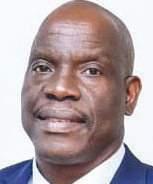
“It is countries like Nigeria and Ghana that we look up to, who have gone through the entire spectrum, from exploration to development to production that we can look up to and to copy the good things that they have accomplished.
after: Umar Yar’ Adua, Goodluck Jonathan and Muhammadu Buhari and now Bola Tinubu.
“It is time to change it for both safety and national security reasons.
The other day, the vice president of Malawi died in a plane crash, an aging fleet. We cannot wish that for our leaders. Should we, God forbid, lose a leader by such circumstances, it will hit Nigeria in a bad way.
“There will be battles and there will be growing instability and then there’s the national security implication of such an incident.
“So, after so many years, the right thing for National Assembly to do is to pass a legislation and give a proper budget for a proper and fitting presidential jet,” the expert added.
THISDAY has further gathered that aside the one-off wholesale payment, there could be other creative ways to ensure that the purchase doesn’t negatively hit the national coffers, given the arguments in certain quarters about the state of the economy.
The expert contended that, “There are many ways it can be done cost-effectively. It could be done by having a long-term lease, which will involve periodic payments, by having engine programmes and insurance, which will ensure that parts of the aircraft are duly insured and paid by insurers. So, there are many means of doing it. Sometimes, it is cost-effective.
“And we have enough central bankers and corporate finance gurus to support it, such that it's not a whopping amount.
“So, besides the current economic challenges, we should not lose sight of a jet for Nigeria. It is not for president Tinubu, personally. It is for Nigeria. The last one, currently in use, was bought by the former president Obasanjo. We need another one at this time.”
He said to strengthen the resilience of the financial sector, member states should develop an adequate national cybersecurity strategy and appropriate regulatory and supervisory frameworks.
Olowofeso said the meeting presented another opportunity to review developments in the non-bank financial institutions sub-sector within the zone for the second half of 2023 and the first quarter of 2024, assess the regulatory and supervisory challenges of member states, and share experiences to mitigate emerging risks to the financial system of WAMZ. He said the meeting will specifically focus on identifying, assessing, and monitoring emerging risks, vulnerabilities, and early warning signals in the NBFI sector of WAMZ member countries, and provide relevant recommendations to the Committee of Governors of WAMZ. He acknowledged the pivotal role of NBFIs in the financial system, including enhancing access to credit, offering inexpensive and reliable ways of making payments, and supporting economic growth. Olowofeso said, “This underscores the need to strengthen the resilience of the NBFI sector to ensure a more stable provision of financing and reliable payments services.”
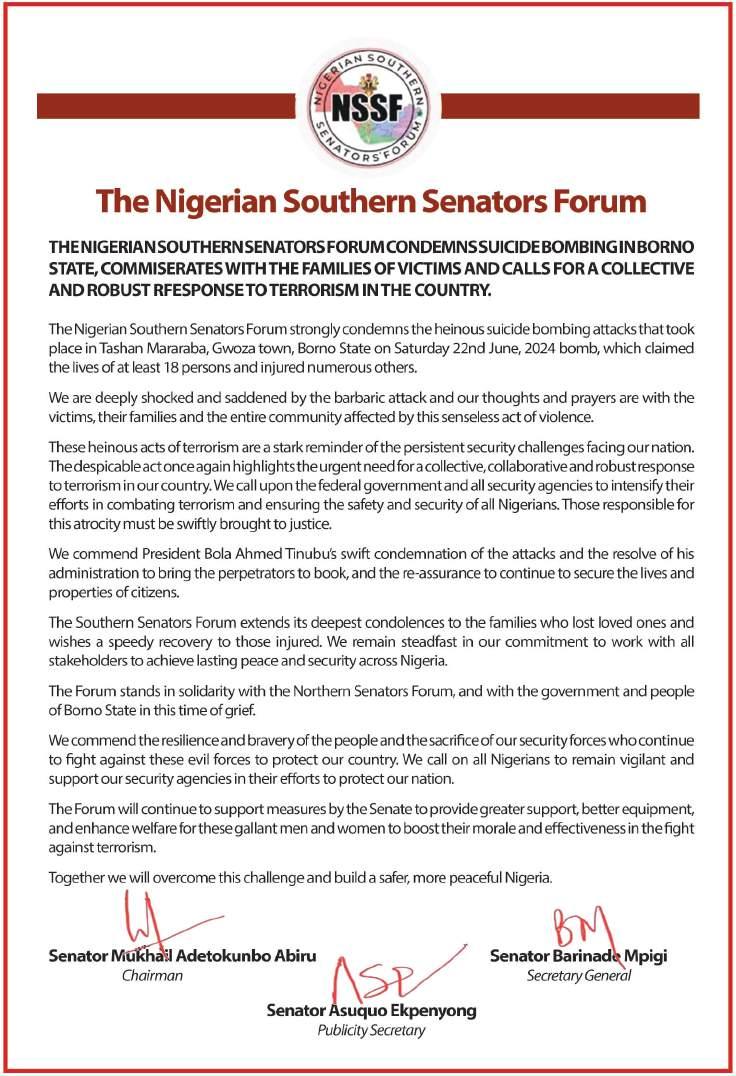



Email: deji.elumoye@thisdaylive.com
08033025611
The ambiguous comment of the Senate President, Senator Godswill Akpabio last week on the proposed purchase of new presidential aircraft at an emergency plenary to extend both the 2023 Appropriation Act and the 2023 Supplementary Appropriation Act through two separate amendment bills, has continue to generate controversy. Sunday Aborisade reports.
President of the Senate, Senator Godswill Akpabio spoke on the position of the Senate on the purchase of of a brand new presidential jet proposed by the House of Representatives Committee on National Security and Intelligence after the Senate Leader, Opeyemi Bamidele, drew the attention of his colleagues to the controversial matter.
The House of Representatives Committee had in a report, asked the Federal Government to immediately purchase new aeroplanes for the use of President Bola Tinubu and Vice President Kashim Shettima.
The Committee’s report, signed by its chairperson, Ahmed Satomi, and clerk, Makwe Eric, was based on the outcome of its technical subcommittee hearing on the status and airworthiness of aircraft in the Presidential Air Fleet (PAF).
Part of the report read, “The Committee is of the strong and informed opinion that considering the fragile structure of the Nigerian federation and recognising the dire consequences of any foreseen or unforeseen mishap that may arise as a result of technical/operational inadequacy of the Presidential Air Fleet, it is in the best interest of the country to procure two additional aircraft as recommended.
“This will also prove to be most cost-efficient in the long run apart from the added advantage of providing a suitable, comfortable and safe carrier befitting of the status and responsibilities of the office of the president and vice president of the Federal Republic of Nigeria,” it stated.
The position of the House of Representatives Committee attracted serious condemnation among Nigerians but the Chairman, Senate Committee on National Security and Intelligence, Senator Umar Shehu Buba, in an interview reportedly threw his weight behind it.
Buba was quoted as saying, “Not to quickly overhaul the presidential air fleet could endanger the lives of President Tinubu and his deputy. Have you seen the report of the committee? The committee’s recommendations are clear enough. To arrive at those recommendations, the committee conducted an investigative hearing and interacted with officials of the Presidential Air Fleet.
“The committee obtained the necessary information, which led it to call for the overhauling of the Presidential Air Fleet.
“It is true that our country is facing economic difficulty, but that will not be a justification to jeopardize or endanger the lives of our president, our vice president, other top officials of government and that of any citizen for that matter.
“We are all aware of the air mishaps in Iran and Malawi recently, which claimed the lives of the president and vice president of those countries, respectively. We commiserate with the people and governments of those countries.
“However, we must also, as a people, do whatever is necessary to lower the possibility of such disasters in our country.
“No sacrifice is too much to pay for the safety of our leaders and citizens. We elected them. So, we have a collective responsibility to protect them at all times.”
The reported backing of the procurement of executive presidential jets by the Senate panel chair drew the ire of many Nigerians which resulted in some online media, reportedly attributing Buba’s comments to the President of the Senate, Godswill Akpabio.
Akpabio instantly distanced himself from any comments on the matter. He spoke when he led the principal officers of the Senate to Maiduguri, the Borno State capital on condolence visit to the the Chairman, Senate Committee on Judiciary, Human Rights and Legal Matters, Senator Tahir Mongunu.
He specifically clarified that there was no time
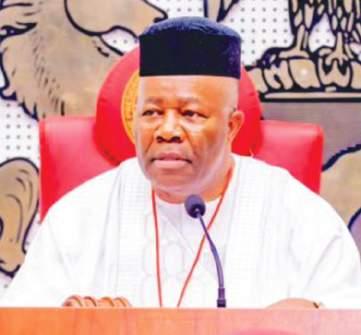
Akpabio
he called for the purchase of executive aircraft for Tinubu and Shettima.
Akpabio also said there was no such request before the red chamber, hence he couldn’t have spoken on an issue he wasn’t aware of.
An attempt by him to further give further clarification last Thursday did not clearly explain Akpabio’s position on the matter and the media report on the issue did not go down well with his media handlers.
Akpabio specifically made it clear in his speech that despite the fact that there was no such request before him, the Senate would not hesitate to grant such request not minding any form of blackmail from those he described as fifth columnists.
Similarly, one of the Senate President’s Media aides, Ola Awoniyi, also attempted further clarification on the matter in a statement he issued last weekend
Awoniyi’s opinion on the matter was titled, “Presidential Jet Controversy: What Akpabio
Said At Senate Plenary.”
He said, “About a fortnight ago, the Nigerian media widely reported that the House of Representatives Committee on National Security and Intelligence recommended, in a report, has given the green light that the Federal Government should purchase new aircraft for the use of President Tinubu and Vice President Shettima.
“The House had in May mandated the Committee to investigate the conditions of the aircraft in the Presidential fleet. That assignment followed a motion earlier debated by the House.
“Since that House Committee’s report was made public, the issue of acquiring new aircraft for Tinubu and Shettima became a controversy and a running story in the mainstream media and social media. That is normal. But it became a mischief when the President of the Senate, Godswill Akpabio was unfairly dragged into the controversy.
Akpabio also said there was no such request before the red chamber, hence he couldn’t have spoken on an issue he wasn’t aware of. An attempt by him to further give further clarification last Thursday did not clearly explain Akpabio’s position on the matter and the media report on the issue did not go down well with his media handlers. Akpabio specifically made it clear in his speech that despite the fact that there was no such request before him, the Senate would not hesitate to grant such request not minding any form of blackmail from those he described as fifth columnists.
“Akpabio was reported to have said things that he did not say. And when he tried to correct the falsehood, the harder he tried, the more vested interests twisted his explanations. Their purpose is clear: mischief.
“Let’s go back to Thursday 27th June, 2024, when both the Senate and House of Representatives reconvened to begin a new legislative year of the 10th Assembly. That Plenary was held six days earlier than the date scheduled for the resumption of the lawmakers.
“The resumption was brought forward primarily for the National Assembly to consider a request by the Executive Arm for an extension of the implementation of the 2023 Appropriation Act and the 2023 Supplementary Budget, which life spans were to elapse on Sunday, 30th of June, 2024.
“But some media outfits wrongly speculated that the Plenary was called ahead of schedule for the National Assembly to approve the purchase of new aircraft for Tinubu and Shettima.
“It is normal for the media to speculate. But you must admit your error if events prove your speculation to be wrong. Regrettably, some of the leading national dailies involved refused to admit that they goofed. Instead, they tried to justify their error with falsehood.
“At the said Plenary, the Chairman of Appropriation Committee, Senator Olamilekan Adeola, spotted an online report with the headline: “Presidential Jet: Senate Holds Emergency Session to Consider the Supplementary Budget.” He drew the attention of the Senate to the report and requested permission to read out its first paragraph. It reads: “(Adeola) said, ‘The Senate held an emergency session to consider President Bola Tinubu’s Supplementary Appropriation for 2024 fiscal year which includes funding of acquisition of a new Presidential Jet.’
“The Senator said he was embarrassed by the report because it is false. He then moved a motion for the reporter of the story to be invited for his explanation before the appropriate committee of the Senate. The Senate unanimously granted the prayer.
“The Leader of the Senate, Opeyemi Bamidele, had earlier seen a similar report in the social media and also drew the attention of the Senate to it.
“In response to the observations made by Senator Bamidele, the Senate President narrated his own experience to his colleague Senators.
“However, Akpabio’s intervention immediately became another issue in the media. He was largely misrepresented. Most of the headlines did not match the stories on what he said. In some cases, the reports were embellished and took Akpabio’s contribution out of context.
“The comments made by the Senate leaders at the plenary were basically the same. That no request for the purchase of new aircraft for the presidential fleet was before the Senate.
“That in the event of any such request in future, the National Assembly would look into it. That blackmail and propaganda by vested interests would not distract lawmakers from their statutory responsibilities.
“Alas!, these comments curiously gave birth to headlines such as: “No Amount of Blackmail Will Stop Senate from Approving New Presidential Jet - Akpabio,” “Blackmail Can’t Stop Presidential Jet Approval - Senate,” “Akpabio Insists on Approving Purchase of New Aircraft for Tinubu, says No Blackmail will Stop Decision,” “New Presidential Jet: Tinubu’s Wish, Senate’s Command - Akpabio.” Awoniyi then reproduced the verbatim recording of the remarks of the Senate President and Senate Leader but his intervention did not take away the confusion created by Akpabio’s ambiguous statement at the last Thursday’s plenary.

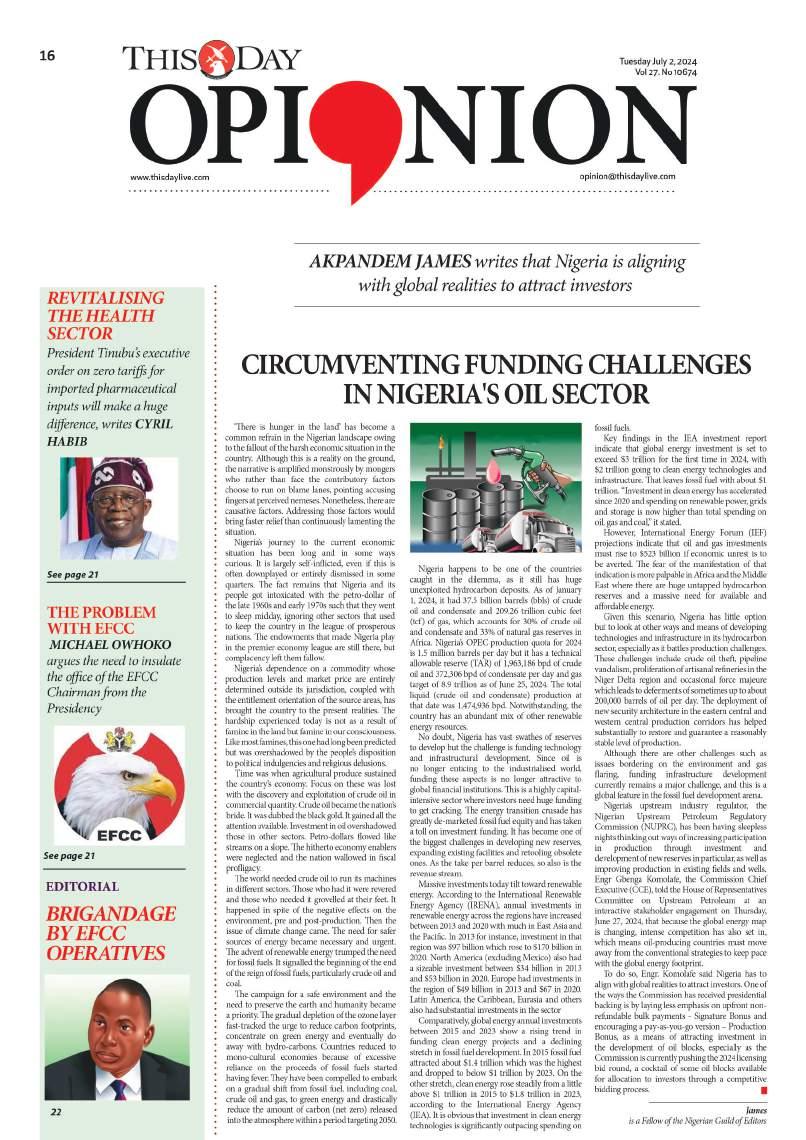
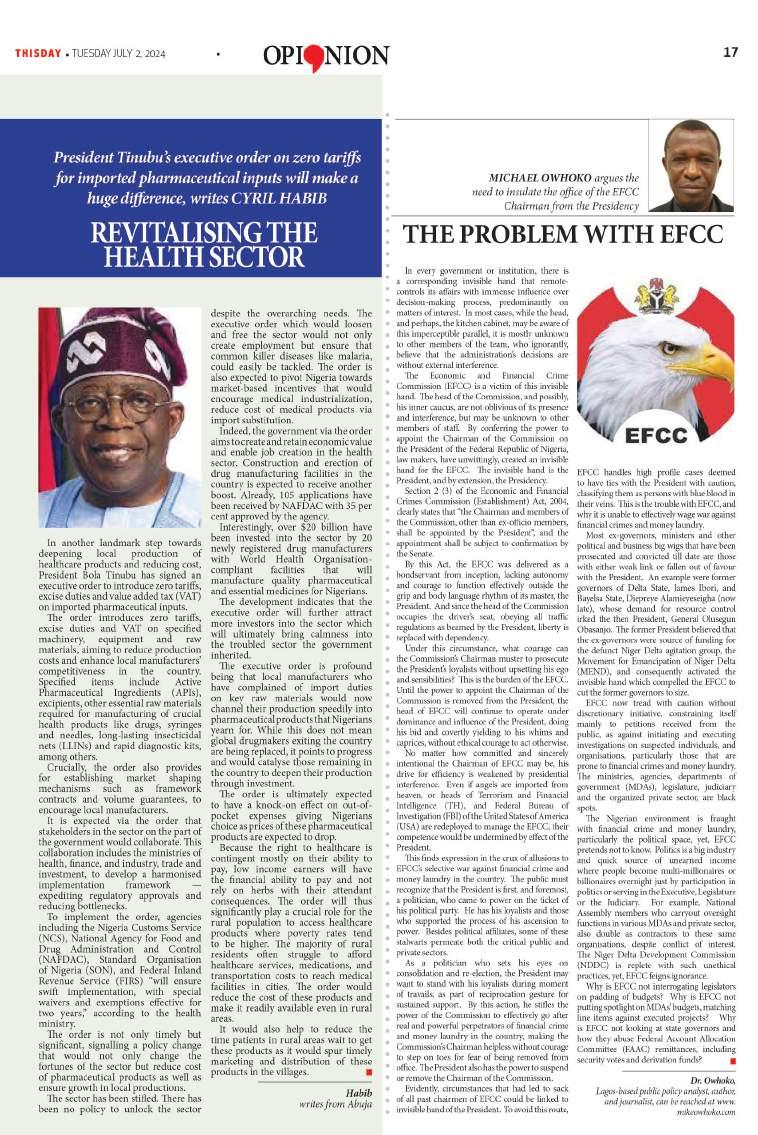
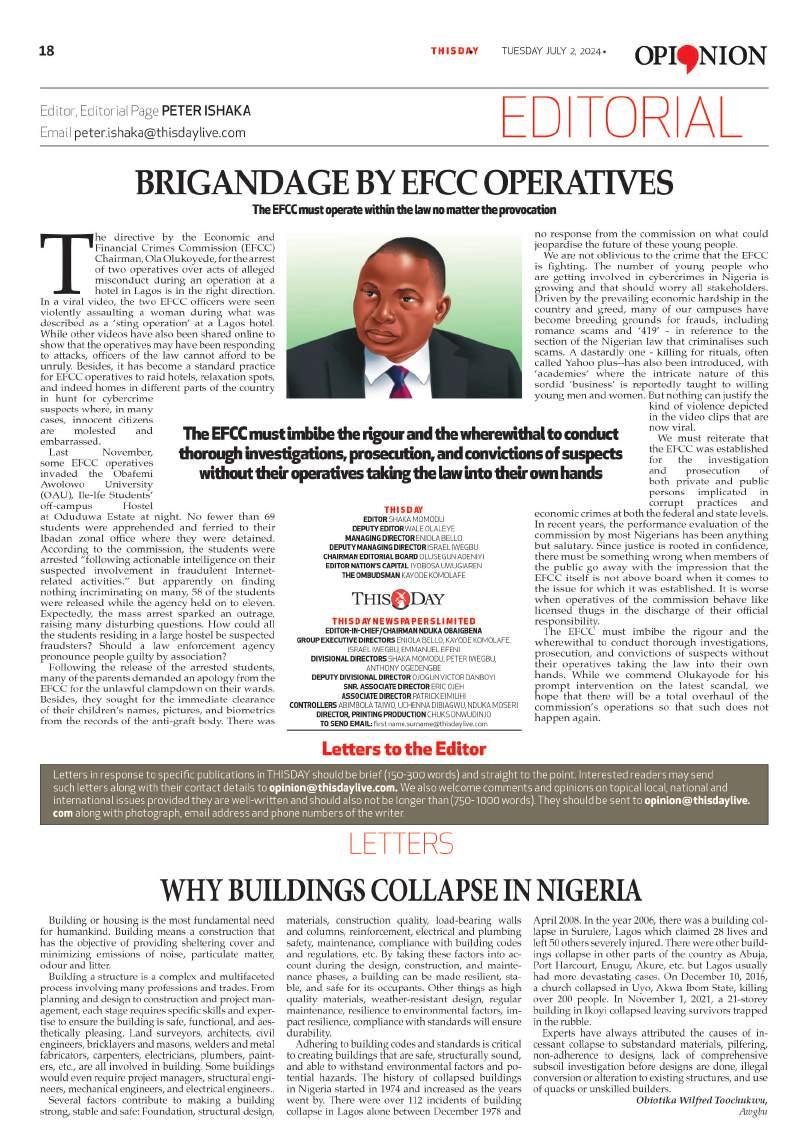
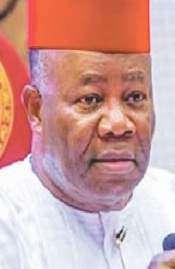
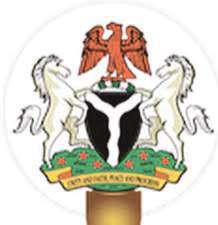

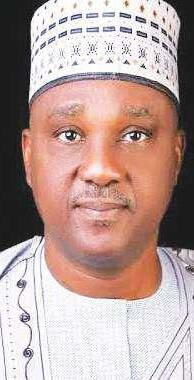




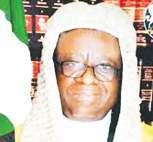

Whether a CounterClaim Can Survive Claim Commenced by Defective Writ
Page IV
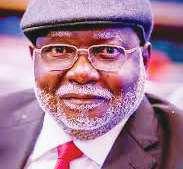
‘….Frivolous Interlocutory Orders emanating from courts of coordinate jurisdiction, which attempt to make a mockery of our judicial system. This is largely an embarrassment to our jurisprudence, and we will not take it lying low at all.' - Honourable Justice Olukayode Ariwoola, GCON, Chief Justice of Nigeria

Patronise Madein-Nigeria Goods to Grow Economy, Sanusi Charges
Nigerians
Page V
Nigerian Lawyer Appointed Into Ontario Law Commission Board
Page V

Parliamentary System: To Be or Not to Be
Page X
Executive Recklessness: May 2023 Ministry of Aviation Saga
In the news last week, was a videoclip of a House of Representatives Hearing on how sometime in May 2023, a few days to the end of the tenure of Hadi Sirika, the immediate past Minister of Aviation, and with his approval, Ministry of Aviation officials without following due process, auctioned and undersold two Bell Helicopters which had barely done 42 and 46 hours respectively (almost spanking new) belonging to the Nigerian College of Aviation worth $4.8 million, for $1.2 million to private individuals, on the guise that the helicopters were not being utilised, despite the fact that the Nigeria Army had written to them to express their interest in the helicopters, in order to use them to aid them in the fight against insecurity. Even though the proposed auction was advertised in the newspaper to invite bids, it is worthy of note to state that the sale of the helicopters was done without the requisite Federal Executive Council (FEC) or Presidential Approval.
Obviously, John Fitzgerald Kennedy’s famous quote from his Inaugural Address of January 20, 1961 when he took his oath of office as the 35th President of USA, “…Ask not what your country can do for you - ask what you can do for your country”, is farther from the minds of most Nigerian politicians and civil/public servants, than Neptune is from the earth! It is rather unfortunate, that many of those put in positions of trust and authority have breached their Oaths of Office, Code of Conduct and all the obligations contained in Chapter II of the 1999 Constitution of the Federal Republic of Nigeria (as amended in 2023)(the Constitution) with gusto and aplomb, and are more interested in plundering Nigeria for their own personal benefit, than to do anything remotely related to the nation building and development they were employed to do. Indeed, in their own case, it’s only about what Nigeria can do for them, and how they can abuse their positions to enrich themselves.
Why is it that at least 30-40% of these officials, are involved in some scam or the other? These scams/ corruption, are costing Nigeria dearly; and, it is time for Government to rise up and be more firm and decisive in the fight against corruption, while curbing its own unnecessary expenditure at the same time. These two destructive practices seem to be an African thing - also last week, we saw that Kenya seems to be passing through a similar experience as Nigeria, in terms of corruption and reckless expenditure by their Government.
Yahaya Bello v Willie Obiano: Who is Better? Additionally, in the news last week, I saw that the aside from the former Governor of Kogi State, Yahaya Bello (who is still at large), the former Governor of Anambra State, Willie Obiano is also facing corruption/money laundering charges. It may sound tragicomic, but does it make it better that, in doing a comparative analysis, Mr Obiano is not as bad as Mr Bello, because Mr Obiano’s charges only amount to about N4 billion, while Mr Bello’s charges are in excess of N80 billion? Or is Mr Obiano just as bad? Because, some of the money that he stands accused of siphoning, allegedly regularly came from the Anambra State Security Vote and went into private accounts controlled by him, funds that were paid monthly by the Federal Government to Anambra State for the purposes of securing the lives and property of the people of Anambra State; in a zone that faces security challenges due to the dastardly activities of violent separatist terrorist groups who have held the South East zone to ransom, even using force and fear to make the people adhere to an illegal sit-at-home order every Monday for years, making them lose income; while many have needlessly lost their lives. See Section 14(2)(b) of the Constitution, on the primary purpose of government being the security and welfare of the people.
Nigerians are amazed and disgusted that months later, Yahaya Bello has still not been arrested by the EFCC and produced in court, and to the chagrin of many, a fugitive like Mr Bello, transmitting from under the rock where he is hiding, is the one attempting to dictate the terms of how the case against him should be prosecuted!
Frivolous Interlocutory Applications
A common thread that runs through the Bello and Obiano cases, is that their Counsel both applied to the Federal High Court (FHC) Abuja, that their cases be transferred to their home States, Kogi and Anambra, because that is where they are alleged to have committed the crimes.
Of course, even a Baby Lawyer knows that it’s all delay and distractionary tactics. In PDP v Uche & Ors (2023) LPELR-59604(SC) per Uwani Musa Abba Aji, JSC, the Supreme Court held inter alia that the Federal High Court has jurisdiction throughout the Federation, and out of jurisdiction is outside Nigeria. In PDP v Uche & Ors (Supra) the location in question was
onikepo.braithwaite@thisdaylive. com onikepob@yahoo.com

“It
may sound tragicomic, but does it make it better that, in doing a comparative analysis, Mr Obiano is not as bad as Mr Bello, because Mr Obiano’s charges only amount to about N4 billion, while Mr Bello’s charges are in excess of N80 billion?”
Owo in Ondo State, and the Apex Court held that it is within Nigeria, and therefore, within the jurisdiction of the FHC Abuja. The same applies to Kogi and Anambra; they are within the jurisdiction of the FHC Abuja. In Adetona & Ors v Igele General Enterprises Ltd (2011) LPELR-159(SC) per Ibrahim Tanko Muhammad, JSC (later CJN), the Supreme Court had earlier held that “the FHC enjoys nationwide jurisdiction, whereas a State High Court is confined to the territory of the State and that of the Federal Capital Territory to the Federal Capital Territory (FCT)”. See also Section 19(1) of the FHC Act and Order 6 Rule 31(1) of the FHC (Civil Procedure) Rules 2019.
In Omonuwa v Oshodi & Anor 1985 2
N.W.L.R. Part 10 Page 924 the Supreme Court adopted the definition of Interlocutory Applications of Cotton LJ in Gilbert v Endean 1877 9 Ch.D 259 inter alia as those that are “….for the purpose of obtaining some direction of the court as to how the cause is to be conducted, as to what is to be done in the progress of the cause for the purpose of enabling the court ultimately to decide upon the rights of parties”. There are different types of interlocutory applications, including those to compel parties to provide further and better particulars; interrogatories or discoveries; or for injunctive reliefs. But, whatever the reason for the interlocutory application, they must be germane and not unnecessary, or a ruse like in the Bello and Obiano cases, where we already
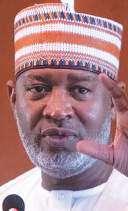
all know that wherever the alleged offences were committed in Nigeria, it is within the jurisdiction of the FHC Abuja.
In recent times, I have been arguing that when Counsel come to waste the precious time of the already over-burdened courts, Counsel should be sanctioned. Awarding heavy punitive costs against time wasters, is a good way to go. This should be applicable in the case of frivolous and baseless interlocutory applications like the ones made by Counsel in the Bello and Obiano cases, to transfer the matters to their home States. This is the only way to curb the onslaught of vexatious, time wasting interlocutory applications which are then appealed all the way to the Apex Court, in a bid to buy time and delay the substantive case, particularly because decisions in interlocutory applications usually do not finally dispose of cases, or effectively terminate or determine the rights of the parties in cases completely. See Ude v Agu 1961 S.C.N.L.R. 98.
In my humble opinion, cases shouldn’t be halted because of nonsensical applications, particularly in this kind of situation where the argument is not even that the FHC Abuja lacks jurisdiction to entertain the matter, but that the alleged offences took place elsewhere. Sometimes Counsel then apply for a stay of proceedings, while their pointless Interlocutory appeals go through the mill of appeals to the Supreme Court. The saving grace is that, by virtue of Section 306 of the Administration of Criminal Justice Act 2015 (ACJA), the
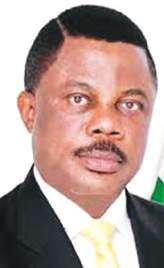
court isn’t permitted to entertain applications for stay of proceedings in criminal matters. The argument of Counsel in the Bello and Obiano cases would only have been justified, had their matters been brought before the FCT High Court, whose territorial jurisdiction is restricted to the FCT. In Union Beverages Ltd v Pepsicola International Ltd & Ors (1994) LPELR-3397(SC) per Yekini Olayiwola Adio, JSC the Supreme Court held inter alia that: “It is a fundamental rule of law that the court will grant an injunction only to support or protect a legal right. If the Applicant has no legal right recognised by law, there is no power to grant an injunction”. I believe that this fundamental rule also covers the field, when it comes to type of interlocutory application made by the Bello and Obiano Counsel. It is clear that, in both cases, they have absolutely no legal rights to protect, since the FHC Abuja is clothed with jurisdiction to hear both matters. After all, some, if not most of the monies they are accused of misappropriating, emanated from the Federal Government which is located in Abuja. What legal rights of Yahaya Bello and Willie Obiano exist or run the risk of being violated, by hearing their cases in FHC Abuja? Absolutely none. In Obeya Memorial Specialist Hospital v AGF & Anor (1987) LPELR-2163 per Andrews Otutu Obaseki, JSC, the Supreme Court held inter alia that, the decision of whether or not to grant an interlocutory injunction has to be taken where “the existence of a right or the violation of it or both is uncertain and will remain uncertain until final judgement is given in the action…. to mitigate the risk of injustice to the Plaintiff during the period the uncertainty could be resolved, that the practice arose of granting him relief by way of interlocutory injunction”. Again, if we apply this principle to the Bello and Obiano interlocutory applications, there is no reason for the courts to exercise their judicial discretion in their favour, as their rights are not being violated by the venue of their prosecution being at the FHC Abuja.
Conclusion Nigerians are exhausted by the activities of unscrupulous politicians and civil/public servants, as we are all paying a heavy price for their corrupt practices with underdevelopment and harsh conditions of living. Of course, we understand that this didn’t just start in the Tinubu administration, but has been going on for decades; but President Bola Ahmed Tinubu’s “Renewed Hope” Agenda implies that Nigerians will be given a more positive outcome in their expectations. This cannot be done, without taking the fight against corruption seriously. While Mr Obiano submitted himself to the law and is out on bail, Yahaya Bello remains a fugitive. No one can understand why law enforcement is pussyfooting instead of arresting Mr Bello and bringing him before the court of law, while the court seems to be indulging him, despite the fact that he is a fugitive who is also in contempt. It is shocking that Counsel in Mr Bello’s case would also apply for a stay of proceedings in the matter before the FHC Abuja, when Section 306 of ACJA is as clear as crystal that such application isn’t permitted in criminal matters under any circumstances. At the risk of sounding like a broken record, I continue to reiterate, because I cannot over-emphasise the fact that, it has become apparent that it is time to infuse more discipline into the practice of law, both on the side of the Lawyers and Judicial Officers.
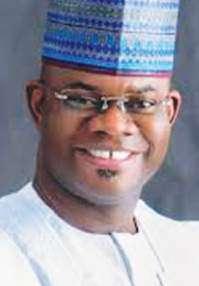
Facts
In 1995, the 1st and 2nd Respondent (as 2nd and 3rd Plaintiff) filed an action at the High Court of Lagos State in a representative capacity against the Appellants and the other Respondents, over the chieftaincy of Onilado of Ilado-Odo in the Badagry Creek Region of Lagos State, as well as the superintendence over all the land known as and comprised in the Ilado-Odo and Inagbe Islands. The 1st and 2nd Respondent sought to be declared the authentic representatives of the Esimikan family of Ilado, which was the undisputed family in which the right to become Onilado of Ilado resided. They sought amongst other reliefs, an injunction restraining the Appellants from parading themselves as members of the Esimikan family of Ilado-Odo and Inagbe and an injunction restraining the 2nd Defendant as constituted in the suit from holding himself out as the Onilado Odo or performing any of the customary functions of that office.
The Appellants filed a defence and a counterclaim against the 1st and 2nd Respondent seeking a declaration that they are the authentic members and accredited representatives of the said Esimikan family, and sought to restrain the 1st and 2nd Respondent from holding themselves out as members of the Esimikan family and from laying claims to ownership of, or dealing with any lands belonging to the Esimikan family.
At the close of trial, the trial court in a judgement delivered on 5th June, 2012 dismissed the 1st and 2nd Respondent’s case and granted the reliefs sought in the Appellants’ counter-claim. Being dissatisfied, the 1st and 2nd Respondent appealed to the Court of Appeal. Their appeal was predicated on the ground that the trial Judge wrongly assumed jurisdiction over the case, by reason of the fact that the writ of summons and statement of claim filed by them at the trial court was not signed by a known legal practitioner, thus, the entire suit together with the Appellants’ counter-claim notwithstanding that it was properly signed by a known legal practitioner, was void ab initio.
The Court of Appeal, in a unanimous decision delivered on 12th January, 2018, allowed the appeal, and struck out the entire proceedings before the trial court including the Appellants’ counter-claim. Aggrieved, the Appellants lodged an appeal at the Supreme Court.
Issue for Determination
The Supreme Court adopted the sole issue formulated by the Appellants, which it re-couched in its own words as follows:
Whether the Appellants’ counter-claim which was properly signed and filed, can survive the Respondents’ defective writ of summons and statement of claim.
Arguments
Counsel for the Appellant contended that, a counterclaim being a wholly independent and distinct action from the claim on the writ can survive, even if the Plaintiff’s claim oblates or is stayed or aborted in whatever form, and that as a matter of law, it is a cross-action notwithstanding that it is combined in one action with the Plaintiff’s case. He commended the case of OROJA & ORS v ADENIYI & ORS (2017) LPELR – 41985 to the court. He submitted that a Defendant’s right to plead counter-claim as a cross-action is specifically donated by section 24(3) of the Judicature Act of 1873, an English Statute of General Application which became enforceable in Nigeria vide the Supreme Court Ordinance of 1914, and argued that the rules of court which provided four methods by which a plaintiff can commence an action, cannot override the statutory provision which creates and recognises a counter-claim as being a mode of initiation of an action.
He argued that the Appellants having proved their counter-claim, the invalidity of the 1st and 2nd Respondents’ writ of summons should not affect their case, as the same was a separate action.
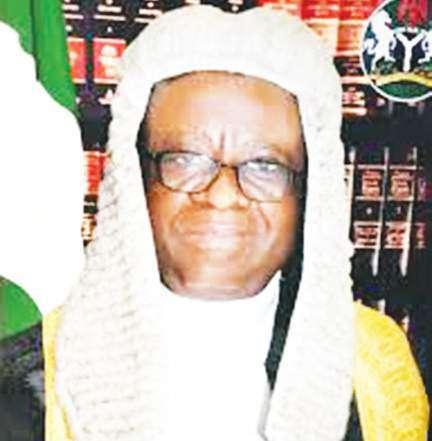
Honourable John Inyang Okoro, JSC
In the Supreme Court of Nigeria Holden at abuja
On Friday, the 15th day of december, 2023
Before their lordships
john Inyang Okoro
Helen Moronkeji Ogunwumiju adamu jauro Tijjani abubakar emmanuel akomaye agim justices, Supreme Court SC. 146/2018
Between
1. PRINCe MOBadeNle OyeKaN
2. alaBI dOSuMu
3. MuFuTau TadeyO
4. adeSOjI ajOSe aPPellaNTS (for themselves and as head and representatives of asi-dosunmu family of lagos)
And
1. adISa WaHeed aBeRuaGBa
2. RaSHeed aKaNGBe OluSHeSI (for themselves and as head and representatives of the esimikan Family of Ilado-Odo and Inagbe Islands)
3. CHIeFTaINCy COMMITTee, OjO lOCal
GOVeRNMeNT aRea
4. CHIeFTaINCy COMMITTee, aMuWO OdOFIN lOCal GOVeRNMeNT aRea
5. laGOS STaTe COuNCIl OF OBaS aNd CHIeFS
6. MIlITaRy adMINISTRaTION OF laGOS STaTe
7. aTTORNey-GeNeRal OF laGOS STaTe
ReSPONdeNTS
(Lead Judgement delivered by Honourable John Inyang Okoro, JSC)
He submitted that the Court of Appeal was wrong to have struck out their counter-claim, and set aside the judgement of the High Court on their counter-claim.
Counsel for the 1st and 2nd Respondent on his part opened his argument by submitting
“….the 1st and 2nd Respondent’s suit at the trial court that was not commenced by due process cannot activate the jurisdiction of the Court; is null and void ab initio; and for this reason, the Appellants’ counter-claim erected against the 1st and 2nd Respondent’s defective claim cannot survive”
method of commencing an action. He placed reliance on SKENCONSULT NIG LTD v SEKONDEY UKEY (1981) 1 SC PAGE 6. In response to the Appellants’ submission that the Judicature Act of 1873 specifically provides for a Defendant’s cross-action by way of counter-claim, Counsel submitted that the Rules of Courts have made provisions for all the situations alluded to in the said Act. He specifically pointed out Order 19 Rules 9, 10 and 11 of Lagos State High Court (Civil Procedure) Rules 1994, to submit that a counter-claim, where necessary, must be contained in a statement of defence; thus, where there was never a claim to which a defence would be required, there cannot be a counter-claim. He urged the Court to dismiss the appeal.
Court’s Judgement and Rationale
The Supreme Court referred to the provisions of Section 2(1) and 24 of the Legal Practitioners Act 2004, and held that it is clear from the said provisions that for a person to engage in the practice of law as a legal practitioner, his name and not the name of his firm, must be on the roll of legal practitioners. The Apex Court also reiterated the settled point that where a court process is issued in the name of a law firm, such process remains incompetent, and hence, it goes without saying that the 1st and 2nd Respondent’s originating processes signed by “Afe Babalola & Co.” were incompetent.
The Apex Court held further that while the Appellants were right that a counterclaim is, to all intent and purposes, a distinct action by itself to which the Plaintiff in the original action may file a reply by way of a defence to the counterclaim if he so desires; it was incorrect that a counterclaim can be used to initiate an action independent of the originating process to wit: the writ of summons commencing the main claim.
The Court held that our jurisprudence recognises four modes of commencing an action in court, namely: Writ of Summons, Originating Summons, Originating Motion and Petition, and these constitute the foundation or substratum upon which all other processes in the suit are laid, be it statement of claim, statement of defence, counterclaim, interlocutory applications, verifying affidavits and the likes. It follows therefore, that for a court to assume jurisdiction over a matter, the case must be commenced by due process of law, that is, by an originating process duly signed by a legal practitioner whose name is on the roll. The Court referred to its decision in APADI v BANUSI (2008) 13 NWLR (PT. 1103) 204.
The Apex Court held that in the instant case, the counter-claim of the Appellant, not being one of the laid down procedures for commencement of action, can only find its root in the 1st and 2nd Respondent’s writ of summons, and the said writ of summons having been signed by Afe Babalola & Co. which is not recognised in law as a legal practitioner is incurably defective, the necessary consequence is that the Appellants’ counter-claim would have no leg to stand.
The Court clarified that the circumstances in the instant appeal present an exception to the general rule that a counter-claim is an independent claim and survives even where the claim is discontinued or struck out, in that the principle that a counterclaim survives irrespective of the terminated status of the main claim is only applicable where the suit was properly commenced; it would not apply where the main claim itself is commenced by a defective writ.
that the 1st and 2nd Respondent’s writ of summons filed at the trial court to commence the action was a nullity, having not been signed by a known legal practitioner. Citing ODEDO v OGBUEGBEGO (2015) 13 NWLR (PT. 1476) PAGE 229 AT 267 and MCFOY v UAC (1962) AC 152, he submitted that the entire suit at the trial court comprising their claim was a nullity ipso facto, thus, there was no claim before the court. He submitted extensively that where there has been no claim, it would be impossible to validly make a counter-claim, and that the jurisdiction of the court to entertain the counter-claim was ousted by a defective writ.
Counsel argued further that where there was never a claim before the court, a counter-claim cannot emerge suddenly to breathe life unto itself and under the rules of court, a counter-claim is permitted as a cross-action by the Defendant, only where there is a claim by the Plaintiff, but not as a
The Court held that the 1st and 2nd Respondent’s suit at the trial court that was not commenced by due process cannot activate the jurisdiction of the Court; is null and void ab initio; and for this reason, the Appellants’ counter-claim erected against the 1st and 2nd Respondent’s defective claim cannot survive. Appeal Dismissed.
Representation
A. A. Osara with Joseph Oche for the Appellant. R. A. Aladesanmi, for the 1st and 2nd Respondent. S. B. Joseph Jnr, for the 3rd Respondent. Afiz Abdullahi, D. D. Ministry of Justice, Lagos State with E. R. Agu (Mrs.) A. D., Oluwayemi Osunsanya, ACSC for the 5th – 7th Respondent.
Reported by Optimum Publishers Limited, Publishers of the Nigerian Monthly Law Reports (NMLR)(An affiliate of Babalakin & Co.)
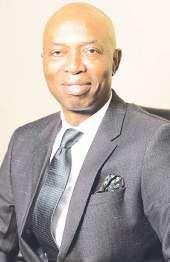


Alex Enumah in Abuja
The newly reinstated Emir of Kano, Muhammad Sanusi II, has called on Nigerians to embrace locally made
products, in order to grow industries in the country.
The Emir gave the charge while delivering the Keynote Address at the Nigerian Bar Association (NBA)
Section on Business Law (SBL), 18th
Annual International Business Law Conference 2024, held in Abuja. Sanusi, a former Governor of the Central Bank of Nigeria (CBN), opined
that a cultural orientation that would see Nigerians consider locally made goods above imported ones, would enable local industries not only survive, but thrive.
A Nigerian Lawyer, Kingsley Jesuorobo has been appointed as a member of the member of the Board of Governors of the Law Commission of Ontario, Canada, effective September, 2024, for a three-year term.
In an exclusive chat with THISDAY LAWYER, Mr Jesuorobo said “My appointment was through a special selection process, characterised by public advertisement and a competitive interview”.
“The Law Commission of Ontario makes laws, policies and programs more accessible for Canadians in Ontario. It promotes access to justice through recommendations on ways to make the legal system more inclusive, relevant and effective. The commission also promotes the leveraging of technology to improve access to justice.
“My appointment marks an exciting fulfilment of my yearning to be in a collaborative space populated by an array of people of high professional pedigree, who dredge knowledge and proffer reform solutions that align our legal system with the best of values and civilised norms that ultimately enhance access to justice.
“My appointment is also a testament to the power of positivity. It is positive proof that when we defy the mumblings and ramblings around us as to our capacity, competence and contextual connectedness and only listen to clarion calls from within us to stand up to take our rightful place, nothing can get in the way.
“Membership of the Board of Governors include appointees of the Judiciary, the Law Deans of Ontario, Osgoode Hall Law School, the Ministry of Attorney-General of Ontario; Law Society of Ontario and other distinguished individuals, including the legendary Raj Anand, who is the Chair.”
Jesuorobo is the Founder and Principal Counsel at Kingsley Jesuorobo & Associates: Barristers, Solicitors & Notaries (1996Present). He is also the Founder and CEO of Danalix Software Limited, an all-in-one legal and business management software solution that simplifies service delivery and fulfils the regulatory compliance needs of professionals in the legal sector. He is also the Chairman of the Board of Directors of Lil Requester, a technological software solution that helps developmentally
challenged people to combat socio-communication challenges; and also serves as a member of the Law Society of Ontario’s Advisory Council on Access to Innovation (A21) where he is actively engaged as part of a team of experts that reviews applications from developers of innovative technological legal services to serve Ontario consumers (2021 - Present).
Jesuorobo graduated from the University of Benin, Nigeria with
LL.B. (Hons) and he attended the University of Toronto for his Canadian LL.B. equivalency program. He was called to the Bars of Ontario, Canada (1996) and Nigeria (1990).
He currently serves as the Chair of the Board of Directors, Canadian Association of Nigerian Lawyers (CANL) (2022 - Present). He served as the President, Canadian Association of Nigerian Lawyers (CANL) (2017 - 2019).
He co-founded Canada's
first 24-hour black television network, First Entertainment Voice of Africa Television (FEVA TV); and he served as the Chief Legal Counsel at FEVA TV (2013 – 2016.) He served as the Chair of the Board of Directors, Canada Nigeria Chamber of Commerce (2011 to 2012). He is the author of an Amazon Bestselling book, titled: “Province of Poetry: A Collection of Poems and Philosophical Phrases”.
According to the Emir who was represented by Alhaji Suleiman Barau, such a cultural change is crucial in improving economic development.
"We need to change our culture of patronising foreign products, we need to patronise local producers", he said, adding that, unless Nigeria's exports outgrow imports, the balance of payment will remain negative, which is not healthy for the nation's economy. Meanwhile, he called for the introduction of laws that will enable the nation to diversify its source of revenue generation, and to also enable Nigerians find alternative sources of doing business.
The trial of two Medical Doctors, Michael Atiba and Michael Ugbeye, before the High Court of Lagos State, Ikeja, presided over by Justice Oyindamola Ogala, over the alleged involuntary manslaughter of a patient, Ejiro Ugorobi, could not go on last week due to the absence of a witness.
When the matter was called for the trial to commence, Justice Ogala was informed by the Prosecution that the witness who was meant to testify in the case could not make it to court due to ill health. Consequently,
Justice Ogala adjourned until October 7, 2024, for trial to commence.
It would be recalled that the Lagos State Government, LASG, had on March 25, 2024, arraigned the Medical Doctors over their alleged involvement in the involuntary manslaughter of the deceased patient.
Specifically, Atiba, a Doctor at the Gbagada General Hospital, and Dr Ugbeye, a Consultant with the National Orthopaedic Hospital, Igbobi, Lagos, are facing a count charge of involuntary manslaughter as
The Supreme Court of Nigeria on Friday, June 28, 2024, affirmed the conviction of the former Managing Director of Bank PHB Plc, Mr Francis Atuche, for N25.7 billion fraud.
The Apex Court, in a unanimous decision, held that Atuche, the Appellant, failed to dislodge the finding of the trial court which convicted him, and the Court of Appeal which affirmed the conviction. The judgement brings the criminal charge to finality after over 13 years.
The Supreme Court earlier this year, heard Chief Wole Olanipekun, SAN, leading Chief Anthony Idigbe, SAN, and Prof Fidelis Oditah, KC, SAN in Atuche’s appeal.
Dr Kemi Pinheiro, SAN, who held the fiat of the Attorney- General of the Federation, led the team of Lawyers representing the State, including Sebastine Hon, SAN.
In the lead judgement read by Hon. Justice M.A.A. Adumein, JSC, the Supreme Court relied on its previous decisions that where the judgement of a trial court on the demeanour of a party or witness is supported by the documentary evidence tendered, an Appellate Court has no business in tampering with the decision of the court.
In conclusion, the Court upheld Pinheiro and Hon’s argument, that the Appellant did not give it any reason to
tamper with the concurrent finding of the two lower courts.
Atuche, his wife, Elizabeth, and the bank’s former Chief Financial Officer, Ugo Anyanwu were arraigned in 2011, by the Economic and Financial Crimes Commission (EFCC) before Justice Okunnu of the High Court of Lagos State EFCC Prosecutor, Dr Kemi Pinheiro, SAN preferred a 27-count amended charge against the three for their alleged involvement in a N25.7 billion fraud. On June 16, 2021, the court convicted and sentenced Atuche and Anyawu in a judgement that took almost 12 hours to deliver. Atuche’s wife was
discharged and acquitted.
In the judgement, Justice Okunnu noted that both convicts defrauded the Bank using well-recognised stockbrokers to transfer money under the guise of loans and shares.
“It was a well-planned, well-executed scheme, but, the bubble burst when the Central Bank of Nigeria intervened”, she said.
Not satisfied with the High Court judgement, Atuche filed an appeal.
On the 23rd of June, 2022 after hearing the appeal, the Court of Appeal in Lagos affirmed the conviction of both Atuche and Anyanwu, while reducing his sentence to 12 years in jail.
made against them by the LASG.
While the arraignment lasted, the counsel for the LASG, A. O. Azeez hinted to Justice Ogala that the incident took place on October 21, 2023.
Counsel also informed the court that the incident took place at No. 20, Michael Adekoya Street, Ilupeju, Lagos State, adding that Atiba and Ugbeye unlawfully caused the death of one Ugorobi by the wrongful application of medication before and after surgery.
According to Azeez, the alleged offence contravenes Section 224 of the Criminal Law of Lagos State, 2015.
But, the Medical Doctors pleaded not guilty to the charge, prompting Justice Ogala to give a trial date.
Azeez said, “Given the plea of the Defendants, we are asking for a trial date”.
Meanwhile, the Lawyers for the Defendants informed the court of their bail applications, both dated March 21 and 22, 2023, respectively.
Dr Atiba's Counsel, particularly, told the Judge that he filed a bail application dated March 22, 2024, and urged the court to grant Atiba bail on liberal terms, with an addition that he is a medical doctor who is in the business of saving lives and not taking lives.
The Counsel for the
second Defendant, A. O. Fayemi, while moving the application for bail dated March 21, 2024, prayed to the court to grant his client bail on self-recognisance. Fayemi revealed that the application was based on six grounds of 31 paragraphs, adding that the first Defendant has served the nation as a Consultant Orthopaedic for over 30 years. In his words: "The first Defendant is a consultant who has served this nation as a Consultant Orthopaedic with the National Orthopaedic Hospital, he is not a young man who would not attend court.
“He is a consultant medical practitioner, he has a clinic at Ilupeju, and he is a person who will present himself for trial. I urge your Lordship to grant him bail on liberal terms.”
In a bench ruling, Justice Ogala granted the Defendants bail in the sum of N5 million each, with two sureties each in like sum. The Judge directed that the sureties must be residents within the jurisdiction of the court, present credible home and office addresses, and have credible financial status. Justice Ogala also ordered the sureties to present their BVN and NIN, evidence of payment of tax to the LASG, and explain their relationship with the Defendants.
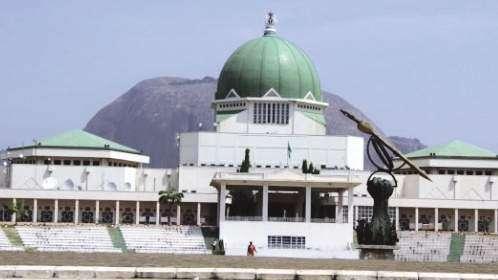
In search of an ideal, feasible and rancour free system of government, Nigeria has tried and experimented with various forms of government, including Parliamentary and Presidential systems, both of which rightfully or wrongfully, some believe may not have been completely successful, and may need some tweaking into our own homegrown version. To this end, the National assembly is presently engaged in considering a Bill that will constitutionally entrench a six-year single term for the nation’s Presidency, to be rotated amongst the country’s major regions, so that all can have a bite of the cherry of governance at the highest level. Would this assuage the political mistrust, fears and suspicions over the present four-year Presidential system in which there’s no constitutional provision for rotation among the regions? In this discourse, George Ogunatde, SAN; Adewale Adesokan, SAN; Gboyega Okunniga and Dr Sam Amadi do an in-depth examination of the issue
‘No’, to a Single Six-Year Regional Rotational Presidency
George Oguntade, SAN
Lawmakers’ Proposal
Iread with great interest, the recent proposal by 35 oppositional lawmakers proposing a Bill for a six-year single term Presidency, rotated amongst the geopolitical zones of the country. And, I am definitely not in favour of the Bill, as I believe it will do more harm than good in the long run.
The Cons
Firstly, a six-year term is way too long.
The consequence of such arrangement is that a President who is not performing to the satisfaction of the people, will remain foisted on them for a significantly longer period than
currently obtains. Four years seems about the right term, and this is what obtains in many democracies, no doubt based on experience.
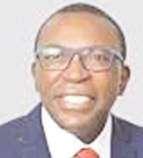
“Four years seems about the right term…. A single sixyear term, is also likely to fuel and entrench unbridled corruption….Rotational Presidency amongst the six geopolitical zones goes against democratic tenets…. When we say rotational Presidency, it does not cure marginalisation. It only regionalises marginalisation. Instead of marginalisation being at the centre, it now brings marginalisation to the regions”
A single six-year term, is also likely to fuel and entrench unbridled corruption. A President, knowing he has a single term for such a long period will believe he has no need to account for his stewardship, and will simply enrich himself as much as possible. There will be no guardrail to act as a check against potential avarice, and this will ultimately harm the country.
Rotational Presidency amongst the six geopolitical zones goes against democratic tenets, and will expose us to the risk of having a totally unsuitable person assuming office simply because he is the “best” his region can offer. A country as big and diverse as Nigeria, cannot be run on such primordial basis.
Suggestions
Rather, we should be looking to improve the current two term fouryear Presidency, rotated by convention between the North and the South. We should strive to elect the right persons who have well articulated ideas, to move the country forward rather. It is also crucial to reduce the prohibitive cost of governance, which
I understand is one of the considerations that informed the recent proposal by the 35 lawmakers. This can be achieved without a six-year single term Presidency. All that is required is selfless, dedicated and committed leadership.
George Oguntade, SAN, Lagos
Opposition to a Single Six-Year Rotational Presidency
Adewale Adesokan, SAN
Reasons for Opposition
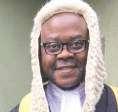
The first reason I am opposed to it, is because it will enthrone mediocrity, it will enthrone corruption, it will enthrone ethnicity, and it will enthrone bad governance. It will enthrone ethnicity, because every region whose turn it is to produce the President will see it
as their turn to take their share of national cake because they would have waited; they will assume it is their own turn to appoint their own people regardless of the merits. They will see it as a time to have their own piece of the national cake, and so, there will be even greater corruption. So, for that reason, it is not right.
It will also not be good for performance, because if a President cannot look forward to a second term, he does not have to perform well during a single term that he would have. In fact, that will only reinforce the fact that his six-year term is for him and his region, to have their own bite at the cherry. And so, all he wants to do is to take care of his region, and bad governance because merit is sacrificed.
Nigeria has a population of over 220 million people. We would now confine our choices, to a section of the country. That means we would not necessarily be fielding our best candidate, as the best candidate may or may not be from that region. That's another reason.
The other reason is that, it is not a popular idea. You won't find it popular in other countries, apart from Switzerland where they have a Collegiate Presidency. You don't have a rotational Presidency elsewhere except rotational government, which had been practiced twice by Israel, once by, Ireland, and very few others. The others who have proposed it, have not actually put it into place.
What is important is that we should find ways to modify our electoral system, so that elections can be free and fair. That should be our objective, when we are talking about regional Presidency and single term. Measures to ensure that our elections are free and fair, and that they reflect the wishes of a greater majority of Nigerians.
The other reason is that the very purpose for which the idea of having a rotational Presidency on a regional basis, the various ideas it is supposed to serve, is what our Federal Character Commission is serving. The principle of federal character can be found in the Constitution, and has been practiced over the years. In fact, we have a Federal Character Commission as an agency. If there's anything wrong with the way the principle is being practiced, let us fine-tune it.
When we say rotational Presidency, it does not cure marginalisation. It only regionalises marginalisation. Instead of marginalisation being at the centre, it now brings marginalisation to the regions. Every region has a multi-ethnic composition. Even the smallest of all the regions, has a multi-ethnic composition. Different ethnic groups and constituents of every region have attained different levels of prominence in education, in the civil service, in science and technology, and even in business. Some are more prominent in national life than others. When you get to regions, you find a situation in which a section of the region will now be lording it over the other parts of the region. In other words, what we are running away from the centre, what we are trying to cure at the centre, or what you thought you had cured at the centre by making sure that powers go to the different regions, will now rear its head at the regions, resulting in a situation in which constituent parts of regions are feeling marginalised, because one or
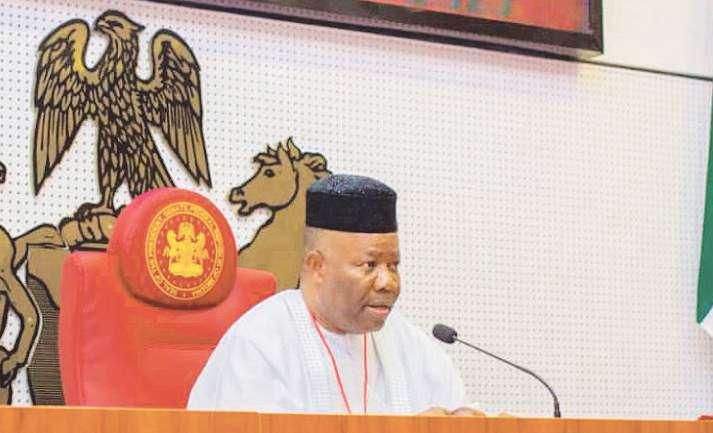
two of parts of the regions are the ones dominating the nomination of the candidates for Presidency. Check all the regions. That's predominantly what the experience has been. And so, it does not solve the problem. It only brings it nearer home from the centre.
Conclusion If anything is to be done to the term of the Presidency, it should be retained as it is, that is, a four-year term, twice. If it is to be changed, it should be changed to two five-year terms. So that, in all, a performing President will have up to 10 years to impact the lives of Nigerians. He will have sufficient time to impact the lives of Nigerians. Perhaps, instead of 25% of votes in two-thirds of all States of the Federation, may be it should be moved to 35%, so long as we are practicing the Presidential system, so that the President should be seen to be indeed, widely accepted.
Adewale Adesokan, SAN, Lagos
The Case for Single Six-year Presidential and Governorship Term
Gboyega Okunniga
A four-year term is too long for a President who is not a true spokesman of the people, who is imposed upon and does not lead. It is too short a term for a President who is doing, or attempting, a great work of reform, and who has not had time to finish it. To change the term to six years would be to increase the likelihood of its being too long, without any assur-
“The basic argument for the single term, is that the quest for re-election is at the heart of our problems. The desire for re-election, it is claimed, drives Presidents and Governors to do things they would not otherwise do, like turning the executive branch into a permanent campaign headquarters”

ance that it would, in happy cases, be long enough”Woodrow Wilson, 28th President of USA Democracy is an ever-evolving experiment, therefore, when it comes to the issue of term limits, there are no hard answers right or wrong. I struggle to see how an individual’s office term limit, or lack thereof, contributes to a “more democratic” outcome, or an outcome that voters would be more approving of. The proposed major alterations to the 1999 Constitution, including the introduction of a single six-year term for the President and Governors has been around for a long time. However, the prospects for adoption of the single six-year term appears to have gained some appreciable traction in this current dispensation, in light of the current administration’s favourable disposition to constitutional and political reforms. Therefore, its prospects for adoption cannot be dismissed out of hand, despite the longstanding opposition of some political class who have consistently branded it as a terrible idea for a number of reasons, among them, that it is at war with the basic tenet and philosophy of democracy. For all these reasons, a careful analysis of the pros and cons of the six-year single term remains very much in order. This article offers such an analysis, and a new slant on a familiar old debate. It is not intended to be a polemic in support of either. Having carried out a thorough review of the argument for and against the proposition, I am of the conviction that neither side has clearly stated its strongest argument. For example, the reason to be for the single six-year term is not because politics undermines the Presidency, or because Presidents need more time, but, because the mass public, now possessed of the power to decide whether a President returns to office, has recently seemed unpredictable and impulsive in its use of this power. Conversely, the reason to be against this reform is not solely because it is undemocratic, but, because there is no viable alternative to re-electability. Nonetheless, there is widespread sup-
port for a single term limit. According to a recent Atmos Green Research poll carried out amongst Nigerians in six countries including Nigeria, 78% of Nigerians voted in favour of a single, six-year Presidential and Governorship term. Among most polls, support for the single term was bipartisan. Moreso, Nigeria would not be alone in limiting its President or Governors to a single term (for example, Mexico, has a six-year term and South Korea, a five-year term).
Arguments For and Against
It is safe to assume that if something isn’t broken, nobody would want to fix it. Precisely what, then, do proponents perceive the problem(s) to be, and how would a single six-year Presidential term work to solve them? I count four distinct arguments in favour.
The Politics is Bad Argument. The basic argument for the single term, is that the quest for re-election is at the heart of our problems. The desire for re-election, it is claimed, drives Presidents and Governors to do things they would not otherwise do, like turning the executive branch into a permanent campaign headquarters. It leads them to make easy promises, and to postpone hard decisions. A single sixyear term would liberate Presidents from the pressures and temptations of politics. Instead of worrying about re-election, they would be free to do only what was best for the country. Another harmful consequence in this view, is that instead of doing what is courageous or correct, from a policy standpoint, a President is obliged to do what is popular, in order to protect his political prospects, and can even be motivated to do something illegal and foolish.
On the other hand, the opponents of the single term will argue that politics is good. The argument that a President free from re-election worries would do what is right rather than what is merely popular, contains an implicit and highly debatable assumption which does not bear up under scrutiny. The assumption that what is popular is invariably at odds with what is right, is thereby exposed for what it is: historically inaccurate and tinged with anti-democratic elitism. It is not at all clear that removing electoral accountability, would produce better Presidential decisions, all or even most of the time.
The Needless Burden Argument. This argument assumes that the quest for re-election compels the President to devote time, energy and talents to political campaign tasks. A President pursuing re-election faces a host of demands that range from attending the needs of political office-holders, office-seekers, financial backers and all the rest, to riding hard on the day-to-day developments within the pedestrian partisan arena. President Lyndon Johnson voiced the same concern in his memoirs, The Vantage Point. The growing burdens of office exact an enormous physical toll on the man himself, and place incredible demands on his time under these circumstances. The old belief that a President can carry out the responsibilities of the office, and, at the same time, undergo the rigours of campaigning is, in my opinion, no longer valid. It can, therefore, be argued that if the President is not saddled with the burden of re-election, his energies can be used more effectively.
On the other hand, the opponents have argued that it is worth remembering one important fact: a President can do as much or as little as he wants to about anything. To this end, they contend that the Needless burden argument, is tantamount to saying that the only solution to a broken arm is amputation. In this context, the six-year single-term Presidency might appear to be an overkill.
The Bureaucracy Argument. Put simply, the argument is that, Presidents do not presently have enough time to allow their policies a fair chance to work. A President now spends his first three years in office, just establishing control over the bureaucracy. The current four-year term is actually too short, to achieve any of the major changes and improvements that a President should accomplish. For example Federal and State Government budgets are prepared in advance, therefore, in its first year, an administration operates on the budget of its predecessor. In its second year, it operates on the budget which reflects its early aspirations. Only the budgets for the third and fourth years are prepared on the basis of solid experience. Four years is, therefore, not enough time to test any President or Governor’s leadership, or the merits of their policies.
However, it is the argument of the opponents that the contention that the President needs more time in order to put his measures into effect (the bureaucracy argument above), amounts to an effort to capture through a reorganisation what now must be earned at the polls. The substance of the argument itself? That it requires years to get control of the budget, and the bureaucracy was blunted by the quick strike of the Olusegun Obasanjo’s Administration, which brought both to heel within the initial year in office. An effective Presidential strategy, it seems, is worth two or more years of lost time.
The Fickle Support Argument. The strongest argument in support of the single six-year term, is what is called the fickle support position. It is also the most difficult to dispute, because there are good reasons to support it. The argument emerges from the conclusion that public support is too fickle and unreliable a commodity, to serve as the engine and the drive for the Presidential system. Although voters would still choose the President, but, they would no longer have the opportunity to evaluate him formally at the polls, where

it counts. A President or Governor decoupled from public opinion, would cast off a dependency which inhibits more than it helps. Such a President would be free to draw his strength from other sources, and to decide for himself what is right.
Conclusion
Having presented the opposition’s retort to the arguments in support, and saving our return to the much stronger fickle support argument for last, however, it is crucial for the supporters of the reform not to rule out some unintended consequences of the six- year single-term. First, there is the possibility that the six-year single-term Presidency, would unintentionally precipitate a decline in the legitimacy accorded to the government by the governed. This possibility stems from the fact that the reform covertly (and perhaps, unintentionally) attacks both the theory and the practice of democracy, the moral and ethical basis for the right to wield power in our system. Briefly, the theory of democracy holds that for a system to be democratic, leaders must be subject to a significant amount of control by followers. The major mechanism by which such control is exerted, is the electoral process. Citizens control leaders in part by choosing them in the first place, a practice which the proposed reform leaves undisturbed. But, a more direct and significant type of control, and one which this reform would eliminate, is the control exercised by the citizens when the President who is seeking re-election is asked to account for his actions and evaluated retrospectively on his record of performance.
To conclude, I submit that the strength of the reformer’s case lies in the fickle support argument, because the real problem is not burdens, budgets, credibility or the evils of politics. The real problem is the existence of evidence like that noted above, which lends credence
“…..a single term Presidency, coupled with constitutionally mandated rotation of office, will help to create a sense of inclusion and reduce ethnic and religious warfare over Presidential power”
to the implicit conviction of experts that the citizenry has not used its electoral power wisely enough to deserve it. This is a clear implication of the belief that what is popular will rarely, if ever, be equivalent to what is right, insofar as Presidential action is concerned. It is at least plausible to take such facts as widespread public apathy toward politics, low voter turnout, and unrealistic expectations for Presidential performance, as reasons to doubt the political judgement of the electorate. Perhaps, the public cannot be relied upon to exercise the discipline to control momentary passions, to see past gimmickry and flimflammery, or to learn enough of the issues to wield its constitutional power responsibly. Thus, we return to the age-old debate between those who do, and those who do not place greater faith in the rough wisdom of ordinary people than in experts or institutions. Proponents of a single six-year term clearly do not, and they have significant evidence to support their position. If they ever do carry the day, this will probably be why. Thomas Jefferson could have been responding to the fickle support argument when he penned the following retort: “I know of no safe depository for the ultimate powers of society, but the people themselves. And, if we think them not enlightened enough to exercise their control with a wholesome discretion, the remedy is not to take it from them, but to inform their discretion”.
Gboyega Okunniga, International Attorney and UK Solicitor, Coventry, UK
Dr Sam Amadi
Introduction
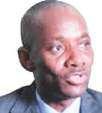
There is some significant clamour, for a return to regional structure of governance for Nigeria. The recent wave of the clamour originates with a strange memo circulating on social media, ostensibly prepared by an illustrious group that wants to force a constitutional change on the structure
of the Federation. It is being alleged that the memo has the buy-in of the Presidency, and is walking its way to the National Assembly where it would be passed into law. But, both the Presidency and the National Assembly have denied any involvement with such a Bill. So, what’s up?
History of Single Tenure Bill
In addition, there is a Bill pending before the National for a single term of six years for the President of Nigeria. This Bill seeks to amend the tenure of the President under the Constitution, such that a Nigerian President will stand election for the office only once and serve a term of six years. It is important to note that, this is not the first time a single tenure for the President has been proposed for constitutional reform. It started with General Abacha, when members of his aborted constitutional reform recommended a single tenure and multiple Vice Presidents for the country. That proposal was part of a well-reasoned scheme of power sharing, which aimed at ensuring that all parts of Nigeria have a significant sense of inclusion in political power. Abacha’s wise men wanted political power to rotate between the geopolitical zones. So, a single tenure ensures that all the zones get to hold Presidential power in a short period of time. Unfortunately, the Justice Nike Tobi Committee that reviewed Abacha’s constitutional proposal after the death of the strongman, rejected that constitutional proposal.
The idea of a single tenure for the President resurrected during Obasanjo’s Presidency, when he established a constitutional review committee. Suddenly, a draft Bill emerged, recommending a single tenure of six years for the President. That draft Bill caused so much bad blood amongst the conferees, and destroyed the credibility of the Conference. Expectedly, nothing came out of the Conference. Now, the Bill is back, suggesting either strong logic or a powerful constituency behind it, or both. We largely borrowed our Presidential system of government, from the United States. There, the President is electable for two tenures of four years each, and no more. The limitation of tenure was introduced later in the constitutional evolution of that country. Originally, there was no tenure limitation. George Washington was asked to continue for life, but he refused and backed down. FDR held power, for three tenures of
four years. The US Constitution did not provide for a limited tenure until 1951 when the twenty-second amendment was passed by Congress. It was part of the changes to the Executive Branch, proposed to Congress by the Hoover Commission appointed by President Truman. Before then, a person could run for President for indefinite terms. Alexander Hamilton, in Federalist 69, notably stated that “That Magistrate is to be elected for four years; and is to be re-eligible as often as the people of the United States shall think him worthy of their confidence”. But, that changed.
Nigeria followed the change in its own Constitution. Prof Nwabueze justified the choice of the President in the 1979 Constitution, the forebear of the 1999 Constitution, as the desire for a Chief Executive who could energetically drive economic and social development, unlike the Prime Minister under parliamentary system.
Considering the arguments for a Chief Executive for economic and social transformation as Nigeria’s Head of State, what is the advantage and disadvantage of limiting the office of the President to one single term of six years? One possible disadvantage, could be that a single tenure may be too short for a Presidential agenda. But, many argue that six years is enough for the President to envision and implement a development agenda. After the end of tenure, his political party can continue the agenda. The major mischief which the promoters of the proposal seek to avert, is tendency of incumbent Presidents to manipulate the electoral system to ensure they win election. It is argued that if we limit the term to a single tenure, it reduces the incentive for electoral manipulation. Furthermore, it enables the President to hit the road running and reduces inclination to excess politicking while in office, because there is no second term to bargain. Additionally, a single term Presidency, coupled with constitutionally mandated rotation of office, will help to create a sense of inclusion and reduce ethnic and religious warfare over Presidential power.
These arguments are strong, and outweigh the concern that a six-year single tenure might be short for a President to achieve his or her strategic vision. The mischief of electoral manipulation by an incumbent President is a more dangerous threat to democracy and development in Nigeria, than a prospect of a President not having enough time to achieve his agenda by virtue of a single six-year tenure. Many people will accept such small downside, for the massive upside of ending the spectre of electoral manipulation and destructive competition for political power.
Clamour for Regions
Let’s consider the clamour for regions. Well, one thing is sure, this memo has some institutional traction even if it has no official ownership for the moment. Since 2014, when President Goodluck Jonathan’s Constitutional Conference ended with recommendations to restructure the country, there has been some concern about the State structure and the Federal-State relationship in Nigeria. The anomaly of Federal-State relationship is not helped by the near bankruptcy of many of the States. These States cannot pay salaries, and are neck-deep in debt. The high

multidimensional poverty index in Nigeria is a bad testimony to the failure of leadership in the States, since the policies and administrative actions needed to reverse such gross poverty lie largely with subnational authorities. The lack of performance of State Governments reinforces the belief that the Federal-State structure cannot work in Nigeria. It is interesting that the campaign for a return to regions, goes side by side with campaign for a return to Parliamentary system of government. It is like the disastrous economic performance of the Government at the centre since 2015, has aggravated the nostalgia for the systems of the past. President Tinubu’s astounding leadership failure since his inauguration as President on May 29, 2023, has added fire to the fuel. We are now drenched in anxiety, and we want to make a quick dash to safety, in the form of restructuring. But, the problem is, there is no easy escape from a dysfunctional system.
The Constitutional Incubus
The real problem is the Constitution. Nigeria’s constitutional articulation of Federalism, is faulty. Usually a Federation is a relationship of two centres - Federal and State, as in the United States; Federal and Regions, as in Canada; or Federal and Cantons or Territories, as in Switzerland. Nigeria’s Federal system departs from this settled logic by constructing a monstrous Federation of Federal, State and Local Government, three centres instead of two. This incoherence breeds administrative failures. For example, the total castration of the local government system in Nigeria by State Governors, elicits the call for the Federal Government to intervene to straighten accountability in the management of the local government councils. As well-meaning and even inevitable as this call may seem, it is manifestly unconstitutional. By the incoherent provisions of the 1999
“Nigeria’s embarrassing economic and political failures are more a result of the poor leadership that has assailed it. Arguably, leadership failure more than State structure, may be the elephant in the room that needs to be shot dead”
Constitution, the Federal Government has no authority to direct the financial management of the local government councils. Similarly, by the same Constitution, in its provisions on the democratic nature of local government councils, any local government council being annexed politically by the State Government to the extent that its Chief Executive is not democratically elected, is no longer a local government council under the Constitution, and should not receive constitutionally mandated financial allocations. This is incoherence, big time.
The memo on the return to region, maps regions on top of existing States. Since the collapse of the First Republic that had the parliamentary system with regions as federating entities, Nigeria has entrenched a federation of Federal and State governments. These States are recognised by the Constitution as sovereigns with executive, legislative and judicial powers. How then can they co-exist as co-sovereigns with the Federal, within a regional structure? The constitutional incubus is such that even if we try a constitutional amendment it will be defeated at the State Assemblies, where Governors and legislators would be unwilling to lose their power. There is no conceptual way to have States co-exist with regions and the centre, in a coherent and workable Federal system. This is illusory.
One or two options are available for constitutional reformers. They may choose to have a new Federal system of Federal and States, where the bulk of powers exercised by the Federal Government is transferred to the State, and the Constitution mandates a significant degree of economic and political cooperation between States within a geopolitical zone, however, delineated. This will be the equivalent of an economic bloc with some constitutional authorisation and provision, but never a level of government with legislative authority.
The other option is to scramble the constitutional framework and create a new federal system of Federal and Regions. This has a lot of transaction costs that the visible and invisible promoters of regional system cannot afford at this period. Such proposal may not pass through the political gridlock and legislative supermajority required, because of anticipated opposition from some sections of the country.
It is not the Constitution, Stupid But, wait a minute. Why are we in a hurry to revert to regional system of government? What is the argument for such reversal? The argument seems to
be that Nigeria’s problems are caused by its State structure. Once we revert to regions, we will solve them. Of course, there is a problem with the manner the States were created. The lack of financial viability, is a problem. Their size is also a problem, because scale is important for economic growth. So, in the First Republic when we had the three regions, we recorded greater economic growth such that one of the regions, Eastern Nigeria, was reported as the fastest growing economy in the world. So, there is a good argument about the size and viability of the present State structure.
But, beyond that, Nigeria’s embarrassing economic and political failures are more a result of the poor leadership that has assailed it. Arguably, leadership failure more than State structure, may be the elephant in the room that needs to be shot dead. Institutions matter, and the design of institutions is a critical determinant of economic performance. For example, there are credible econometric studies that show that parliamentary system outperforms presidential system in GDP growth, and in measures of social stability. Its mechanism of check and balance is more effective, and it’s more responsiveness to social concerns, and therefore, all things being equal, more democratic. Similarly, the regional system with the autonomy it grants and the scale its presents for infrastructural development and markets, offer a better deal for development.
But, a big but, whether a reversion to regions in Nigeria will work wonders, actually depends on how we manage the other constitutional and institutional incoherences and contradictions that misdirect our politics. It also depends on the incentives that political actors will face, to compel them to exercise power in ways that achieve the strategic objectives of the constitutional design. Just as Daren Acemoglu and James Robertson put it in Why Nations Fail, without leadership that will not turn those institutions into exploitative institutions, the nostalgia for regions may end up just that. Whether reverting to regions, even if constitutionally feasible, will solve the problem of threatening State failure, depends on the complex interactions of institutions, policies and personnel. Nigeria’s problem is not mainly its State structure. The solution is not mostly changing to regions. The problem is more complex; the multiple interactions of institutions, policies and leadership.
Dr Sam Amadi
Nigeria gained independence from Britain in 1960, after several years of colonial rule. Expectedly, Nigeria adopted the Parliamentary system of government, being the one prevailing in Britain and many other commonwealth countries. The parliamentary system of government is one in which the party or a coalition of parties with the greatest representation in the parliament forms the government, its leader becoming the Prime Minister. In this regime, executive powers are exercised by members of the parliament appointed by the Prime Minister to the cabinet. The party or parties in the minority serve in the opposition to the majority, and have the duty to challenge the programmes and policies of the government regularly. This system of government is mostly regulated by conventions, rather than statutes. The Prime Minister may be removed from power, whenever he loses the confidence of a majority of the ruling party or of the parliament. One of the major features of the parliamentary system is individual and collective responsibility, which ensures the accountability of the government to the legislature and thus, the populace.
The collective responsibility of Ministers to the Parliament takes different forms. First and foremost, it signifies that the government remains in office only so long as it retains the confidence of the Parliament, and that all Ministers stand or fall together with that government. Ministers must support government policies, but they must also resign or seek the dissolution of the government if defeated in the Parliament on a matter of confidence (for instance, a vote on the budget). Collective responsibility implies that Ministers are bound by the decisions of the cabinet, even when they had no part in their discussion or decision.
Second, all members of the government speak in concert in the Parliament, unless the Prime Minister relieves them of that duty. This can happen when the government has no stated policy on an issue and allows a free vote to take place in the Parliament, or when the Prime Minister allows a member of his or her government to differ publicly from a policy. The principle of ministerial responsibility ensures that the government acts as one entity, and that this entity is answerable and accountable to the Parliament. This was well captured in Section 83 of the 1960 Nigerian Constitution which states that “the cabinet shall be collectively responsible for any advice given to the Governor-General by or under the general authority of any Minister of the Government of the Federation in the execution of his office”.
During the First Republic, a parliamentary system of government was in operation under the 1960 and 1963 Constitutions. This lasted till January 1966, following the military intervention in the Government of Nigeria. A Constituent Assembly was put together towards the exit of military rule in 1978, leading to the draft 1979 Constitution which established the Presidential system of government for the Second Republic. It was the first time Nigeria was
“We
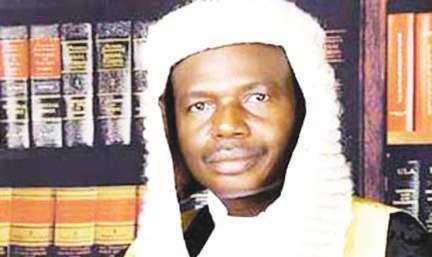
This article by learned Senior Advocate, Ebun-Olu Adegboruwa looks at the history of the Parliamentary and Presidential systems of government in Nigeria, highlighting the main features of each one. He concludes that Nigeria should retain the Presidential system instead of returning to the Parliamentary, and improve upon it, while at the same time, building upon our institutions and insulating them from political interference
experimenting with the Presidential system of government, comprising the executive and the legislature as separate and autonomous bodies. Although the President wields the same powers as the Prime Minister in the Parliamentary system, he has no control over and he is not part of Parliament.
In the Presidential system, the country was divided into constituencies and senatorial districts, which produced the parliamentarians, whilst the President was elected by the people through direct ballot. And, this has been one of the major reasons against the Presidential system, as it is said to be over bloated and too expensive to sustain.
Presently, and even with the separation from the executive, parliamentarians in Nigeria have no mind of their own, other than to do the bidding of the Executive. Requests from the Executive to the Parliament are not properly scrutinised before blanket approval is granted,
have had enough of the Presidential system to gather the experience needed to stabilise that option; whereas, we have only had one Parliamentary experience. We can build on these experiences to define our own brand of democracy, than to go back to the Parliamentary system”
candidates nominated for confirmation of the Parliament scale through parliamentary screening as a matter of course, and the legislature is more of an extension of the executive. What would then happen, were the Prime Minister to be a member of Parliament in Nigeria, together with his cabinet members? It will only be a matter of garbage in garbage out, and the people will be the worse for it. In the other jurisdictions where parliamentary democracy is practiced, the Prime Minister labours to convince parliamentarians on certain policy issues, and it does not take time for a vote of no confidence to be passed in deserving cases. That can never happen in Nigeria, where the parliament is busy padding the budget to take care of the pecuniary interests of its members. In fact, the parliament would most likely not sit on most occasions, preferring rather to announce wild approvals for executive policies without debate.
Ideally, the Parliament should be a check on the Executive, performing oversight functions over government ministries, departments and agencies. The Parliament should ensure the implementation of the appropriation law, to ensure compliance and to avoid corruption and waste. Where the Parliament is up and doing in the discharge of its constitutional duties, the Executive is tamed and assisted to perform maximally, under the doctrine of checks and balances.
In the case where the Parliament is truly independent and autonomous,
dictatorial policies and actions are curtailed, corruption is easily exposed and tackled, and the people will feel the positive impact of the government. I honestly do not think that Nigeria has advanced to such a state, where the leader of the ruling party (Prime Minister) is made to sit together in the same chamber with Parliamentarians and his Ministers. The influence will be overbearing and overwhelming, to the great disadvantage of the people.
Conclusion
If part of the agitation for a return to the parliamentary system of government is to save cost, we then need to choose between money and progress. We have had enough of the Presidential system to gather the experience needed to stabilise that option; whereas, we have only had one Parliamentary experience. We can build on these experiences to define our own brand of democracy, than to go back to the Parliamentary system. In any case, we will still have the same Independent National Electoral Commission, we will still have the same Election Tribunals and indeed, the same Nigeria Police Force. The challenge to me, is to build on our institutions to insulate them from political interference, and to have them manned by persons who are strong enough to stave off such unwarranted incursions. The other point is that the Parliamentary system of government is more like a unitary affair, which cannot suit the case of Nigeria with all its multi-ethnic and multi-religious entities. Let us retain the Presidential system, and improve on it.
Ebun-Olu Adegboruwa, SAN
08097710984 (WhatsApp only)
alekhuogien@yahoo.com

Wakanow, a Nigerian online travel agency, is set to spearhead a travel-tech revolution across Africa. At their recent ‘Wakanow Unpacked’ expo, the company introduced its new product lineup, promising enhanced ease, convenience, and profitability for users. Featuring over 1.5 million registered hotels, a multinational payment gateway, and a modular storefront on its revamped website, Wakanow aims to capture a significant portion of the trillion-dollar travel and tourism industry, reports Esther Oluku

Wakanow’s Group CEO, Bayo Adedeji, along with other management
The freedom to explore the world is undoubtedly one of life’s greatest pleasures. It allows us to experience nature’s beauty, immerse ourselves in diverse cultures, and share in the civilisations of people across the globe.
Travel encompasses more than just flights; it includes everything necessary for comfort and well-being throughout a stay at any destination. This covers food, accommodation, healthcare, recreation, and transportation.
The COVID-19 pandemic, with its restrictions on movement, severely impacted the travel and tourism industry, the hardest-hit sector. Four years after the pandemic, the United Nations World Tourism Organisation (UNWTO) notes that global economies have yet to fully recover to pre-COVID-19 levels.
According to the World Economic Forum (WEF) Tourism and Travel Development Index (TTDI) 2024, while middle- to high-income countries are expected to see significant growth in the travel and tourism sector, developing nations in Sub-Saharan Africa, like Nigeria and Côte d’Ivoire, remain on the margins of tapping into tourism’s economic potential. Of the 19 Sub-Saharan African countries featured in the 2024 TTDI, out of 119 countries globally, 12 ranked between 104 and 119.
GlobAl
The World Economic Forum (WEF) Travel and Tourism Development Index (TTDI) 2024 reports that global travel and tourism revenue reached 88 per cent of pre-COVID (2019) levels in 2023, totalling $9.9 trillion. A 2023 report by the UNWTO also states that global tourism alone generated $3.3 trillion, accounting for three percent of global Gross Domestic Product (GDP), with Statista forecasting a growth rate of 3.47 percent over the next four years. Additionally, a graph by Statista shows that hotels and package holidays account for over 75 per cent of travel and tourism revenue, and this industry alone is projected to contribute $446.50 billion in 2024. Statista also reports that with user penetration rates increasing from 25.9 per cent in 2024 to 28.1 per cent in 2028,
“As we continue to lead Africa, our success pales compared to the opportunity in front of us. The opportunity in front of us is larger than what we show and have taken.”
online sales will account for 76 per cent of total travel and tourism revenue. The hotel market is expected to increase to approximately 1.397 million users by 2028.
WeF’s vision For leverAGinG TechnoloGy To revoluTionise TrAvel And Tourism secTor
The WEF proposed integrating technology into the travel and tourism sector to enhance user experience and expand the industry into larger markets. Highlighting some of the benefits, the WEF report suggests that adoption will “revolutionise the tourism industry, fundamentally altering how travellers explore destinations and interact with service providers.”
“From personalised trip planning powered by AI algorithms to immersive virtual reality experiences, technology will increasingly offer travellers unprecedented convenience and customisation, while digital technology and online platforms empower destinations and T&T businesses,” it stated.
The Wakanow Group Chief Executive Officer, Mr. Bayo Adedeji, explained that the need to create products tailored to the African market while meeting the dynamics of emerging global travel demands necessitated upgrading the company’s user experience.
Wakanow Group has integrated a virtual travel assistant, fintech solutions, and accommodation booking into its product range. The new website features an AI travel assistant named Amina, a seamless international payment gateway (Kalabash54), and an Africa-focused accommodation service platform (Wakanow, Rest of Africa (Roomde)), which are set to significantly enhance the experience of African travellers. Adedeji noted that the new website’s functionality allows users to select multiple products and check out under a single ticket.
Discussing the inspiration behind integrating AI, fintech, and accommodation booking into their offerings, Adedeji said, “As we continue to lead Africa, our success pales compared to the opportunity in front of us. The opportunity in front of us is larger than what we show and have taken.
“Today, what we want to talk about is those opportunities, and our work right now has positioned itself to take those opportunities. I started to think about more than just air travel, and I said what happens on the other side of travel and
tourism. Africans don’t camp, and we obviously do not get on cruises either, but you know what we do? We stay in hotels and do package vacations. Africa is projected to spend about $3.8 billion in this division alone by 2028.”
Adedeji added, “Hotels remain the largest segment of this business. The number of users in hotels is expected to grow. But do you know that there is no hotel player in Africa? If the customer is booking on a foreign platform, it means that they’re using a foreign gateway. A foreign gateway means that money is being bled out of our system. We keep talking about foreign exchange bleed out; this is exactly how it happens.
“I believe strongly that only Africans can build Africa, and innovation does not stop anywhere, it starts with us. We have built innovation that fits the African customer.”
inTroducinG The neW WAkAnoW WebsiTe
Ms. Adenike Macaulay, CEO of Wakanow Nigeria, emphasized that the primary goal of the new website is to create a more simplified and user-friendly interface.
She explained that their customers’ needs have evolved, necessitating continuous improvements to keep pace with changing travel patterns. One major issue identified was time-consuming searches, especially as customers become more price-sensitive. To address this, the new website features a fare calendar on the homepage, allowing users to see different price points for various return dates at a glance.
Another challenge was international payment barriers. In response, Wakanow developed a modularised cart system streamlining the checkout process. Customers can now book multiple products, such as flights, hotels, lounge access, visa assistance, and airport transfers, all under a single booking ID. This unified checkout process simplifies and enhances the user experience.
“So, you can book your flight, add to cart; book your hotel, add to your cart; book your lounge if you’re flying economy class, you don’t have access to the lounge, you want that, add to cart; visa assistance, add to cart; you need airport pickup or drop off at your destination, add to cart and check out one single checkout,” she said.
WAkAnoW, resT oF
AFricA
The CEO of Wakanow, Rest of Africa, Ms. Sodie Osei-Bonsu, told THISDAY that Wakanow’s Rest of Africa, also known as Roomde, aims to address
accommodation challenges for travellers by offering a variety of options beyond hotels, including apartments, short-lets, and other unique accommodations tailored to client needs.
With nearly two million accommodation platforms onboarded from around the world, Roomde promises security and simplified access to accommodations while considering individual customers’ unique preferences. Bonsu said, “In many of these markets, we have a local presence, which makes it easier for us. We have people on the ground who can actually visit properties and perform checks. That is the beauty of being part of the Wakanow Group.
“It’s easy to have people verify that the properties coming on board are legitimate. There is security in knowing we operate in both anglophone and francophone regions. We have close to two million properties, including hotels worldwide. Not just in Africa. We have direct contact with nearly 10,000 hotels in Africa, and our hotel connectivity gives us much more.”
inTroducinG kAlAbAsh 54
Kalabash54, a subsidiary of the Wakanow Group, offers streamlined payment solutions for customers. These include currency conversion capabilities, an e-wallet, Kalabash naira and dollar Mastercard, and an international spending reward programme.
Mr. Ladi Ojuri, CEO of Kalabash 54, explained that these products are designed to cater to modern, mobile customers by eliminating liquidity hassles during their global travels. He emphasized the Kalabash app’s ability to facilitate long-term planning and savings, allowing travellers to pay in instalments for flights, hotels, or other expenses from 24 hours to six months.
“Our ‘pay small small’ product enables instalment payments, which helps travellers manage dynamic flight pricing,” said Ojuri. “Paying six months in advance ensures a lower cost compared to booking closer to the travel date when prices typically rise.”
He added, “We apply a service charge based on the chosen instalment tenure, ranging from 0.5% to 10%. Opting for longer terms provides greater value. Our currency conversion feature ensures seamless transactions globally. For instance, customers can switch between currencies like cedis and naira directly on our website, facilitating convenient payment choices.”
Ojuri mentioned that the firm currently offers naira and dollar cards and plans to introduce a cedis card in Q4, pointing out that Wakanow’s platform supports payments in multiple currencies, enhancing flexibility for international transactions.

That Vice Admiral Emmanuel Ikechukwu Ogalla is a repository of knowledge, especially when it comes to hydrography and all things marine ecosystem, might not be in contention, but what is perhaps not known is that his vast knowledge of the maritime domain has played a huge role in navigating his present position as the 24th Chief of Naval Staff of the Nigerian Navy. Suffice to say that he is fully abreast of the war against crude oil theft and pipeline vandalism to curb them to the barest minimum. But beyond this, Vice Admiral Ogalla is known to his men as a welfarist who is championing their cause, albeit silently, without blowing his trumpet. Speaking to Chiemelie Ezeobi to commemorate his one year in office, amongst other things, the CNS spoke on the navy’s fleet recapitalisation, operational readiness, ship building capacity, welfare of personnel, the ongoing war against crude oil theft, sustaining the International Maritime Bureau Piracy-free rating and how he steers the rudder of the fourth largest Navy in Africa

CNS has facilitated the local construction of 2xSeaward Defence Boats (SDB)
As the 24th Chief of Naval Staff (CNS) of the Nigerian Navy (NN), Vice Admiral Ikechukwu Emmanuel Ogalla was appointed by President Bola Ahmed Tinubu on June 19, 2023 and assumed office on June 23, 2023, after the handing and taking over from his predecessor, Vice Admiral Awwal Zubairu Gambo (Rtd).
VISION
Upon assumption of office, Vice Admiral Ogalla set the vision for “A highly motivated professional naval force capable of shaping the security outcomes within Nigeria’s maritime domain and the littorals including land-based engagements in fulfillment of Nigeria’s national interest”.
MISSION
For Ogalla, his mission is to “Maintain and equip a professionally competent and ethical naval force while leveraging on all element of national power for the effective defence of Nigeria’s maritime area of interest against all form of threat in fulfillment of national security imperatives”.
One year down the line, how well has the NN fared under the leadership of Vice Admiral Ogalla? Very well it might seem as one year later, Vice Admiral Ogalla has made significant strides, especially in fleet renewal, personnel welfare, and operational readiness. Beyond this, his implementation of Operation DELTA SANITY to combat crude oil theft, has led to the arrest of several suspects and seizure of so many vessels.
Corroborating, the Naval Director of Information (DINFO), Commodore Aiwuyor Adams-Aliu, said in the past one year, the CNS has made giant strides from Operations to Fleet Renewal and Infrastructural Development, Personnel Welfare, Training and Manpower Development, Maritime Stakeholders Engagement, Interagency Cooperation and Youths & Sports Development.
“There have been paradigm shifts and quantum leaps of positive achievements and today, the Nigerian Navy is at its highest state of operational readiness and ranks as the fourth largest Navy in Africa”, he said, adding that they are a testament to his commitment to shape the Nigerian Navy (NN) into a professionally competent and ethical naval force.
Also, in his quest to curb capital flight, he has boosted the NN’s shipbuilding capacity through the construction of small boats and large vessels while also ensuring that the Navy recapitalises its fleet.
In this one year, he has ensured

collaboration with maritime security agencies and foreign partners to enhance maritime security, which has paid off with the continued progress against piracy given that the NN has maintained zero piracy status as confirmed by the International Maritime Bureau piracy rating.
Meanwhile, in the area of infrastructure, the NN has established a composite operations Base in Enugu State to curtail the prevailing insecurities in the South East and North Central Regions.
One thing that the NN has done is ensure it’s always operationally ready. Reiterating this, the CNS said the NN has been engaged in daily operation. “We conduct operations and we charge our men and make them know the implication of not doing their jobs.
The men we are sending down, we carry out background checks on them and we don’t send people who will go there and sleep. We are using our internal mechanism to ensure we send the right people.
“We have also committed a lot of resources into keeping our ships on patrol. We have over 70 per cent of our ships available and operational at all times. Meanwhile before now, it was less than 40 per cent. We procure fuel and other resources to keep them at sea all the time.”
One of the major things the CNS has focused on since assumption of office is fighting crude oil theft headlong. He said: “Since we joined the navy, oil theft has been something we have been struggling with and sometimes it seems like we are not making progress but we are. The issue is as we device new means to handle this problem, the criminals come out with other strategies and it is up to us to find means to counter them.
“There is no oil theft that involves just one person, it’s a lot of collaboration and sometimes it involves outside operators. We always have issues where some elements within the community get involved. We have cases where some security agencies get involved and we keep on looking for the best ways to look for those ones within us and show them the way out.
“We are addressing oil theft and it would have been worse than this if we sit down without doing anything. We need the collaboration of all stakeholders , we can’t operate alone and that’s why we work with everyone. We are making progress because everyday we have more than 12 ships at sea, we will continue to review our operations to be better.”
On if there is political will to fight the big guns behind oil theft, the CNS said: “Our investigations have not pointed to any involvement of what we call the big guns. The few we arrested, there is no link that points to the fact that it is perpetrated by the big guns. This is still speculation but by fact and evidence, we have not been able to pinpoint any big gun and if we do, we will do the needful because we are not afraid of anybody. It is the EFCC or other agencies that will determine in their investigations if those we arrested are connected to the big guns so we can’t say for sure that there is an involvement on that level.”
On the issue of improperly deactivated oil well heads, which seems to be fueling crude oil theft and pipeline vandalism in the Niger Delta, he said the NN has already started interfacing with the International Oil Companies (IOCs) and NNPC to properly seal them off.
He said: “On the issue of deactivated oil wells, by industry standards, when an oil company starts producing, it will get to a stage whereby we consider that particular well as no longer economically viable in terms of production. Such wells are supposed to be deactivated. It means they must be sealed properly such that it will be difficult for any unauthorised person to penetrate but we have a lot of oil wells that are not well deactivated.
“We made efforts in the past, made a list and advised them to properly deactivate some oils and they are working on it. They also have challenges because if you look at where some of these wells are located, accessibility is a challenge. But they promised us that they will take it very seriously.”
Also addressing the challenge of keeping arrested vessels and ensuring it stays afloat, the CNS said it’s a major area of concern because they are incurring cost maintaining them. “Once they are arrested, the owner will not come down to maintain it to stay afloat. If you abandon a ship for one year, it will start sinking because of damages constituting a very huge problem of wrecks. If you look at our water, there are so many wrecks which was caused by the abandoning of these ships by their owners and the worst thing is once it sinks, the owner goes to court.
“We have written to the Federal Ministry of Justice to allow us use our external solicitors which they have responded. We are hoping that we will achieve something because if we have the permission to prosecute, it will help us because most of the cases we transfer to other agencies may not be treated with priority because they also have other cases.”
ACTIVATION, EXTENSION OF OPERATION DELTA SANITY
With a firm determination to curb crude oil theft, Vice Admiral Ogalla on January 10, 2024 launched Operation DELTA SANITY, a maritime

interdiction to nab nefarious elements bent on stealing crude oil. The operation was launched with a clear mandate to tackle COT, Illegal oil bunkering, pipeline vandalism and a host of other criminalities on the nation’s maritime area.
The operation is a comprehensive antitheft effort involving the deployment of NN personnel, platforms, helicopters, and UAVs for active surveillance and interdiction operations throughout the Niger Delta and they include both kinetic and non-kinetic measures.
Cumulatively, in three months, Operation DELTA SANITY has recorded 95 seized wooden boats, 119 de-activated storage tanks refining ovens, 447 deactivated dugout pits, 120 deactivated Illegal Refining Sites, 13 seized fibre boats, nine seized vehicles, 74 arrested suspects, and 14 arrested vessels including MT KALI, MT HARBOUR SPIRIT, MT SAISNIL, MV TOKITO, MT VINILLARIS and MT SWEET MIRI, among others.
As a result of the remarkable successes since its inception across various states including Bayelsa, Ondo, Rivers, Akwa Ibom States and beyond, with the recovery of massive quantities of stolen products, the dismantling of Illegal Refining Sites, arrest of suspects, and seizure of stolen products, it was extended again for 90 days.
On this the chief said: “The fight against Crude Oil Theft has been a huge success under the auspices of OPERATION DELTA SANITY which was re-launched. In the nine months of its existence, the operation has led to the arrest of various suspects and vessels involved in COT. This has impacted positively on Nigeria’s crude oil production.”
This is backed by OPEC Records for the month of April 2024 that stated that Nigeria’s Crude Oil Exports rose to #1.28m bpd in April from #1.23m bpd in March.
It is pertinent to state that before OPERATION DELTA SANITY was Operation DAKATAR DA BARAWO (Stop the Thief). Reminiscing on the transition from Operation Dakatar Da Barawo to Operation DELTA SANITY, the CNS said while the former achieved enormous successes, President Bola Ahmed Tinubu came on board and said the issue of oil theft must either be eradicated or reduced to the barest minimum.
“To achieve that, we can’t continue the old way, we had to do something different and that’s why we looked into the operation and introduced several strategies to make it more effective. We had to change the name to reflect the vision and what we did basically after looking at the short coming of the previous operation was to infuse community engagement, bring more stakeholders on board. We also looked at the issue of surveillance which wasn’t covering the backwaters and to do that, we had to use drones and our helicopters. The last arrest we made in Delta was detected by our helicopter. We had to incorporate our air access and our relationship with stakeholders.
“We also reorganised our Maritime Domain Awareness capability especially because of our men who keep duty to ensure that they do exactly what they are required to do and by so doing, we improved. We also introduced punishment and so many people have been punished for negligence. If an incident happened in a particular area and those who were supposed to respond didn’t respond, it’s either they actually didn’t know or they didn’t do their job.
“So we have increased our focus in terms of identifying those who are not doing their job, we give them punishment and reward those who are doing theirs through promotion and other welfare packages. We are making progress but we are still going to re-organise the operation because we are seeing gaps already.”
Putting to rest several allegations that the NN releases seized vessels without due process, the CNS proved that it would be nearly impossible to do that, especially with the number of agencies involved in the prosecutorial process.
So far, the Nigerian Navy has arrested about 14 vessels between January and now and the
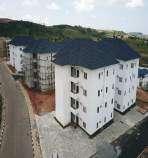
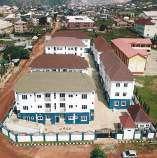
procedure remains constant. Speaking on this, Vice Admiral Ogalla said: “The procedure of arrest of vessels that are found culpable is very clear. When a vessel is arrested, the arresting agency which is the Nigerian Navy will carry out a preliminary investigation after which the case will be established.
“If it is established, by the Nigerian Navy Act, we don’t have the power of prosecution and we determine the adequate agency to carry out the prosecution and in some cases it could be EFCC, Civil Defense or Police but why we have those kind of issues is when we arrest a vessel and hand it over to EFCC after determining there is a case, in most cases, EFCC will request that the navy keep custody of that vessel because among all these agencies, none of them have the facility to keep a large vessel and maintain the security of that vessel.
“So the navy is usually asked to keep the vessel while they carry out their investigation. Sometimes, it can take up to five years to conclude and through out this period, Navy has handed it over to EFCC in the book but on ground, it’s still in Navy’s custody. The navy doesn’t have power to release a vessel except the case has been concluded or the EFCC directs the Navy to release it. The particular case in contention recently is still pending with the EFCC, the Navy has not released any vessel.”
As against the need for special Maritime courts to try such cases and speed up dispensation of justice, Vice Admiral Ogalla would rather the Navy is given prosecutorial powers so that they can alongside other prosecutors try offenders at the Admiralty Court.
The Nigerian Navy has made progress in many areas, especially in the area of piracy as it has maintained its zero piracy status in the International Maritime Bureau piracy rating. According to Ogalla, this is in line with its TOTAL SPECTRUM MARITIME STRATEGY, which has seen the NN continue to support land operations in all the Geo-political Zones and provide all year-round situation awareness of Nigeria’s maritime domain extending to the limits of the Exclusive Economic Zone through its Maritime Domain Awareness Facilities which enabled early detection and swift response to incidences within the maritime environment.
Under Vice Admiral Ogalla, the navy has sustained its dominance in the Gulf of Guinea (GoG). Speaking on this he said: “If we look at the Gulf of Guinea, Nigeria Navy remains the most dominant. We are not seeing our maritime area of interest as just Nigerian territorial waters, we see Gulf of Guinea as one of our areas of interest because it is a strategic shipping route that has a direct effect on our country.
“So we have mechanism where we coordinate with all the countries in the GoG through our Yaounde Architecture. We are practically working with all the GoG countries to address insecurity there and even the European Union, they also have interest in the GoG, so we are also working with them. We have various MOUs which enables us to get information and even arrest any vessel from other countries. The recent arrest we made was a vessel that escaped from Gabon. Those are the mechanisms and it’s working very well. Every coastal nation knows maritime crimes are transnational.”
FLEET RECAPITALISATION AND BOOST FOR SHIP
BUILDING CAPACITY
Under Vice Admiral Ogalla, the need to look inwards has become sacrosanct.
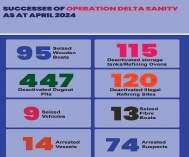
From construction of small boats to big vessels, the Nigerian Navy Dockyard Limited and Naval Shipyard Limited in Lagos and Port Harcourt, respectively, are a beehive of activities given the level of construction and fabrication going on.
For the NN, the goal is to look inwards in producing exactly what they need in patrolling the littorals and backwaters, inadvertently curbing capital flight and fighting maritime crimes at the same time. To this end, the CNS has facilitated the local construction of 2xSeaward Defence Boats (SDB).
In terms of fleet renewal/recapitalisation, the CNS said the NN has taken delivery of various platforms which has supported its Anti-piracy, Ant-COT, Anti-IUU and Anti-illegal drug trafficking among others. Notably, the NN has taken delivery of its second offshore survey vessel, 2 x 32m FPBs, and 2 x Helicopters (NNS CHALAWA P196- Seaward Defence Boat; NNS ZUR P195 ,- Seaward Defence Boat; and NNS OCHUZOR survey vessel), which were commissioned during the commemoration of the Nigerian Navy’s 68 anniversary in June. Also, the NN is also expected to take delivery of 2 x 76m OPVs from Turkey later in the year.
Reiterating the need for acquisitions, Vice Admiral Ogalla said: “We are a navy and we have responsibilities. As a navy, we require capital ships to be able to patrol our seas, we require the smaller vessels to carry out our patrols. The Nigerian Navy today is the fourth largest in Africa. We have over 50 capital ships but if you know the longevity of the task, if you look at our maritime space, about 84,000 multiple miles, it’s about 1/3 of Nigeria’s land mass and that doesn’t include internal waters.
“We have about 3,000 lakes and rivers in the country and when you look at all we need to secure these space, you will realise that what we have is just a tip of the iceberg. However, we must appreciate this administration for listening to our needs and acquiring these vessels. We launched three ships, three helicopters and the patrol that can take the ship two weeks to cover, the helicopter can do it within 30 minutes. We are also looking at how to equip those helicopters for attacks. We still need more equipment.
“For us to be survive as a nation, the issue of local capacity development is key and the navy has taken that as a priority. The Nigerian Navy Dockyard was established in the 90s and since then, we have been making efforts to go into ship building and in the last 15 years, we have made success. We have built three ships from the dockyard. Last year, we commissioned the construction of another two which started this year. The aim is for us to be able to localise our ship acquisition and before I leave office, we should be able to make sure that whatever we are acquiring in terms of ships will include 50 per cent of locally made ones.”
Shedding light on the deployment of the vessels and platforms, the chief said: “In terms of acquisition, the three vessels we launched are just part of the so many vessels we are expecting. We are constructing two and we are expecting two more vessels from Turkey, three from China among others. No matter what we have, it’s still not enough. If you look at the Nigerian Navy Act, we have our military roles from the maritime domain, we have our policing roles in the maritime domain, we provide aids to civil authorities, etc, these are roles captured in the constitution so the navy cannot be limited.
“This is why our maritime strategy which we call the Total Spectrum Maritime Strategy
defines our operations in five spectrums starting from spectrum 1 which is Exclusive Economic Zone, now we have Extended Continental Shelf up to the high seas. The next one is our territorial waters, the internal waters and within that, we have the land domain which covers every part of Nigeria and everywhere the military is required to provide civil aid and that’s why we are deployed in almost every state of the federation and it is inline with our statutory rule.”
Known as a Silent Welfarist, Vice Admiral Ogalla has continuously released welfare packages to personnel, whether of the officer cadre or non-commissioned officers. But beyond monetary support, the chief has invested heavily in real estate to provide one of the most basic need of man-Shelter.
Speaking on the prospect in terms of welfare for personnel, he said: “If you look at our economy, the most important aspect of production is the human resource and the navy cannot do well if the personnel are not motivated. When I talk about motivation, it’s not just about money but providing an enabling environment for them to work and have sense of belonging.
“We are also making sure that they know that the navy will also be there when they retire. It is for us to make sure that system works properly. Every personnel is entitled to free medical services, housing, pension and since I took over, we have taken it to the next level.
“In Abuja, we have over 50 units of three bedrooms; 128 units of two bedroom in Galadimawa, and in Asokoro we have over 120 two bedroom accommodation almost completed and in addition, we are carrying out similar projects in Lagos, PH and Calabar. The problem with accommodation is you won’t see the result immediately because it takes time.
“In terms of medicals, every request for medical evacuation or treatment including those that are not covered by NHS have been treated. In terms of education, we have welfare schools and those that have children there among us pay 20 per cent of what civilians pay because the navy subsidised their payment. These are some of the things we are doing. We also have staff cars for some of our officers and we appreciate Mr. President, Bola Ahmed Tinubu for providing for us.”
On Saturday, June 1, 2024, Vice Admiral Ogalla launched the “International Maritime Institute of Nigeria (IMION)”, a proposed confluence for international maritime discourse and the vehicle for articulating maritime strategy on the African Continent.
According to the Director of Information, Commodore Aiwuyor Adams-Aliu, the IMION led by Rear Admiral TC Udofia (rtd) is poised to become the platform/think-tank for maritime strategic thinkers, practitioners, and allies to interact, share ideas, and research into maritime strategic affairs affecting the Gulf of Guinea (GoG) & beyond as it would focus on discourse of thematic areas such as maritime & ocean governance, maritime security, law enforcement, hydrography, blue economy, climate change amongst others.
Aware of the need to collaborate with other maritime security agencies such as NIMASA, NPA, NDLEA, NOSDRA, NEMA as well as foreign partners, the NN has staged and participated in several local and international exercises and operations. Some of these include EX CROCODILE LIFT/AFRICAN GRANDE AFRICA NEMO, EX SEA GUARDIAN, EX NCHEKWA OSHIMIRI, OP WATER GUARD, OP SWIFT RESPONSE and EX OBANGAME EXPRESS 2024.
In fact, during the recent anniversary of the NN, the CNS hosted a meeting of Chiefs of Naval Staff/CoastGuards of Gulf of Guinea Region (CGG-GGC) to discuss the modalities of the Combined Maritime Task Force (CMTF).
ifeyinwa Uwefoh
The vast ocean of global investment holds immense opportunity, but hidden risks lurk beneath the surface. Unpredictable challenges can quickly turn ambition into uncertainty. This is where a skilled private banker becomes your indispensable guide.
As a High-Net-Worth Individual (HNWI) or Ultra-High-Net-Worth Individual (UHNI), you deserve more than generic solutions. You deserve a trusted advisor who can navigate the complexities of global investing with clarity and purpose. Here’s how private banking empowers you to do just that.
1. Beyond traditional banking
Building a lasting legacy demands a sophisticated approach. HNWIs and UHNIs have unique financial needs beyond the scope of traditional banking. Private bankers, with their expertise in tailored wealth management strategies, can help unlock your full financial potential and ensure your legacy endures.
2. Wealth Management solutions for multi-generational demands
The traditional approach to wealth management is being challenged by a new generation of affluent investors. These HNWIs and UHNIs are tech-savvy individuals who demand seamless digital tools to manage their wealth. They also have investment philosophies different from the generation before them – a higher risk tolerance and actively seeking out audacious investment opportunities. Coronation Merchant Bank understands these unique goals and is poised to bridge the gap between their ambition and financial expertise.
3. Private Banking goes local
Previously, international institutions dominated the Nigerian private banking landscape. Many

(*NAFEM -Nigerian Autonomous Foreign Exchange Market) Table 1: USD/Naira Exchange Rate. December 2022- March 2024
Nigerian HNWIs and UHNIs relied solely on global banks for their wealth management needs. However, the landscape is changing. Renowned Nigerian institutions have stepped up to offer solutions tailored specifically for you.
Private banking seamlessly integrates banking, investments, and lifestyle services into a single, user-friendly digital platform. This strategic combination allows clients to efficiently manage their finances, anytime, anywhere.
Taking this a step further, Coronation goes beyond financial services and offers a holistic
lifestyle experience. This includes exclusive events like our Art Gallery Event, a unique space to connect with fellow art enthusiasts while experiencing Coronation’s commitment to your passions. Now, let us delve deeper. What sets private banking apart from traditional wealth management?
1. What uniquely sets Private Banking apart?
It’s the combination of a holistic approach and advanced technology. These institutions take a comprehensive approach, building a deep
understanding of each client’s unique needs and financial strength. Through advanced technology, they analyze client data, focusing on preferences. For example, Artificial Intelligence (AI) algorithms can constantly monitor market trends and make data-driven adjustments to your investment portfolio. Your private banker could leverage this information to proactively discuss strategies to mitigate risks and capitalize on promising opportunities.
2. The power of secure investments
The reward for such proactive risk mitigation is not only financial returns. For instance, the complexities of navigating a volatile market like the Foreign Exchange (FX) Market. Recent fluctuations in the naira’s value have indeed increased focus on this area. By mitigating these risks and capitalizing on potential opportunities, you can invest with confidence.
A private banker is your best ally in this instance. They have access to a wealth of data and resources, providing you with insights to make informed investment decisions. Even in fluctuating markets (as shown in the table below), they can help you determine the optimal time to buy and sell, maximizing potential returns or minimizing losses.
What is the Coronation Advantage?
Coronation Merchant Bank offers private banking solutions for HNWIs or UHNIs, whether you’re based in Nigeria or abroad. We leverage global and local expertise to deliver solutions for growing, preserving, and transferring wealth. This includes investment options, asset management, estate planning, and even specialized financing. By focusing on the future and building strong relationships, private bankers ensure their clients’ unique needs are met.
•Ifeyinwa Uwefoh is Group Head, Private Banking
The federal government has established an advisory board on Malaria Elimination in Nigeria and the Ministerial Task Force on Malaria Elimination in Nigeria
The Coordinating Minister of Health and Social Welfare, Prof. Ali Pate while inaugurating the advisory board and ministerial taskforce, described it as a significant step to accelerate progress at malaria elimination
He explained that malaria poses a significant burden on Nigeria in terms of mortality, morbidity, lost work hours, out-of-pocket expenses, and government investments in treatments and interventions.
In a statement by his Special
The Edo State Governor, Mr. Godwin Obaseki, has said the state’s employment process under his leadership is the fairest and most inclusive in the country, noting that the state has so far given automatic employment to over 50 first-class graduates of Edo extraction.
Assistant on Media and External Relations, Tashikalmah Hallah, the Minister emphasised that despite being preventable and treatable, malaria continues to be a major challenge for the country.
He said: “Therefore, we need a
paradigm shift from the standard approach to a more proactive and result-oriented method of defeating this disease.
Obaseki spoke to journalists after the end of a five-day on-boarding programme for 25 first-class graduates from various ministries in the state’s civil and public service.
The umbrella body of Ijaw youths worldwide, the Ijaw Youth Council (IYC) has decried the alleged continued political alienation, deprivation and underdevelopment of the Ijaw in Edo State.
While demanding actions to correct what they described as ‘anomalies’, the IYC in a statement signed by its spokesman, Binebia Princewill, said it was shocking that successive Edo state governors have governed the state as though the Ijaw do not exist. The statement highlighted that while the Ijaw are equal stakeholders in the state, the people are both culturally, politically, socially and economically viable and therefore deserve equal opportunities like
At the the programme which held at the John Odigie-Oyegun Public Service Academy (JOOPSA), in Benin City, he said his administration was building a very attractive service for workers in the State.
The governor, represented by the State’s Head of Service (HOS), Dr. Anthony Okungbowa, said the automatic employment for first-class graduates was one of the innovations brought by the Obaseki-led state government to encourage and get the best hands to drive development and growth in the State.
the on-boarding programme, they should be better workers.
He said; “The on-boarding of about 22 of them has been on for the last five days and today is the last and final day. At the end of
other ethnic nationalities in the state
Among the demands of the IYC is that Obaseki should urgently give staff of office to the five traditional rulers in the Ijaw Kingdoms in the state before the governorship election.
“Let us sound this clear again and again that the Ijaw in Edo state are not living in a foreign land, they are living in their ancestral land and no one should try to falsify their history by trying to annex any part of their lands. Our people must be treated fairly in Edo state with dignity and honour going forward.
“Our people have suffered too much political deprivation, suppression, manipulation, oppression, strangulation and alienation in their own land. Since the creation of Edo state till date, the level of development
in the Ijaw areas have been nothing to write home about. The IYC will not allow this injustice to fester forever.
“ The continued subjugation of our people and kingdoms by not giving staff of office to Ijaw kings in Edo State is something that is capable of causing disharmony and chaos. We don’t know how we will continue to endure this calculated arrangement geared towards undermining the autonomy of the Ijaw in Edo state,” the group said.
The youth body equally called to the tovernor of to swiftly partner with relevant agencies for the com- mencement of the Udo-Ofunama road project to connect the rural Ijaw areas to the urban areas and see to the realisation of the Gelegele-Gbene Seaport.
“They have also undergone the graduate development programme. The programme is run in a distinct manner and they are sent to high- class establishments to learn so that they can have opportunities to learn and benefit from the system.
“This is a huge programme designed by the Governor of Edo State for these first-class graduates as they are the future of the service and we are enabling them to play the roles now and in the future.
“We have attracted them to the State and ensured that the focus is on the capability of these people. The focus is on what you know, not who you know as the employment process is the fairest and most inclusive in Nigeria.
“We are building a future that will be very attractive, and a productive service; a service that is able to support the political class to enable them to deliver the dividends of democracy to Edo people.”
The governor added that this session the state was on-boarding 25 first-class graduates into the service as a result of their hard work and dedication.
He said this is the only ingredi- ent that will sustain them in the service, saying that the state has more than 50 now in the service and it’s a continuous process.
“On this premise, we invited academics, malaria programme experts, development partners, private sectors, civil societies, business enthusiasts, policymakers as well as the political class to a roundtable discussion to rethink the country’s approaches and strategic views on malaria, which culminated to the setting up of the Advisory for Malaria Elimination in Nigeria (AMEN), among other things agendas, and the Ministerial Task Force on Malaria in Nigeria”.
The Advisory on Malaria Elimination in Nigeria (AMEN) is chaired by Emeritus Prof. Rose Leke of University of Yaoundé, Cameroun.. Other members include: Prof.
Pate said that the team will offer evidence-based advisory services and meet regularly to review programme evidence and provide guidance on aligning with best practices for malaria elimination.
He said that they will also review implementation when necessary, adding that they will meet every six months.
Pate further said that the Ministerial Task Force will consist of stakeholders from various sectors who have extensive knowledge of malaria implementation in Nigeria and are based in the country.
tony icheku in Owerri
The Imo State government yesterday handed over an electronically-powered tollgate at the Sam Mbakwe International Cargo Airport, Owerri to the authorities of the Federal Airport Authority of Nigeria (FAAN).
Imo State Governor Hope
Uzodimma who performed the ceremony explained that the facility will enable the FAAN operatives provide quality service to Imo people who patronise the airport in particular, and their Nigerians counterparts, in general.
Preforming the brief ceremony, Uzodimma noted that the facility was provided by the state government to, not only beautify the airport and it’s ambience, but to enable traffic
management into and out of the airport. He said it will also be an encouragement to FAAN to be able to provide quality service to the people. He acknowledged that the road to the airport had earlier been commissioned by President Bola Tinubu in his last visit to Imo State when the digital facility was in the process of installation Earlier, the airport manager, Mrs Nkechi Ihekwuaba had welcomed the governor and his entourage for finding time to formally hand over the facility to the agency She used the opportunity to thank Uzodimma for providing the beautiful structure and requested him to approve that FAAN goes ahead to start the use of the tollgate.”
Photo
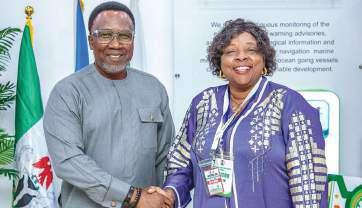
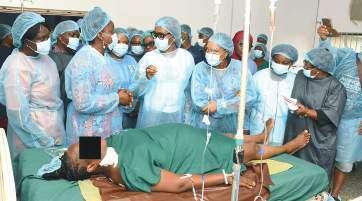




Unless Nigeria ends crude oil theft and assets’ vandalism in the Niger Delta, the country’s economy will continue to wobble, at least in the short to medium term, writes Emmanuel Addeh.
The twin problems of oil theft and pipeline vandalism are not new to Nigeria. Indeed, like in a handful of other crude oil-producing nations worldwide, the multi-decade economic menace is almost as old as the global economy itself.
But what appears new in Nigeria’s case in recent times, is the high-level, unbridled and mindless pillaging of the nation’s commonwealth and the lack of capacity of the Nigerian state to contain the menace which is nearly bringing the nation’s economy to its knees.
The energy transition effect apart, Nigeria is almost becoming a no-go investment destination for investors in the sector. The ones that have operated in the country for over five decades are either leaving or moving their operations into the deep offshore. This move is meant to avoid the headache of dealing with illegal oil bunkering and incessant destruction of pipelines as well as other assets.
Shell has announced plans to sell its Nigerian onshore subsidiary, Shell Petroleum Development Company of Nigeria (SPDC) to Renaissance Consortium; Equinor has exited; Italian energy giant, Eni is selling its Nigerian subsidiary, Nigerian Agip Oil Company, to Oando and ExxonMobiI is selling to Seplat Energies.
Some of the bold indigenous oil firms that have decided to throw their hat in the ring by making huge investment in the oil and gas sector are struggling. Aiteo, one of the country’s biggest E&P indigenous firms as recently as last week temporarily shut down its operations after a breach on one of its assets in Bayelsa.
From the production of over 2 million barrels per day in 2019, the country is struggling to raise output to 1.3 million bpd. In fact, that figure is seen as a massive improvement, given that in the last quarter of 2022, production fell to as low as 900,000 bpd.
Following the unprecedented outcry by some of Nigeria’s most reticent public figures, including businessman, Tony Elumelu and even the clergy led by the General Overseer of the Redeemed Christian church, Enoch Adeboye, at the time, the federal government adopted a model of reverting to its once despised Niger Delta militants led by Government Ekpemupolo, otherwise known as Tompolo.
Aside spending about N50 billion yearly on just one of the local security contractors, there is also the Joint Task Force (JTF), Operation Delta Safe, comprising all the armed forces, down to even the federal road safety corps recruited to tackle the problem. Then there is the Nigerian Navy’s “Operation Delta Sanity,” launched for increased maritime surveillance.
But even those security architectures have not markedly borne results. Admittedly, there has been some improvement, but it’s been painfully slow, with its attendant cost to the nation’s economy.
Historically, Nigeria has always deployed proceeds from the sale of oil as a buffer to economic shocks like it is currently having from the ongoing reforms embarked upon by the Bola Tinubu administration. Things are different now. The nation has become a massive borrower, both internally and externally. Nigeria in recent times, has resorted to borrowing to augment the little inflow of foreign exchange into the country’s FX market, first taking foreign loans of $1.71 billion to boost FX into the country in the first nine months of 2023.
In August last year, Nigeria’s state-oil firm, announced that it had secured a $3.3 billion crude oil repayment loan from Cairo-based Afrexim Bank that will support the government’s reforms to stabilise the exchange rate market.
A THISDAY’s recent estimation of losses to oil theft and pipeline vandalism in the first five months of 2024, showed that the country may have lost as much as $3.57 billion to the menace during the period. This is given an estimated average Brent crude oil price per barrel of $85 in 2024 so far.
The Nigerian economy is haemorrhaging, the oil thieves are having a field day and the authorities appear to be helpless if not hopeless in dealing with the situation.
Whereas the oil quota allocated to Nigeria by the Organisation of Petroleum Exporting Countries (OPEC) in 2024 is 1.58 million bpd, with a federal budget benchmark of 1.78 million bpd, Nigeria is still far from meeting this target. The situation has, as expected, disrupted budgetary expectations.
To underscore how critical crude oil is to the Nigerian economy, the commodity constitutes up to 80 per cent of Nigeria’s foreign exchange earnings

and almost 70 per cent of its yearly budget. This is why the federal government working with the sub-national governments need to tackle the problem head-on.
The losses have been unprecedented. The National Security Adviser (NSA), Nuhu Ribadu, stated recently stated that the country lost 400,000bpd to theft. Aside Ribadu, a former Minister of State for Petroleum Resources, Timipre Sylva, said Nigeria lost at least 700,000bpd to the thieves in 2022, not in any way comparable to other oil-producing countries plagued by oil theft like Venezuela, Iraq, Mexico, and Malaysia.
In October last year, the Nigerian Senate revealed that the country lost N2.3 trillion to crude oil theft during the year.
Last week, the Nigerian National Petroleum Company Limited (NNPC) reported a staggering 400 incidents of crude oil theft, with the bulk of them occurring in the Western region of Rivers and Bayelsa states. In 2022, the NNPC stated that it lost $700 million every month to oil theft. The Nigerian Extractive Industries Transparency Initiative (NEITI) has revealed that Nigeria lost 619.7 million barrels, valued at N16.3 trillion, to crude oil theft from 2005 to 2021.
Besides, in 2023, the NNPC spent N136 billion on security, repairs, and maintenance of vandalised infrastructure, according to Dataphyte.
On June 18, THISDAY carried out a review of the latest information from the NUPRC, indicating that going by the 1.58 million bpd OPEC quota, in the first five months of this year, the country was supposed to produce 240 million barrels. However, the data showed that Nigeria only managed to drill a volume of about 198 million barrels of crude oil, leaving a deficit of about 42 million barrels of OPEC-sanctioned production during the period.
A vast portion of the over 5,000 kilometres of oil pipelines is non-functional due to vandalism, according to the NNPC Group Chief Executive Officer, Mele Kyari. Furthermore, it is believed
that operators spend almost 50 per cent of their oil revenue in defraying the cost of production.
A huge part of this cost goes into security of their oil assets.
In September last year, Speaker of the House of Representatives, said Nigeria lost about $46 billion to crude oil theft in 11 years, a development that drastically hampered the growth of the country’s oil production, with Nigeria losing up to 30 percent of daily production.
Beyond the oil usual suspects, the recent development of massive connivance from local security contractors has become a matter of concern for operators. To buttress this, an oil surveillance operation last week smashed a huge illegal bunkering camp in Bayelsa, Niger Delta, with certain entities, including one of the pipelines security subcontractors to Aiteo Eastern Exploration and Production Company (AEEPCO), an indigenous oil exploration company, fingered in the incident.
Identity cards found on the sites by one of the major pipeline surveillance firms in the Niger Delta recently contracted by the NNPC, showed that the materials belonged to the oil pipeline subcontractors who were hired to watch over major assets.
Specifically, the operation which took place during the early hours of Sunday, June 23, led the surveillance security operatives to conduct patrols in the Okoroba axis of the Nembe local government area of the state. Their mission led them towards the Elemuama area.
When the operatives moved to dismantle the illegal operation site, sources with knowledge of the incident said they uncovered startling evidence implicating one of the subcontractors in massive oil theft in the area.
The identity cards of the employees of the surveillance firm discovered on-site and other incriminating evidence have now raised several questions about the complicity of the company and its owner’s involvement in illicit oil bunkering activities in the region.
Also revealed during the raid were two additional
unauthorised bunkering camps nearby, wherein the surveillance team seized and subsequently destroyed two large boats loaded with crude oil and a fibre boat.
Fingered was one Livingston whose operations spread across Bayelsa State, specifically in the creeks of Nembe-Brass. He is said to own several illegal bunkering camps and controls a vast transportation network that transports illegal refined petroleum products to various parts of the state.
But Livingston, though a surveillance subcontractor is also said to be the coordinator of all illegal bunkering groups that that had been complicit in vandalising the facilities of the company.
A source stated that many oil thieves suspects had been treated with kid gloves for a long time and that if the culprits are not arrested and prosecuted to serve as a deterrent to others, illegal bunkering may continue in the area.
In addition, one other suspect popularly known as “Organiser,” who is said to be orchestrating a sophisticated network that recruits and transports individuals to carry out the destructive activities, also has his illegal activities at Nembe and Brass locations.
“His continued evasion of justice underscores the need for stringent measures to halt systematic economic sabotage in the region.
“This collaboration has significantly impeded efforts to address and resolve the nation’s oil theft crisis. To safeguard the region from further environmental and economic harm, it is imperative to bring these figures to book, ” a source said. He queried how the environment can be saved from the illegal bunkering activities when people like Livingston are stealing, destroying and selling oil companies’ facilities and products in the area.
“They should be arrested and prosecuted to serve as deterrent to others. His ways of operations are to recruit boys in cutting pipes and transporting them for sale through a well organised sophisticated dark transport network.
“People like ‘Organiser’ should not be allowed to vandalise oil facilities continuously but should be brought to book to free our society of a systematic economic sabotage,” the person with the knowledge of the activities in the location stressed.
In the past week, the NNPC reported a staggering 400 incidents. Most of the incidents had to do with unauthorised pipeline connections, vandalism, oil spills, and unlicensed storage sites.
“Measures such as the complete confiscation of assets and freezing all accounts using Bank Verification Numbers (BVNs) will be a highly effective course of action by the Economic and Financial Crimes Commission (EFCC) and relevant bodies as Nigeria seeks to combat oil theft. We must ask the EFCC what steps they are taking to address this situation,” the concerned source stated.
Some of the worst-hit oil companies have recently begun the transportation of their crude through significant arteries like the Nembe Creek Trunk Line (NCTL). But the disruptions not only lead to production downtime and loss of crude oil, but result in additional expenses in facility repairs.
The perpetrators of these monumental heists are seldom made to face the full wrath of the law. As far back as 2014, Chatham House in a document described the situation as one “on an industrial scale,” accusing “politicians, military officers, militants, oil industry personnel, oil traders and communities” of complicity.
As rampant as cases of oil theft and pipeline vandalism are, there is hardly much publicity about any thoroughly prosecuted cases, leading to jail terms for offenders.
As it seems, neither the local security contractors nor the military has been able to win the fight against oil theft, thereby requiring a different approach from the authorities beyond the raids and destruction of crude oil and equipment used in harvesting it. The strategy has not worked in over a decade.
Many Nigerians, including the NNPC, have called for special courts to handle and quickly dispatch cases of oil theft. This call has not been heeded by the authorities.
With Nigeria’s growing debt, the president must ensure that oil thieves are punished in accordance with the law, not minding who is shielding them. Rather than what seems like slap on the wrist in the cases of the few that are caught. Whichever way one looks at it, what is obvious is that the government is not doing enough to end these huge economic crimes.

Emmanuel Addeh in Abuja
Electricity Distribution Companies (Discos) in Nigeria made additional revenue of N42.4 billion after the Nigerian Electricity Regulatory Commission (NERC) approved a hike in tariff for Band ‘A’ customers on April 3, new data from the commission has shown.
A THISDAY analysis of NERC data showed that this was about 42.29 per cent increase compared to the previous month of March before the tariff increase was effected.
The increment had seen a rise in tariff from less than N70 to N225 for kilowatt hour for the premium customers.
The NERC data indicated that in March, total revenue by the Discos was N100.44 billion, but rose considerably to N142.92 billion in April 2024 after the increase approved
Olawale Ajimotokan in Abuja
In a bid to curb the menace of ghost workers, the Office of the Head of Civil Service of the Federation (OHCSF), has held an Integrated Personnel Payroll Information System - Human Resource (IPPIS-HR), sensitisation programme for officers on grade levels 12 and above from 40 selected non-core Ministries, extra-ministerial Departments and Agencies (MDAs).
The programmme under the Fiscal Governance and Institutions’

by NERC.
The power industry regulator had said that the Band ‘A’ customers which account for about 15 per cent of the 12 million electricity consumers in the nation, that is about 2 million Nigerians, were impacted by the increase in price that Nigerians pay per kilowatt.
It stated that 800 feeders were categorised as Band A at the time, stressing that upon review of the feeders’ performance, the commission had reduced it to under 500.
According to the latest NERC data, there was also a marginal rise of 0.29 per cent in collection efficiency after a total of N178.72 billion billing were sent out by the 12 power distributors, while collection efficiency was 79.97 per cent, a rise of 0.61 per cent compared to the previous month.
During the month, total energy
Project (FGIP), World Bank Assisted, was declared open by the Head of the Civil Service of the Federation (HoSF), Dr Folasade Yemi-Esan.
Represented by the Permanent Secretary, Service Policies and Strategies Office (SPSO), Dr. Deborah Odoh, the HoSF disclosed that at inception, the implementation of IPPIS focused mainly on payroll not the HR component, given government’s desire to block financial leakages in personnel cost occasioned by
received by the Discos was 2,251.22Gwh while total energy billed was 1,843.08Gwh, leading to a total billing efficiency of 81.87 per cent, a 2.56 per cent increase compared to March.
NERC listed the top three revenue collectors as Ikeja Electric with N29.4 billion, Eko Disco with N24.93 billion and Abuja Disco with N22.92 billion.
The least performing Discos in terms of revenue aside the new Aba Disco, which had a collection efficiency of 73.12 per cent at (N1.41 billion), were Yola Disco (N1.10 billion), Kaduna (N5.01 billion) and Jos (N6.05 billion).
Also, revenue recovery performance was 55.82 per cent; a 12.12 per cent decrease put side by side the figures from March.
NERC recent stated that the newly approved electricity tariff was anticipated to cut down the
the infiltration of ghost workers into the service.
She decried that this created a gap leading to series of implementation issues.
“The Office of the Head of the Civil Service of the Federation commenced activities towards the implementation of the Human Resource (HR) module of IPPIS to bridge some of the identified gaps,” she said.
She noted that the HR component of IPPIS was one the six major priority areas of

subsidy for the fiscal year 2024 by approximately N1.14 trillion.
Vice Chairman of NERC, Mr. Musliu Oseni, said: ”With the newly approved tariffs, subsidies for the 2024 fiscal year are expected to reduce by about NGN1.14 trillion in furtherance of the federal government’s realignment of the subsidy regime while largely protecting vulnerable customers and fostering investments targeted at providing efficient service delivery in the Nigerian Electricity Supply Industry (NESI).
”The overarching objective of the commission in the consideration of the tariff application is the creation of a financially sustainable electricity market providing adequate and reliable power supply to drive the Nigerian economy.”
With the rise in collection, the Discos are expected to rake in more
the Federal Civil Service Strategy and Implementation Plan 20212025 (FCSSIP-25) and urged the strengthening the implementation of the IPPIS-HR in the selected 40 MDAs, as a matter of national importance.
The HoSF tasked the participants to transmit the outcome of the session to their respective MDAs to ensure the institutionalisation of an IPPIS-HR that is reliable, credible and free from corrupted HR data.
Dr Yemi-Esan acknowledged
than the N3.2 trillion which they recorded between 2020 and 2023.
Historical data from the National Bureau of Statistics (NBS), recently showed that in 2020, the total revenue made by the Discos was N526.77 billion, while in 2021, it rose to N761.17 billion.
Similarly, in 2022, the power distributors raked in about N828 billion, more than rounding the figure off in the 12 months of 2023, with N1.1 trillion as revenue.
The Nigerian power sector also recorded a significant revenue boost in the first quarter of 2024, with the 12 Discos generating a total of N291.62 billion.
The figure represented a 17.91 per cent increase compared to the N247.33 billion recorded in the same period last year.
With the considerable rise in revenue, the Discos are expected
the support received from the World Bank, under the FGIP, towards ensuring the successful implementation of IPPIS..
In his remarks, the Permanent Secretary, Career Management (CMO), OHCSF, Mr Adeleye Adeoye, represented by the Consultant on IPPIS, Mrs Anne Atta, urged non-core MDAs to be resolute in the implementation of the Module, noting the implementation of IPPIS-HR in MDAs seeks to achieve the overall objectives of the scheme aimed

to plough back part into building the much-needed investment in infrastructure.
The electricity distributors have in the past been accused of underinvesting in infrastructure to boost power supply to over 200 million Nigerians, who currently depend more on self-generated power for their homes and businesses, instead of the national grid. Some experts have opined that the Discos remain the weakest link in the electricity distribution value chain, with just a peak capacity to distribute 5,500mw at a time, while the Generation Companies (Gencos) can generate 13,000mw and the Transmission Company of Nigeria (TCN) has the capacity to wheel 8,000mw at any point.
at improving the effectiveness and efficiency of the storage of personnel records and attaining transparency, accuracy, safety and reliability in the management of records.
He, however, lamented that despite its introduction, since 2013, many public servants were apathetic of its existence and could not differentiate between the various components of IPPIS.

The Centre for the Promotion of Private Enterprise [CPPE] has tasked the federal government on the need to arrest the deindustrialization of Nigerian
economy by ensuring that local industries are protected from liberal trade policies.
In a statement, the CPPE commended the federal government’s application of fiscal policy measures to boost productivity of the Nigerian
Emmanuel Addeh in abuja
Minister of Housing and Urban Development, Ahmed Dangiwa, has declared that under the ongoing Renewed Hope Estates nationwide, the federal government would not tolerate abandoned work.
He also warned that any contractor that collects government’s money for housing project must do the work, emphasising that the ministry was desperate to give Nigerians value for money.
Dangiwa spoke in Warri, Delta State, during the foundation laying of 250 Renewed Hope Housing Estate, for the State.
Delta State is the ninth state in the series so far to have the groudbreaking among the 13 states scheduled under phase one of the renewed hope housing project, across the nation.
The 13 states under phase one based on available land provided are; Kano, Katsina, Sokoto (north- west);
Gombe and Yobe (north-east); Ebonyi and Abia (south- east), Akwa-Ibom and Delta (south-south); Osun and Oyo (south-west) and Benue and Nassarawa (north-central)
Dangiwa described the housing construction as a key component towards stimulating inclusive growth and helping to attain President Bola Tinubu’s mission of lifting 100 million Nigerians out of poverty.
Delta State Governor, Rt Hon (Elder) Sheriff Oborevwori was represented at the groundbreaking event by his Deputy, Monday Onyeme, said: “Delta state is happy to partner with the federal government through the Federal Ministry of Housing and Urban Development in the Renewed Hope Housing Programme”.
The governor also disclosed that the state government had granted waiver on certificate of occupancy and payment of ground rent in order to enhance affordability of the houses to the citizens.
Stories by Dike Onwuamaeze
President Bola Ahmed Tinubu has approved the immediate rollout of the National Construction and Household Support Programme that would strengthen the economy by creating opportunities in the real sectors of agriculture, manufacturing, and construction.
The NCHSP, which was announced last week by the Speacial Adviser to the President on Media and Publicity, Mr. Ajuri Ngelale, would prioritise the construction of the SokotoBadagry Highway, which would traverse Sokoto, Kebbi, Niger, Kwara, Oyo, Ogun, and Lagos States.
According to Ngelale, the Sokoto-Badagry Road project is specially prioritised for its
importance as some of the states it would traverse are strategic to the agricultural sustainability of the nation.
He said that within the SokotoBadagry Highway corridor, there are 216 agricultural communities, 58 large and medium dams spread across six states, seven Special Agro-Industrial Processing Zones (SAPZs), 156 local government areas, 39 commercial cities and towns, and over 1 million hectares of arable land.
Tinubu said: “While emphasising the urgency of boosting food production, the President noted that the Sokoto-Badagry Highway is a pivotal project as the states within this axis form the food belt of the nation, and with Badagry being an important artery for food export.”
pharmaceutical manufacturing industries.
The Chief Executive Officer of CPPE, Dr. Muda Yusuf, who argued in the press statement that the country’s economy could not afford to submit to a regime of complete trade liberalisation in the light of the challenges faced by domestic manufacturers.
Yusuf said: “Fiscal policy measures have proven to be more impactful on real sector performance than monetary policy.
“The real sector of the economy
deserves to be effectively protected and incentivised to improve production and ensure sustainability investments in that space. The Nigeria economy cannot afford to submit to a regime of complete trade liberalisation in the light of the challenges faced by domestic manufacturers.
“We need to stem the tide of deindustrialisation of the Nigerian economy, the exit of foreign direct investors and the rising mortality rate of domestic industries. We believe that stepping up fiscal
policy interventions would facilitate the realisation of this objective.
But we must be ready to trade off some revenue in the short term.
“The economy would be better off in the medium to long term, with regard to the growth in domestic production, less import dependence, heightened prospects of disinflation, higher job creation and better economic resilience, “he said.
According to him, “the recent Executive Order removing import duties, VAT, excise duty
on pharmaceutical raw materials, intermediate products, medical diagnostic equipment and machineries,” was a commendable development.
He argued that these fiscal policy measures would boost domestic production of pharmaceutical products, reduce the cost of medications, improve access to healthcare and impact positively on the well-being of citizens, adding that it would also revitalise our pharmaceutical industries and create more jobs.”
Emmanuel Addeh in abuja
The Surveyor General of the Federation, Abuduganiyu Adebomehin, has appealed to the state governors to lift the status of their respective Surveyor General Offices to extra-ministerial offices.
Adebomehin who argued that nothing can be achieved by the states concerning
infrastructural development without the input of surveying professionals, spoke at the 58th annual general meeting of the Nigerian Institution of Surveyors (NIS) in Edo.
According to a statement from the Head of Press and Public Relations, Sani Datti, Adebomehin said the surveying profession is known for precision and accuracy.
In his comments, the President of the NIS Dr. Matthew Ibitoye stated that it has been identified that one of the factors impeding the speedy development of any nation is the inability to identify what and where its resources are.
He said this can be addressed through a comprehensive mapping programme that has yet to receive the attention it deserves from the government, asserting that the best developed countries are the well-mapped countries.
Ibitoye further stated that the government must prioritise the issue as it is fundamental to solving many of the environmental and related problems in the country.
The Olam Agri has spotlighted the enormous potential within the African food value chain that could make the continent a net food exporter.
Head of Olam Agri’s Nigeria Operations, Mr. Anil Nair, disclosed this during the Market Access Africa Conference (MAAC) that was organised last week in Lagos by the African Agri Council (AAC).
Nair emphasised that Africa’s food trade deficit could be offset by improving crop yields across the continent.
He pointed out that despite
Africa’s substantial share of global arable land, the continent’s current crop yield falls below the global average, noting that Africa possesses vast uncultivated lands that could be better utilised.
Nair explained, “Africa has 18 per cent of the world’s arable land and 18 per cent of the world’s population.
“With a total land mass of 3 billion hectares, 253 million hectares are arable, of which 203 million are used for crop production, leaving 50 million hectares available for cultivation as temporary fallow lands and
temporary meadows and pastures.”
He added: “On these 203 million hectares of cropped land, Africa produces approximately 250 million tons of cereals and coarse grains, including Maize (92 million tons), Sorghum (29 million tons), Millet (15 million tons), Rice (39 million tons), Wheat (27 million tons), Barley (6 million tons), and Teff (6 million tons).
“In addition to cereals, Africa grows significant quantities of tubers such as Cassava (208 million tons), Yam (86 million tons), Potato (27 million tons),
and Sweet Potato (29 million tons).”
Nair maintained that Africa should not be a net food importer, citing strong crop varieties but pointed out that low crop yields are among several factors hindering higher agricultural productivity on the continent.
He said: “Africa’s crop yields are significantly lower than the world averages. The average cereal yield in Africa is just 1.6 tons per hectare compared to the global average of 4 tons per hectare, which is 60 per cent less.”
The Nigeria Customs Service (NCS), Kwara state Command has said that it has generated a total sum of over N10 billion revenue to the federal government between January and May, 2024 in the state.
The Custom Area Controller of the Command, Mr. Faith Mathew Ojeifo disclosed this in Ilorin on Thursday on the activities of the command in the state.
The three-legged event also made the Controller to announce the provision of empowerment to the wives and widows of the men
and officers of the command and the donation of relief materials to the Kwara State Government.
According to him, “A comparative review of the preceding year 2023 indicates that the command surpassed what was collected same period last year 2023 with over N2billion which represents 40.41 per cent increment”.
He said that, “Within the period under review, I rejig my operation teams which had led to Twenty One (21) seizures of different prohibited.
“The affected items seized included 507 bags of foreign rice,
one Unit of used vehicles, 1,055 pieces of used tyres and 164 Jeri cans of PMS of 25 liters each (4,100 liters) with the total Duty Paid Value of N35, 416,140,000”.
Ojeifo also used the event to empower the wives and widows of the men and officers of the command with the provision of sewing machines, deep freezers and baking, cosmetics.
He said that, about 67 people have benefitted from this gesture so as to make life more bearable for them in view of the absence of their husbands.
Ojeifo maintained that, “The aim of the empowerment is to keep you busy, self dependent and productive while we are far away from home which will no doubt reduce the burden of always waiting on your husbands.
“This empowerment program is designed to inspire and equip our wives with skills and confidence to reach their full potential, as I believe that empowering women is essential for creating a more equitable and prosperous society” Ojeifo also donated relief materials to the state government so as to take care of those victims of various challenges in the state.
The

The Federal Competition and Consumer Protection Commission (FCCPC) is beaming its search light on the steel manufacturing sub-secton. The commission, through intelligence and surveillance reports, is suspecting that manufacturing of sub-standard iron rods products and other anti-competitive conducts are going on in that sub-sector. These sub-standard products are also believed to be behind the incessant collapse of buildings that have caused loss of many precious lives and properties.
On June 28, the Acting Executive Chairman of FCCPC, Dr. Adamu Abdullahi, lead the commission’s investigators to storm three steel manufacturing firms in Ogun State to investigate an allegation of manufacturing of sub-standard products and other deceptive trade malpractices.
Abdullahi explained that the commission is doing this to protect the interest of consumers out of concern that buildings are collapsing and Nigerians are dying. Therefore, “we are looking for any issue where they are cutting corners.”
The affected companies were African Foundries Limited (AFL), Ogijo, Ogun State; the Monarch Steel Mill Limited, Sagamu, Ogun State and the Kam Steel Integrated Company, Sagamu, Ogun State. These companies were alleged to have been producing 10 mm iron rods and selling them as 12 mm iron rods. Abdullahi, who addressed journalists at the premises of AFL, said: “Essentially, we got intelligence and surveillance reports that these companies in question are allegedly involved in some anti-competitive behaviour. That is the reason we decided to come to these three companies.”
According to him, what has been going on is that some manufacturers would produce 10mm iron rods but label and market same as 12 mm iron rods.
This market behaviour, he said, is among the major causes of building collapse in Nigeria.
“We are talking here about the issue of safety of Nigerians, which is the core essence of consumer protection.
“We have to ensure the safety of our population. What is happening in the building space so far is worrisome to the government and all well-meaning citizens of this country.
“So we have to look at their process to find out if they are cutting corners. If they are doing so, we will apply the full wrath of the law. That is why we are here.”
He added that it is of concern that buildings are collapsing in this country as a result of substandard building material products.
“But we will give you the assurance that we cannot allow people to continue dying.”
He, however, emphasised that the FCCPC

is on a fact finding mission and have not found any of these companies liable yet.
“We are still at information gathering stage. After which we have to go back to our office and allow forensic experts to look at the information that we returned with.
“What they will take out from all the materials we have gathered will then guide our findings,” Abdullahi said.
He also clarified that the activities of the FCCPC are not in conflict with roles of the Standard Organisation of Nigeria (SON) or related to the reasons multinationals are exiting from the Nigerian market
The SON is after standards and the commission collaborates with SON. However, the issues that brought the commission to the factories of the steel manufacturers were largely market related issues.
“What do they do in the market that is right and what do they do that is wrong. We are guided by our Act. We have the rules and we work strictly by it. We go on surveillance exercises. We look at how industries and markets operate.
“If you go into the market to buy a 12mm iron rod for instance and 10mm is sold to you in the pretext that it is 12mm. That is false, misleading and deceptive. It is unfair market practice.
These are the intelligence that we have gotten and we have come to find out whether there is truth in that claim or not,” Abdullahi said.
He stated that wherever a multinational goes it would not escape operating under regulations because there are competition and consumer protection laws in every part of the world.
“We are here to protect competition and consumers in Nigeria. And they know that same applies wherever they may go.
“If you have noticed you will see that immediately we arrived they told us what standard it is they operate on, and that they have The UK’s standard and the SON’s standards. We are going to look at their product based on the standard with which they produce.
“Our job cannot be responsible for people exiting from Nigeria. Compliance is what they do all over the world. In some countries that are major producers, you will find out that the regulators are even harsher than we can ever be in Nigeria.
“It is just a matter of having a strong regulatory regime, which is what we are trying to build in Nigeria. Let us have consequences for bad behavior and people will fall in place and do what
they are supposed to do. Our people will be better for it.
“It is of concern that buildings collapse in this country. It is a result of substandard product. It is a good thing that we find out what those products are and whether they are being produced according to standards.”
Beyond the manufacturers, the FCCPC is also taking on retailers and owners of supermarkets in a bid to checkmate sharp anti-competition activities such as price gouging. Price gouging is the practice of increasing the prices of goods to a level much higher than is considered reasonable or fair.
In furtherance of this objective, the FCCPC held a meeting with the stakeholders and members of the Retailers Council of Nigeria (RCN) and National Association of Supermarket Operators of Nigeria (NASON) and have agreed to set up a technical committee that would produce a Memorandum of Understanding (MoU), which would help to checkmate price gouging and the divergence between the shelve prices of goods and their actual prices at the till.
He illustrated this with what the FCCPC found out in an Abuja based supermarket where the commission took three pieces of kwuli-kwuli that were of the same brand, size and date of manufacture but their prices at the till varied. One was N700, another N900, the third one was N1,100.
Abdullahi said: “What we are worried about is this issue of price gouging. We have held an executive session with the stakeholders and have discussed and understood each other.
“We know most of these things but we believe that we are on the right path because we have agreed to form a technical committee that will draft an MoU and we are going to work hand in hand henceforth to have capacity building among us so that we will understand each other, both from the side of businesses and regulators.
“By the way things are going we have already gotten the understanding of the retailers. They are willing partners and that is what we want.”
He added that the MoU would address the rights of consumers to return malfunctioning goods to the retailers and have them either repaired or replaced.
“We must educate them on what our law says about retail trade and let them abide by the law. This MoU will address these issues we are raising. If the retailers do not know, they would be reminded
that the requirement of the law is to display prices of goods on the shelves that agree with the rate on the till. Otherwise it is false, misleading and deceptive, which is against the law,” Abdullahi said.
In his remarks, a Trustee of RCN/NASON, Mr. Haresh Keswani, who is also the Group Managing Director of Spar Nigeria, thanked the leadership of the FCCPC for the commission’s open mindedness to understand the importance of retail business in Nigeria. Keswani said that the retailers and supermarkets operators are currently struggling to survive the declining purchasing power of Nigerians that have resulted in more than 50 per cent fall in volume of sales.
He added that being compliant in Nigeria is an expensive proposition in terms of paying salaries on time, taxes, power and energy bills and following the rules and regulations.
Keswani said: “The last two years have been frightening for us. What is the intention of the retailers? They want the prices to be lower so that the consumers will afford them and buy more.
“We are not happy with our (current) volume of sales. The volume of goods has gone down by 50 per cent. If we were selling 10,000 creates of non-alcoholic beverages in a year, today the sale is not even up to 5,000.”
He emphasised that there are four major pillars in the distributive trade’s value chain, which are the manufacturers, distributors/ brand representatives, retailers and the consumers, adding that the whole idea of this stakeholders’ meeting is for the FCCPC and the RCN to sit down and understand who takes what responsibility along the value chain.
According to him, their “responsibility as retailers lies with how well we display our products and engages with the customers to sell them.
“There is also responsibility for the consumer. Even though he wants to be protected, he should also protect himself.”
He said that the meeting is a continuation of what the RCN and NASON started with the FCCPC in 2022.
“In today’s meeting we have taken a huge leap forward. Our goal is to first understand the gaps in the value chain, set up further workshops to give further clarity on those gaps.
“We are trying to work on a document (MoU) that harmonises the interest of each pillar. The intention is harmony and is not something that can be done overnight,” Keswani said. He, however, emphasised the importance of education in this collaboration since “compliance without proper education is a futile effort and will continue to be a case of using the cane to run behind the child without the child understanding why he is being flogged.”
Wema Bank has charged stakeholders to prioritise digital empowerment for Micro, Small, and Medium Enterprises (MSMEs) as a measure for championing a sustainable MSME ecosystem.
This was disclosed at the International MSME Day and MSME Awards Night 2024, a twofold event organised by the federal government through the Office of the Vice President in commemoration of World MSME Day 2024, which was held over the weekend.
Tagged, “Call to Action: Provision of Sustainable
Single-Digit Loans for MSMEs,” the event proffered sustainable financial solutions to provide affordable loans and funding for MSMEs, ensuring easy accessibility and availability.
Representing the MD/ CEO of Wema Bank, Moruf Oseni, the Bank’s Executive Director of Retail and Digital Business, Tunde Mabawonku, emphasised the need to prioritise technology and digital empowerment, complementing capacity development, financial empowerment, and collaborative efforts to build
a supportive ecosystem for MSMEs to thrive.
“At Wema Bank, our approach embodies the saying ‘Give a man fish, he will come back, but teach a man to fish, he will learn to fend for himself and others.’
Technology and digital are the future, and intelligence is here to stay. What we are doing for these MSMEs is beyond providing the finances they need. We are also focusing on empowering them with relevant and transferable digital skills to ensure they are not left behind in the digital evolution,” he said.
The Seaport Terminal Operators Association of Nigeria (STOAN) on Thursday hosted a delegation from the international headquarters of the Mission to Seafarers (MTS), assuring that the association will continue to offer support to seafarers.
The delegation, led by the Regional Director, MTS African Region, Revd Cedric Rautenbach, also included the Chaplain of MTS Lagos, Revd Canon Bimbo Aduroja and the Assistant Chaplain of MTS Lagos, Revd Emmanuel Ilori.
Speaking during the visit, the Chairman of STOAN, Princess Vicky Haastrup, assured the delegation of the support of terminal operators in the fulfilment of the mission of MTS.
“The work of seafarers is a noble one. Without seafarers, there is no ship, and without ship, there are no ports. Seafarers work for all of us. They are on the ship for months on a stretch without going home to their families and
loved ones. Terminal operators will always support the MTS in their effort to support seafarers. We commend the Mission to Seafarers for all that you are doing for them. You deserve our support,” Princess Haastrup said. She particularly commended MTS for supporting seafarers in terms of addressing fatigue, facilitating communication, during ship abandonment, mental health challenges, ship robbery and piracy attacks, shipwrecks, injury and through many other challenges.
“Your work is enormous and commendable. You can count on our support,” she said. The STOAN Chairman assured the visiting MTS team that all other terminal operators will be mobilised to render assistance, grant access and support to the charity organisation.
Also speaking, the Executive Director of ENL Consortium, Mark Walsh, said over the years, the terminal has been supportive of the
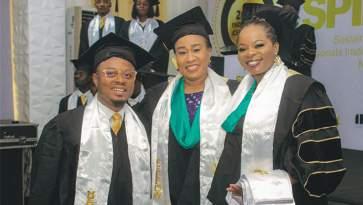
activities of MTS Lagos in its area of operation at the port.
He said ENL will continue to support the cause of MTS by exploring ways of removing barriers on the paths of visiting seafarers who wish to interact with MTS personnel for necessary care and support.
The Executive Director of Port and Cargo Handling Services, Captain Ibraheem Olugbade, who also attended the meeting, equally reassured MTS of full support of the terminal in the discharge of its duties.
Other terminal operators also commended MTS for its selfless service to seafarers and assured the team of their support.
Speaking earlier, the Regional Director, MTS African Region, Revd Cedric Rautenbach, said the purpose of the visit was to discuss issues affecting the activities of the charity organisation and how seaport terminal operators can further assist in fulfilling its mission.
Ejiofor Alike
A leading indigenous oil and gas contractor, Solewant Group, has entered a new phase of aggressive investments and expansions, its Group Managing Director/ CEO, Mr. Solomon Ewanehi, has said.
The company has also won the African Offshore Magazine Oil & Gas Contractor of the Year Award, representing an independent seal of excellence that recognises businesses for delivering exceptional experiences.
The Offshore Energy Contractor of the Year Award is granted only to businesses that meet high standards in quality leadership skills, contract implementation, project execution, and contributions to Africa.
The award was conferred on Solewant Group in Accra, Ghana, last Thursday at the Offshore Magazine’s 3rd Anniversary Summit & Award Ceremony titled “Public Sector Financing: The Oil Revenue Challenges, Solutions and Prospects.” Solewant Nigeria Limited
and its subsidiaries - Solewant Nigeria Limited, Solewant Specialty Protective Coatings & Paints Limited, and Field Joint Coating Limited - have scored many firsts in the provision of pipe, metal, and field joints coating services.
Supporting the oil and gas, water, chemical processing, mining, refining, electricity, transportation, and marine industries, Solewant Group has refined its business model to protect all metal and concrete services through its range of services in West Africa.
Building a successful career can be a daunting task for young graduates. Recognizing this challenge, Shift Up Africa, the brainchild of Ibijoke Faseun Oyewole, has created a groundbreaking internship program designed to equip young Nigerians with the tools and mindset needed to thrive in the professional world. Launched in December 2023, the program has already yielded impressive results. Interns are gaining valuable skills in areas such as design, teamwork using Agile method-
ologies, and success principles. The program recently marked a significant milestone with an inspiring in-person session featuring established mentors like Ibijoke Faseun Oyewole, Fehintoluwa Oduekun, Olajuwon Marc, Adunola Akindele, and Buduka Johnson. These mentors shared their expertise and personal experiences, providing the interns with practical knowledge and a renewed sense of purpose.
“Our aim,” says Ibijoke Faseun Oyewole, the program’s convener, “is to equip young
people with the right mindset, key success principles, strong work ethic, and valuable skills like Agile methodologies and presentation skills.”
With a vision to empower over 100,000 graduates in the next five years, the initiative is well on its way to creating a more confident and successful professional landscape in Nigeria. The organization’s dedication, coupled with the support of partners, mentors, and the community, is paving the way for a brighter future for young Nigerians.
The price of OPEC basket of twelve crudes stood at $87.33 a barrel on Monday, compared with $86.00
Kayode Tokede
The Securities and Exchange Commission (SEC) has reiterated its commitment to support Pension Fund Administrators (PFAs) and its professionals in driving economic growth particularly through capital market investments to bridge the nation’s infrastructural gap.
The Director-General, SEC, Mr. Emomotimi Agama stated this at the 2024 Investment Advisers
and Portfolio Managers (IAPM) Conference, held in Lagos recently. Agama, who was represented by the Executive Director of the SEC, Mr. Bola Ajomale, stated that the essential role of the SEC in facilitating growth across the capital market. He assured stakeholders of enhanced infrastructure investment portfolios that will allow better penetration of the pension industry.
He emphasized the SEC’s readiness to embrace innovative ideas and initiatives that can propel
the nation’s growth in line with President Bola Tinubu’s $1 trillion economy. Agama stated, “Our focus at the SEC is to enable all aspects of the capital market to achieve growth. Certainly, the pension industry, and the professionals, is one of our priorities. I assure you that we are listening.
“As we deliberate today on your role in moving the pension industry into infrastructure and development, the SEC is available for your ideas and innovation
and how we can help you in driving the economy forward,” Agama said.
The President/Chairman of Council, IAPM, Abimbola Olashore highlighted the relevance of the conference themed “Driving Economic Growth and Developmental Agenda with Pension Fund – The Roles Of Investment Professionals.”
Olashore emphasized the urgent need to draw the attention of institutional investors especially pension funds to the huge funding
cap in the infrastructure sector and the potential for high returns on investment for pension funds if well harnessed and managed.
“The pension industry holds an excess of N19.787 trillion with over 10.3 million Retirement Savings Accounts (RSAs) as at April 2024 according to the National Pension Commission (PenCom), such large pool of funds should be channeled into more productive development leveraging the capital market,” Olashore advised.
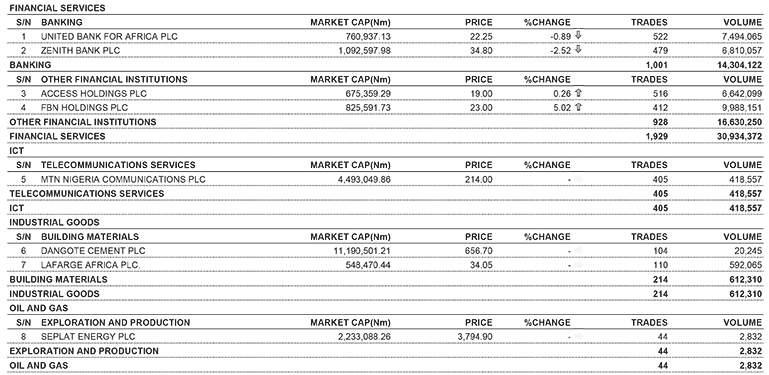
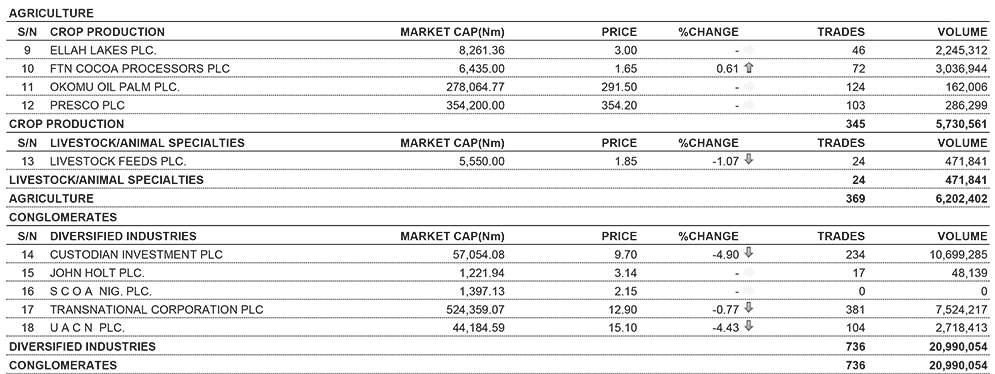




While noting that the pension industry has its fair share of challenges including restricted investment options in the capital market, stagnated growth in the economy, a significant informal sector estimated at 65 per cent of GDP nor participation; an elevated inflation rate of 33.95 per cent among others, he urged the creation of more expertise in the infrastructure sector who understands the investment market dynamics.






A Mutual fund (Unit Trust) is an investment vehicle managed by a SEC (Securities and Exchange Commission) registered Fund Manager. Investors with similar objectives buy units of the Fund so that the Fund Manager can buy securities that willl generate their desired return.
An ETF (Exchange Traded Fund) is a type of fund which owns the assets (shares of stock, bonds, oil futures, gold bars, foreign currency, etc.) and divides ownership of those assets into shares. Investors can buy these ‘shares’ on the
floor of the Nigerian Stock Exchange.
A REIT (Real Estate Investment Trust) is an investment vehicle that allows both small and large investors to part-own real estate ventures (eg. Offices, Houses, Hospitals) in proportion to their investments. The assets are divided into shares that are traded on the Nigerian Stock Exchange.
GUIDE TO DATA:
Date: All fund prices are quoted in Naira as at 28June-2024, unless otherwise stated.
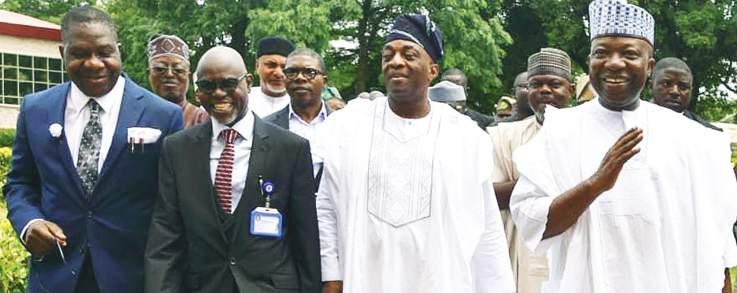
DistinguisheD Personality lecture series...
L-R: Leader of the Senate, Senator Opeyemi Bamidele; Vice Chancellor, University of Ilorin, Prof. Wahab Egbewole (SAN); Vice Chairman, Senate Committee on Police Affairs, Senator Akintunde Yunus and Director General, National Institute for Legislative and Democratic Studies, Prof. Abubakar Suleiman at the 2024 Distinguished Personality Lecture Series titled “Constitutional Amendment and the Political Dynamics of state policing in Nigeria”, delivered by the senate leader at the Unilorin Main Auditorium, Ilorin, Kwara State …. yesterday
Orders anti-graft agency to tender public apology, delist name, photograph from wanted persons’ list
alex enumah in Abuja
The Economic and Financial Crimes Commission (EFCC) has come under the sledgehammer of a Federal High Court in Lagos, for its unlawful declaration of Mrs. Margaret Emefiele, wife of immediate past governor of the Central Bank of Nigeria (CBN), Mr. Godwin Emefiele, as a wanted person.
The court which nullified the conduct of the anti-graft agency subsequently ordered the commission as well as its chairman to pay the sum of N3 million as damages to the complainant.
The court predicated its decision on the grounds that the commission cannot on its own without the order of a court of competent jurisdiction declare any person as wanted.
Mrs. Emefiele had on February 14,
2024, instituted a fundamental rights enforcement suit against the EFCC and its chairman, for publishing her name and photograph in their website as a “wanted person”.
In the suit marked: FHC/L/ CS/262/2024, the applicant submitted that the publication of her name and photograph on the website of the EFCC as “Wanted” without any formal invitation extended to her and without any valid charge and or a court order to the effect amounts to a violation of her fundamental right to the dignity of her person. It also infringed her rights to personal liberty, freedom of movement and right to security as guaranteed under Sections 34,35, and 41 of the 199 Constitution and Articles 5,6, and 12 of the African Charter on Human and Peoples’ Rights (ratification and enforcement) Act (Cap A9) Vol 1 Law
of the Federation of Nigeria, 2011.
The applicant in arguing her case informed the court that she is a law-abiding citizen of Nigeria who has never been invited by the respondents in connection with any allegation.
She further held that, “That there is no criminal charge filed against her that is pending before any competent courts of law in Nigeria. That her attention was drawn to certain publications of the respondents on its websites wherein she, and other 3 persons were declared wanted.
“That as at 17.06pm on February 11, 2024, the X handle (formerly Tweeter) which has over 2.1 million followers, the said publication has been viewed by over 98,800 persons and reposted 455 times, that the publication generated a
The Inspector General of Police, Kayode Adeolu Egbetokun, yesterday, denied trending report that he lobbied the National Assembly to alter the Nigeria Police Act 2020 to elongate his tenure, as well as year of service of personnel in the force.
Egbetokun, in a statement signed by Force Public Relations Officer, Olumuyiwa Adejobi, said it is vital to clarify unequivocally that the bill was originally introduced during the 8th Assembly but did not progress beyond the initial stages before the Assembly's dissolution.
He noted that the Nigeria Police Force is deeply perturbed by the dissemination of false information across various media platforms, notably the distorted publication by Sahara Reporters, regarding the proposed amendment to the Nigeria Police Act 2020.
The police boss also noted that this proposed amendment seeks to extend the years of service for police officers from 35 to 40 years, and the age limit from 60 to 65 years.
According to the statement, "The misleading publications alleged that IGP Kayode Adeolu Egbetokun
personally initiated this bill to prolong his tenure as the 22nd indigenous Inspector General of Police, and has allegedly invested significantly in lobbying lawmakers to facilitate its passage.
"It is vital to clarify unequivocally that the bill was originally introduced during the 8th Assembly but did not progress beyond the initial stages before the Assembly's dissolution. It is standard legislative practice to review and update laws to align with current national realities."
Egbetokun expressed regret that certain media outlets and their sponsors have chosen to propagate baseless accusations, ignorantly disregarding the fact that any modification to existing legislation is designed to enhance its effectiveness and relevance.
Further according to the statement, to understand the true motivations behind this initiative, one needs only look at the Inspector General of Police steadfast commitment to reforming the Nigeria Police Force.
"His advocacy for this bill stems from a genuine belief in its potential to improve the conditions
of service for police officers and thereby bolster security nationwide, rather than seeking personal gain. It comes from the place of duty rather than benefit.
“Furthermore, it is important to note that the tenure of an Inspector General of Police is already prescribed as four years, with the President being the sole authority empowered to remove an IGP before the completion of his tenure," the statement added.
The Nigeria Police Force urged the public to exercise caution and discernment when consuming information, particularly from sources known for sensationalism and unverified claims.
Such misinformation, Adejobi said, not only misleads but also detracts from constructive dialogue and efforts towards meaningful police reform.
He however, enjoined all well-meaning members of the public and strategic stakeholders to disregard these falsehoods and instead lend their support to political and legislative endeavors aimed at improving police services and ensuring the safety and well-being of all Nigerian citizens.
lot of concerns and have caused several persons to call her and reach out to her.
“That the publication of the second respondent’s website declaring her wanted without any invitation, charge or court order gave the impression that she was evading earlier invitation from the law.
“That the said publication by the second respondents was published on several on line newspaper platforms and have generated negative comments against her person, portraying her as a person evading justice”.
But the EFCC in its response argued that all efforts to contact Mrs. Emefiele to respond to corruption and money laundering case they were investigating at the CBN, under her husband, were unsuccessful.
In addition, the commission claimed that their action of publishing Mrs. Emefiele as a wanted person was based on the orders of court, directing it to arrest the applicant and produce her in court.
Delivering judgement in the suit on June 28, trial judge, Justice D. I. Dipeolu, however agreed with the applicant that the publication of her name and photograph in the
website of the EFCC without an order of court violated her rights as guaranteed by the constitution.
“Flowing from the provision of Section 41 above, it is only the court and not the respondents or any other agency that has the power to publish summons in writing where a person who is alleged to have committed a crime absconded or concealed him or herself so that a warrant can be executed against him or her.
“The respondents act of declaring the applicant wanted on their website is a flagrant disobedience of the clear provisions of the administration of the criminal justice Act having subjected themselves to the jurisdiction of court by applying, for a warrant to arrest and detain the applicant”, Justice Dipeolu held.
Besides, the court observed that the respondent’s line of argument that it resorted to declaring the applicant wanted because the applicant was evading arrest or refusing invitation is unfounded in law.
“The respondents appear to be usurping the powers of the court to publish a public summons further to the provisions of section 41 of
the ACIL.
“There is nothing in Section 41 of the Administration of Criminal Justice Act, 2015 that made mention of declaring someone wanted. The provision only talks about a public summons, which shall be published in a newspaper that enjoys wide circulation or circulated in any other medium as may be appropriate requiring the person to appear at a specific place and time.
“The respondents having subjected themselves to the court by applying for and obtaining a Warrant to Arrest and Detain the Applicant, the respondents ought to resort back to court where it obtained the arrest warrant to intimate or pray the court to exercise its powers under section 41 of Administration of Criminal Justice Act, 2015 having approached the court in the first place to obtain a warrant to arrest and detain the applicant who is evading arrest despite their efforts", the judge added.
On the issue of compensation for damages, the court held that the applicant through exhibits tendered was able to prove that she has suffered damages as a result of the conduct of the anti-graft agency.
MultiChoice, Africa’s leading entertainment platform and largest producer of original content on the African continent, has announced a milestone of 6,000 hours of local content produced in 40 languages each year airing across 50 countries and reaching more than 100 million people every day.
According to a press statement, MultiChoice provides a platform for Africans to see their rich cultural heritage and their own experiences reflected on screen.
This provides entertainment and promotes a sense of national identity and pride, which is important for building a cohesive and inclusive society.
John Ugbe, CEO West Africa, MultiChoice, stated that one of the motivations of MultiChoice Africa is to help shape the cultural landscape.
His words: “We recognize the
crucial role local entertainment plays in cultural education, and that is why we have invested over 50% of our total general entertainment spend on African content this year.
“It is also a way to help shape the global perception of Africa as a continent. The entertainment industry can stimulate growth and improve livelihoods – especially in developing countries”.
Dr. Busola Tejumola, Executive Head, Content and West Africa Channels, MultiChoice, explained that the pay-TV business enriches lives through its role in developing Africa’s contemporary cultural heritage.
According to Tejumola, “In Nigeria, Africa Magic shows like Nigerian Idol, Big Brother Africa, Glass House, Sin, Dust, Checkout, and My Flatmates reflect and enrich the cultural identity of the country
and dozens of others capture local imaginations on Africa Magic in ways that only culturally relevant entertainment can.
“Meanwhile, in July we have shows such as 10th Avenue which will premiere on July 4 and Italo airing on the 7th of July which will keep local audiences glued to their screens.
“This kind of commitment to developing local entertainment content has economic as well as cultural effects. By showcasing Africa’s unique cultures and perspectives, local artists and creators can challenge stereotypes and misconceptions.” MultiChoice remains the largest producer of original content on the African continent, with over 17 channels dedicated to local content across 50 countries, including Africa Magic Yoruba, Igbo, Hausa, Epic, Family, and Showmax.
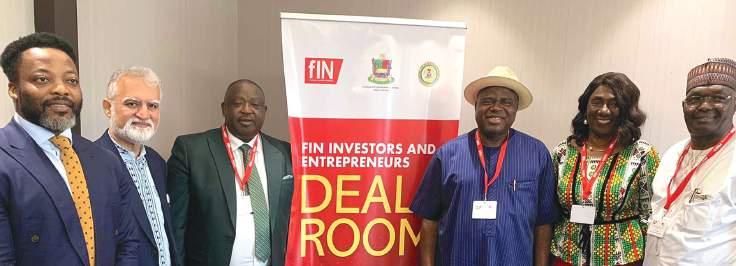
Sunday Ehigiator
A disturbing trend of sexual assault has been exposed in the College of Medicine at the University of Lagos (UNILAG), sparking outrage and calls for reform among students and anti-violence organisations on X, formerly known as Twitter.
Victims have taken to the social media platform, sharing harrowing accounts of assault and criticizing the university's inadequate response, using the hashtag #EndSACultureInCMUL.
According to reports, one victim reported the assault to the Dean of Student Affairs, only to receive a meagre fine and an apology letter from the alleged perpetrator.
According to the report, the university policy allows first-time offenders to pay a mere N2,500 for sexual assault, with repeat offenders facing a doubled fine of N5,000.
Among several others, allegations of sexual assault were made against a second-year pharmacy student, Oluwagbemileke Otokiti, according to an anonymous messages sent to @Theariaspeaks on X, Otokiti was previously involved in a similar incident in March 2024.
He was reportedly fined ₦5000, and required to write an apology letter and provide a guarantor to vouch for his conduct by the University of Lagos' student legislative council, known as the House of Lords.
On June 28, 2024, another male pharmacy student was reported for sexually harassing a female radiography student.
According to the report, at approximately 1:00 am on June 26, when the victim had fallen asleep in a cold room where she was studying, a student identified as Samuel inappropriately touched her. The victim pushed Samuel away and called her friend, who confronted him, but he wasn’t bothered. He allegedly claimed that “it was mutual”. She said she reported the case to the school's House of Lords, and an investigation was launched immediately.
One of the messages sent to @ TheAiraspeaks also exposed one Chibueze Nwammah, a 600-level
male medical student, as an abuser who has allegedly assaulted over 30 female students.
Under the guise of checking on his victims’ academic progress severally, he allegedly takes advantage of them, forcing them to hug him and rub his penis against them.
In October 2023, Chibueze was said to have been reported to the school authorities over sexual assault involving at least 11 female classmates and an unknown number of students in younger classes. A petition was written and signed by 54 people. The authorities formed a panel, but there has been no update.
In another case, when news of an assaulted pharmacy student reached the Pharmaceutical Association of Nigerian Students’ sub-dean, the only
action taken was a vague message in a group chat advising male pharmacy students to reign their emotions in and “mind your conduct with the opposite sex.”
Despite these serious allegations, the accused perpetrators continue to participate freely in regular school activities, including sports and social events. Most disturbingly, they remain housed in mixed-gender dormitories, potentially putting more female students at risk.
In the wake of the initial tweet, several victims have come forward with compelling evidence, not only incriminating the alleged perpetrators but also implicating the University of Lagos management in a systematic cover-up, as well as some lecturers within the school.
The administration mandates that every undergraduate sign an indemnity form, effectively gagging them from all forms of protest under threat of expulsion. However, a petition has been launched by well-meaning organisations, demanding stricter consequences for sexual assault perpetrators, including withholding professional licenses and implementing effective punishments.
Established anti-violence organizations, such as LagosDVSA and WARDC, have thrown their support behind the initiative, signalling a broader recognition of the need to address campus sexual assault. Attempts to reach the Dean of Students proved abortive as at press time.
The management and staff of Roseluyi Exceptional Students Academy (RESA) has held a party in honour of the 67th birthday of Edo State Governor, Mr. Godwin Obaseki.
Addressing journalists in Benin City, the Founder/Visioner of Roseluyi Exceptional Students Academy (RESA), Mrs. Osarhiemen Isaac-Aluyi, commended Governor Obaseki for his support to the Academy and vulnerable persons in the State.
She also lauded the exemplary leadership of Governor Obaseki which she said has made life meaningful for people including the less privileged and prayed for God to empower him more to record more feats for the special children
and the state in general. Her words: “We have declared today in Roseluyi exceptional Academy as Obaseki’s day. We declared it since last year, the other year, and this year - since three years in a role now, we are celebrating, whether he is here or not, we celebrate him.
“He is one governor that I have seen who is so passionate about those vulnerable in our society. He has been there for us not just RESA; to everyone. We want to say thank you Mr. Governor, we love, we pray for you on a daily basis.
She further explained that she has experienced military and civilian governors in Edo state but Governor Obaseki administration is super.
A group of lawyers under the aegis of Lawyers in Defense of Democracy, has raised the alarm over alleged plot to frame-up a member of the House of Representatives, Hon. Ikenga Ugochinyere with trumped-up charges of rape, kidnapping, murder and other criminal offences.
The group on Monday in Abuja, vowed to resist any attempt to silence the Imo State lawmaker, owing to his public stance against acts capable of undermining the current administration of Siminilaiye Fubara,
the management of the affairs of the Peoples Democratic Party (PDP) and the constitution of the country.
Addressing journalists in Abuja, a spokesperson of the group, Mr. Maxwell Opara, claimed that there is a desperate attempt to frame Ugochinyere up for gun running, murder, rape and kidnapping in a desperate attempt to curtail and silence his public condemnation of anti-democratic practices in the country.
According to him, "We have intercepted credible evidence of moves and attempts by some desperate yet,
highly placed Nigerian politicians to silence Hon. Ikenga because of his advocacy for good governance and respect for the rule of law and constitutionalism in Nigeria, especially as it relates to the recent happenings in Rivers State and the need to save the PDP from lingering crises."
According to the group, Ugochinyere is a law-abiding citizen and spokesperson of Nigeria's opposition lawmakers, a defender of democracy, advocate of good governance and a member of the House of Representatives representing Ideato to North and South Federal
James Sowole in Abeokuta
In pursuit of its Corporate Social Responsibilities (CSR), Polaris Bank Limited, is partnering the Nigeria Conservation Foundation (NCF), on land restoration through tree planting initiative.
The bank's initiative, kicked off on Monday with a tree planting project at the Tai Solarin University of Education (TASUED), Ijagun, Ijebu Ode, Ogun State.
At the event held in front of the university's council chamber, the institution's Vice Chancellors, Prof. Olumide Banjo, represented by his deputy, Prof. Adekunle Adeogun, was full of praises for the bank's support for the school.
Constituency of Imo State. Frowning against the move, Opara recalled how the lawmaker had previously been subjected to all manner of political blackmail for choosing to stand for equity and justice and believed that he is innocent and that any sort of evidence against him is fabricated.
He said, "This is not the first time Ugochinyere has been framed for similar allegations in respect of the same issue for speaking the truth to the government and standing up for justice, equity and good governance, while resisting ineptitude, abuse of power and bad governance”.
According to Ofikulu, the 2024 theme focuses on "Land Restoration, Desertification, and Drought Resilience," which aligns with the United Nations Decade of Ecosystem Restoration (2021-2030).
He said: "In support of this, Polaris Bank has committed to sustainable practices and land restoration by planting trees nationwide in regions affected by erosion, such as Ogun State.
"It is noteworthy to mention that we are commencing this initiative with Ogun State.
"At Polaris Bank, sustainability
Speaking at the event, the Polaris Bank Executive Director, Chris Ofikulu, said the tree planting initiative, was borne out of the institution's commemoration of the World Environment Day in June 2024.
is not just a catchphrase. It is our ethos. It is a journey in which we are committed to walk in with conviction.
"Our sustainability practices involve promoting responsible banking, empowering people and society, addressing environmental issues, and sustainable economic growth.
"We aim to ensure that every decision we make, from investments to operations, is guided by the Environmental, Social, and Governance (ESG) principles.
"Our choice of TASUED as the starting port for the bank’s tree planting project is borne out of our long-standing relationship with the University, which commenced with the erstwhile SKYE BANK in 2007.
"The relationship has today
remained very cordial and mutually beneficial to both organizations.
"Today's tree planting exercise at Tai Solarin University of Education in collaboration with the Nigerian Conservation Foundation (NCF) is a testament to our commitment to these sustainability principles."
Ofikulu said the bank shares its dedication to encouraging sustainable economic growth and appreciating the importance of environmental preservation.
His words: "This project aligns perfectly with the World Environment Day, in addition to reducing carbon footprints and enhancing our natural ecosystem. It also aims to promote public awareness regarding the importance of environmental preservation.
“The benefits of our tree-planting initiative cannot be overemphasized. It will contribute significantly to the restoration of degraded areas, the prevention of soil erosion, and the enhancement of overall environmental health.
"This tree-planting project signposts Polaris Bank’s way of giving back to the society through dedication to environmental stewardship and community well-being, promoting a greener future through Corporate Responsibility."
While stating that the initiative would involve planting of 500 trees, Ofikulu, said 250 seedlings would be planted in the university while the remaining 250 would be planted in another part of the state that would be determined later.
Opara said it was part of the machinations that led to several failed attacks, assassination attempts and bombing of Ugochinyere's house in his home town in Imo State. leading to the untimely death of his uncle and three other persons.
He however said: "This plot has taken a dangerous turn as our intelligence is that, his traducers have procured the services of a woman who will falsely claim that Ugochinyere raped her.
"They are also in the final negotiation stages with some rascals and petty thieves who have been promised adequate compensation to come and admit that guns which will be supposedly recovered from them were handed over to them by Ugochinyere.
"They are still frantically searching for the remains of any dead person they would use to claim that the gang murdered at the behest of Ugochinyere.

L-R: Council Member, Nigerian Bar Association, Section on Business Law NBA-SBL, Dr Fatima Kere Ahmed; Chair NBA-SBL; Conference Planning Committee, Ose Okpeku; Chairman NBA-SBL, Dr Adeoye Adefulu; Special Guest of Honour, Alhaji Suleiman Barau; Founding Chairman, George Etomi; Chief Executive Officer, Nigerian Economic Summit Group NESG, Dr Tayo Adeloju; and Vice Chair NBA-SBL, Ozofu Ogiemudia,Ozofu Ogiemudia at the 18th Annual International Business Law Conference 2024, themed “Survive and Thrive” by NBA-SBL in Abuja… recently.
Insists decentralised policing is antidote to insecurity Warns against regular deployment of armed forces for internal security challenges Faults multiplicity of vigilante groups, security outfits without legal framework
hammed shittu in Ilorin and sunday Aborisade in Abuja
Leader of the Senate, Senator Opeyemi Bamidele, yesterday, lamented the alleged dysfunctionality of the Nigeria Police, saying as currently constituted, the police were not properly established to succeed in the country.
Bamidele, also Vice Chairman of the Senate Committee on the Review of the 1999 Constitution, further observed that any police structure that did not reflect Nigeria’s federal realities would not effectively address the roots of security challenges facing the federation.
He made these remarks at the 2024 Distinguished Personality
Lecture Series jointly organised by the Department of Political Science and Institute of Legislative Studies, University of Ilorin, Kwara State yesterday.
The lecture, titled: “Constitutional Amendment and the Political Dynamics of State Police in Nigeria,” was chaired by the Deputy President of the Senate, Senator Barau I. Jibrin. Jubrin was represented by the Deputy Leader of the Senate, Senator Oyelola Ashiru.
At the lecture were the Chairman, Senate Chairman on Agriculture, Senator Saliu Mustapha; Chairman, Senate Committee on Trade and Investment, Senator Sadiq Umar; and Vice Chairman, Senate Committee on Police Affairs, Senator Akintunde Yunus.
Others were Vice Chancellor, University of Ilorin, Prof. Wahab Egbewole (SAN) and Director General, National Institute for Legislative and Democratic Studies, Prof. Abubakar Suleiman.
Also, Speaker, Kwara State House of Assembly, Rt. Hon. Yakubu Danladi Salihu; Speaker, Ekiti State House of Assembly, Rt. Hon. Adeoye Aribasoye and lawmakers from the two assemblies and National Assembly were in attendance.
Bamidele dissected diverse socio-economic and political forces responsible for the dysfunctionality of the Nigeria Police and reeled off antidotes to the problems of policing in Nigeria.
While warning against the incessant deployment of the armed forces without compliance with the provisions of the 1999 Constitution, Bamidele faulted the undue establishment and operations of vigilante groups and security outfits at the state levels without national legal framework.
He explained that the incessant deployment of the armed forces for the purpose of maintaining law and order internally was at variance with their mandate under the 1999 Constitution and did not portray Nigeria as a truly democratic and internally stable democracy.
The senate leader observed that the challenges facing the Nigeria Police “are numerous. How the police are
The Nigerian Air Force, has cleared the air on the recent mishap involving one of its platforms in Kaduna State.
This was as troops in collaboration with other security forces, raided multiple hideouts of the Indigenous People of Biafra, and its armed wing, the Eastern Security Network, leading to the arrest of key terrorists' kingpins and the seizure of a significant cache of weapons and ammunition.
A statement by Director of Public Relations and Information, Nigerian Air Force, AVM Edward Gabkwet, noted that contrary to reports that a NAF helicopter had crashed in Kaduna, no helicopter crash occurred.
Gabkwet explained that a NAF Unmanned Aerial Vehicle (UAV) experienced a mishap after take-off for a mission, at a location near Rumji Village, about 15 Km from Base.
According to him, since it was an unmanned vehicle, there were no casualties on board or on ground.
The NAF spokesperson disclosed that preliminary investigation has since commenced to ascertain what may have caused the mishap.
"Nigerians can rest assured that this minor setback will not, in anyway, impinge on all ongoing operations.
“It should also be pointed out that the propensity to always rush to press in the name of ‘breaking news’ without a hold of the complete facts should be discouraged in its entirety," Gabkwet said.
He lamented that while the news
of the crash filtered in, some news outlet misinformed Nigerians that a helicopter had crashed without the decency to clarify from the NAF.
This attitude, he said, should be discouraged as it negates the principle of developmental journalism, balanced reporting and fairness.
He, however, advised journalists to always seek clarification from authorised military personnel before rushing to ‘break’ the news.
On the raid on IPOB, a statement by Nigerian Army, disclosed that one of the operations was conducted in Orlu Local Government Area, targeting notorious kingpins, namely Izuchukwu Emejuru, aka "Kingkong," and Chibuzor Chikwe, aliasThe"Onyema." service further disclosed that the raid resulted in the arrest of the suspects and the confiscation of a variety of weapons, including a semi automatic pump-action gun, a locally made gun, and a pistol.
"Additionally, valuable items belonging to Eze Ogberuru, whose palace was earlier desecrated and burnt with his belonging carted away by ESN elements, were recovered by the troops," the statement said.
In another operation, troops raided the hideout of a suspected IPOB/ESN kingpin identified as Chinemerem, aka "Bam Bam," in Ezeinyen Okwe Umucheke, Onuimo LGA.
"The operation led to the neutralisation of Chinemerem, as he attempted to reach for his weapon and the arrest of several of his accomplices. A substantial amount of
weapons, ammunition, and IPOB/ ESN paraphernalia were seized, and the hideout was subsequently destroyed.
"Further demonstrating their resolve, troops intercepted suspected IPOB/ESN terrorists at a hideout in Amausa, Okigwe LGA. Overpowered in the ensuing shootout, the terrorists were forced to flee in disarray, abandoning a cache of ammunition and motorcycles.
“The troops recovered 72 rounds
of 7.62 x 51mm (NATO) ammunition, four rounds of 7.62 mm (Special), three rounds of 5.56mm, one FN Rifle, a pair of military desert boots and one green beret.”
In a related development, troops successfully tracked and arrested a suspected terrorist, identified as Ibrahim Abdullahi, in Edu LGA of Kwara State. The operation led to the recovery of an AK-47 rifle, magazines, and ammunition," the Nigerian Army added.
organised, managed, governed and funded can determine its ability to deliver on its constitutional mandate of protecting the life and property of Nigerians.
“Understanding these dynamics can help in appreciating what needs to be done to improve security in the country. It is clear that Nigerians do not fully appreciate the depth and scale of the challenges facing the police.
“I maintain that the police have not been set up properly to succeed in this nation. Effective policing in Nigeria is almost impossible unless there are fundamental changes.
“Indeed, the constraints faced by the police are used as excuses for various misconducts and unprofessional behaviours by many officers of the force.
“Despite many attempts by its leadership of the Nigeria Police to enforce discipline and even sack bad eggs, operational misconduct is still prevalent in the ranks of police operatives, and this undermines their capacity to decisively respond to pervasive insecurity nationwide.”
He further argued that the regular deployment of the Nigeria Armed Forces across the federation was, no doubt, an indication that the present police structure could no longer address the present security challenges of our nation.
To correct these anomalies, therefore, the senate leader canvassed the adoption of decentralised police model to address a myriad of security challenges currently undermining
the country’s internal cohesion and disincentivising investors from coming into the federation.
According to him, it was selfevident that the establishment of state police would go a long way in mitigating Nigeria’s current security challenges, especially if the proper control mechanisms were put in place. He further listed different measures to prevent the political elite from using the state instrument against dissenting voices if the state police is eventually adopted.
Bamidele first suggested that an Independent Police Service Commission should be established to guarantee the autonomy, independence and non-partisanship of the state police at federal and state levels in matters of appointment, discipline, promotions and accountability.
Such an independent police commission, he suggested, should be patterned after the National Judicial Council and utterly be insulated from the undue interference of the political elite whether at state or federal level. He observed that the adoption of a decentralised police model “is not without its political complexities. One of the primary concerns is the potential for abuse of power by the political elite.
“Its critics fear that the political elite may use state police to suppress opposition political parties, critical social actors or perceived enemies,” adding that the fear was not unfounded given Nigeria's history of the abuse of police powers under the Nigeria Police.
Alex enumah in Abuja
Justice James Omotosho of a Federal High Court, Abuja, yesterday, dismissed the N1 billion fundamental rights suit brought by the detained leader of the Indigenous People of Biafra (IPOB), Nnamdi Kanu, against the federal government and the Department of State Service (DSS).
Omotosho in dismissing the suit held that the complainant failed to prove his allegations of breach of his fundamental rights by the defendants.
Delivering judgement in the suit marked: FHC/ABJ/CS/1633/2023, the court held that the claims, that Kanu was denied unhindered access to his lawyers by the operatives of the DSS and that the officials eavesdropped on his conversations
with his lawyers in the preparation of his defence, could not be established.
"It is mere assertion without any iota of proof by the applicant and court of record can't act on mere assertion" the court held, adding that the complaint of unfair hearing in his criminal case doesn't arise as he was entitled to rights as provided for in chapter 4 of the Constitution of the Federal Republic of Nigeria 1999 (as amended).
Kanu had through his lawyer, Aloy Ejimakor, sued the Federal Republic of Nigeria (FRN), AttorneyGeneral of the Federation (AGF), DSS and its Director General as 1st to 4th respondents respectively, for allegedly violating his rights as guaranteed by the constitution.
Among the reliefs sought in the suit dated and filed December 4,
2023, were a declaration that the respondents’ act of forcible seizure and photocopying of confidential legal documents pertaining to facilitating the preparation of his defense which were brought to him at the respondents’ detention facility by his lawyers, amounted to denial of his rights to be defended by legal practitioners of his own choice.
He also sought a declaration that the respondents’ act of preventing his counsel from taking notes of details of counsel’s professional discussions/consultations with him at DSS detention was unlawful.
He further sought a declaration that the respondents’ act of eavesdropping on his confidential consultations/conversations with his lawyers, amounted to denial of his right, among others.
Kanu, therefore, sought an
order of injunction restraining and prohibiting the respondents from their act of forcible seizure and photocopying of confidential legal documents brought to him at the detention facility by his lawyers. He also wanted an order mandating the respondents to jointly and severally pay the sum of N1 billion as damages for the mental, emotional, psychological and other damages he suffered as a result of the alleged violation of rights among others.
But in a counter affidavit dated and filed by the DSS on March 12, the security outfit denied allegations levelled against it. In the application deposed to by Yamuje Benye, the DSS claimed that Kanu was in safe and secured custody of the DSS and was not detained in solitary confinement.

Front Row: L-R: Dr. Philip Folarin, Dr Simon Akaayar, Prof. Wale Olawoyin SAN, Prof CK Agomo (Chairperson),
Olawale Ajimotokan in Abuja
In a major sign of escalation of political differences, the FCT Minister Nyesom Wike has challenged the senator representing FCT, Ireti Kingibe, to test her popularity again in 2027 election, vowing that she would not be returned to the upper chamber.
He made the threat yesterday at the official flag-off ceremony of the construction of Mabushi bus terminal performed by the Speaker House of Representatives, Rt Hon Tajudeen Abbas as a riposte to the criticism meted on the FCT Administration by Kingibe, during Arise News
THISDAY Live yesterday.
In the interview, Kingibe of the Labour Party seethed that she was sidelined and her constituency was marginalised and not catered to. In addition, she criticised the response to the Karu Market fire while admitting not having a plainsailing relations with Wike, whom she said, had bluntly refused to communicate with her since their only meeting at a Senate Committee hearing on FCT supplementary budget for 2023. But apparently incensed by the interview where Kingibe aimed a jab at him and the FCT of State, Dr Mariya Mahmoud, Wike
slammed Kingibe of not meeting up to expectation as the Senator representing the FCT and failing to sponsor bills to improve education and health delivery in the FCT.
“I overhead somebody (Kingibe) in Arise this morning. Unfortunately, I hear the person is a member of National Assembly and it is unfortunate I say so.
“With all due respect, what you don't know, you don't know, what you know you know, and the good thing for you is to tell people you don't when you don't know, then people will educate you.
“The Honorable Minister of State and my humble self, have not been
The Securities and Exchange Commission (SEC) yesterday warned the investing public to desist from dealing with Alpha Trust Investment Club, stressing that the company not registered under the apex capital market regulating body.
SEC in a statement said its attention has been drawn to the activities of Alpha Trust Investment Club, an entity that is believed to be facilitating investment to the public.
The Commission, however, notified the investing public that Alpha Trust Investment Club and its investment schemes are not registered/authorized by the Commission.
SEC in a statement added that, “Investment promoters and the general public are by this NOTICE warned that it is a serious contravention of the Investments and Securities Act 2007 for any person or entity to operate as an investment professional or carry on investment and securities business without prior registration with the Commission.”
The Commission strongly advises investors to always verify the registration status of any person or entity and the investment product(s) being promoted before dealing with such person or entity.
The Commission in June 2024 warned that investing in meme coins, including $Davido, is highly risky and should be done with a full understanding of the associated risk.
The Commission in a circular stated that, "The attention of the SEC has been drawn to a meme coin known as “$Davido” allegedly linked to the popular Nigerian singer, David Adedeji Adeleke AKA Davido.
"Generally, meme coins are cryptocurrencies inspired by memes and internet jokes. They are often envisaged as a fun, lighthearted cryptocurrencies promoted through a social media community and sometimes through celebrity endorsements".
The SEC further stated that Meme coins are also not intended to serve as a medium of exchange accepted by the public as payment for goods and services, or as digital representation of capital market products such as shares, debentures, units of collective investment schemes, derivatives contracts, commodities or other kinds of financial instruments or investments.
The Commission therefore advised the general public that meme coins lack fundamental value and are purely speculative.
"The general public is further
WARNED that investing in meme coins, including $Davido, is highly risky and should be done with a full understanding of the associated risk.
"Capital Market Operators are by this Notice warned not to associate with instruments that fall outside the SEC’s regulatory purview. Such instruments should not in any manner be distributed or monitored through any capital market mechanism".
The SEC also emphasised that the Commission does not recognize $Davido as an investment product or investable asset class under its regulatory purview, as such individuals who patronize it, do so at their peril.
"The Commission will continue to monitor developments within the ecosystem and will not relent in deploying its regulatory powers as and when required," the circular added.
in office for more than 11 months and the person is angry that they are praising us. If you don't want or you are angry about that, go and hug yourself on a transformer.
“If we have done well, we have done well. If we haven't done well, we haven't done well. I'm proud to say that in the short time that Mr. President has appointed us, we have done well.
“I challenge that legislator, if you are very popular, in 2027 come and run under Abuja; we will fail you. Do you think that what happened last time, will happen again? It will not happen again. Luckily for me, I am the FCT Minister now. So that is my territory and I'm not afraid.
“So, People should be able to come out and be able to accept the truth. We are not begging for anybody to become our friend;
we have so many friends that we cannot even carry along. So, how can we go and be begging people to become our friends. We are not interested in that.
“If you are angry that people are praising us, by next year your BP level will go very high because the praises you would see would be too much,” Wike said.
He said funds were available for the construction of the bus terminus that will be delivered in May 2025 as part of the second year anniversary of President Bola Tinubu.
He said the FCTA had a problem with the plan for the Central Business District location because there was distortion of Abuja Master Plan as the land which was earmarked for the bus terminal and where the trains would pass through, had been allocated out and C of
O given out. In his remarks, Abbas described the construction of the Mabushi Bus Terminal as a critical step towards enhancing transportation infrastructure in the FCT and ensuring residents can commute safely and efficiently. He lauded FCTA for inclusive strategy that promotes balanced growth and development and ensures that the infrastructure and economic advancements reach all communities, thereby enhancing the quality of life for all residents. Abbas said to enable Abuja compete with the world's leading cities, integration of advanced technology in urban planning and management was crucial, while smart city initiatives can enhance the efficiency of services and improve the quality of life for residents.
Kemi Olaitan in Ibadan
The Oyo State Governor, Seyi Makinde, has set up a committee for the coronation and presentation of staff of office to the new Olubadan of Ibadanland, Oba Owolabi Olakulehin.
The committee is headed by the Commissioner for Local Government and Chieftaincy Matters, Mr. Ademola Ojo.
Commissioner for Information, Dotun Oyelade, who is also a member of the committee, made the disclosure in a statement issued in Ibadan yesterday.
Other cabinet members in the committee were Commissioner for Culture and Tourism, Dr. Wasiu Olatunbosun; and the Commissioner
for Women Affairs and Social Inclusion, Mrs Toyin Balogun. The coronation committee also included the son of the incoming Olubadan, Folaseke Owolabi Olakulehin; Dr. (Mrs.) Onikepo Akande; Oba Abiodun Kola-Daisi; Oba Lateef Gbadamosi Adebimpe; and Chief Hazeem Gbolarumi.
Others were Mr. Toye Arulogun; Bishop Ademola Moradeyo; CP Sunday Odukoya (Rtd.); Mogaji Abduljeleel Adanla and Senior Special Assistant to the Governor on Local Government and Chieftaincy Matters, Hon. Ramota AgberemiDabo.
“Applicant has consistently requested that various prayer books and religious materials be brought to him as part of his fundamental human right;” he said. Benye averred that Justice Binta Nyako, who was presiding over Kanu’s criminal trial, had always maintained that visit to him should always be under supervision as it was the best practice all over the world.
He said in line with the Service Standard Operation Procedure (SOP) of the State Security Service, all visitors to her facility were subjected to normal routine security checks and items in their possession scanned.
Makinde had approved the nomination by the Olubadan-InCouncil of Oba Olakulehin as the 43rd Olubadan of Ibadanland and subsequently fixed July 12 for the coronation and presentation of the Staff of Office.
One of the world’s foremost humanitarian organizations, Medicines Sans Frontieres (MSF), also known as Doctors Without Borders, has stated that it could work effectively only when it could enjoy the support of leaders where it operates. The MSF made this statement yesterday in Enugu when the its team led by MSF Special Adviser to the Nigerian Office, Professor Simeon Alozieuwa, visited the Chairman of Geometric Power, Professor Bart Nnaji. Alozieuwa said that local support has become more crucial
because of the nature of the operations of the organisation, which won the 1999 Nobel Prize for Peace for its extraordinary efforts in crisis places throughout the world.
He said: “While some other international organisations work in conflict places just to save lives, we not only save lives and ameliorate sufferings worldwide, we also speak out against acts that offend human dignity."
According to him, the MSF's policy of “see something and say something, frequently draws the ire of governments and influential groups.”
Alozie recalled that when MSF reported in 2016 that there was
a high level of malnutrition in the Northeastern part of Nigeria caused by Boko Haram insurgents that could result in a cataclysmic situation, the Nigerian authorities were not pleased for fear that the report could dent the country’s image.
“However, when a UNICEF detailed report showed the extent of malnutrition”, said Alozieuwa, the government acknowledged the value of the MSF report which was consistent with its policy of speaking out.
He disclosed that working directly with local leaders “has enabled the organisation to obtain reliable information and knowledge
on issues of great importance to the people’s survival."
He added that the MSF called on Nnaji to seek his support because he is still an influential personality in the South-east and the country as well as being known globally “even though you are no longer the Minister of Science and Technology or the Minister of Power.”
Nnaji, in his response, thanked MSF for its star role in alleviating human suffering throughout the globe, noting that “it is eminently deserving of the Nobel Prize it won towards the end of the last century”.
He expressed pleasure that the
foremost humanitarian organisation was conceived in Nigeria during the Civil War when its founder, Bernard Koutchner, who was then working on the International Red Cross staff was disillusioned that he and his colleagues could only attend to individual victims of the war but could not report the humanitarian crisis.
The MSF was formed in France in 1971, a year after the Nigerian Civil War ended, by doctors and journalists to bring succor to those in desperate need in conflict areas.
“Interestingly, this critical organization traces its roots to our dear country”, he said, pledging maximum support to it.
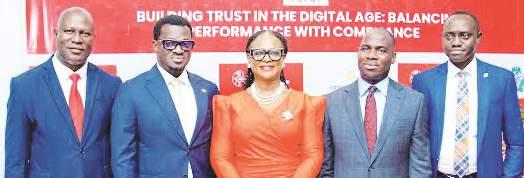
L-R: Company Secretary, Financial Institutions Training Centre (FITC), Alaba Ekundayo; Group Head, E-Business & Digital Services at Providus Bank, Elliot Sangoleye; Managing Director/CEO, FITC, Chizor Malize; Deputy Director, Payments System Management Department Central Bank of Nigeria (CBN), Taiwo Oladimeji, and Head, Digital Banking, United Bank for Africa (UBA), Kayode Olubiyi, during the FITC TechNovation Fintech Conference in Lagos…recently
Okon Bassey in uyo
No fewer than 16 criminal suspects arrested in seven different operations are now in the custody of the Akwa Ibom State Police Command awaiting prosecution.
The state Commissioner of Police, Waheed Ayilara, disclosed this yesterday while briefing journalists on the activities of the state Police Command.
The police commissioner said the suspects were arrested for various crimes, including murder, cultism, recovery of firearms, kidnapping, armed robbery and child trafficking among other crimes.
Ayilara said the suspects have confessed committing the crimes, and will be charge to court soonest.
He said locally made gun,
WaleIgbintade
Nova Merchant Bank Limited has filed a winding-up petition before a Federal High Court in Lagos against Emzor Pharmaceutical Industries, seeking to recover a loan of N6,205, 575,569.93 (Six Billion, Two Hundred and Five Million, Five Hundred and Seventy Five Thousand, Five Hundred and Sixty Nine Naira, Ninety Three Kobo) granted the firm.
The suit marked: FHC/L/ CP/1044/2024 has been assigned to Justice Chukwujekwu Aneke.
Listed as respondents in the suit are: Central Securities Clearing System Plc, Access Bank Plc, Ecobank Nigeria Limited, Citi Bank Plc, Fidelity Bank
Plc, First City Monument Bank Plc, and First Bank of Nigeria Limited.
Others are: Guaranty Trust Bank Plc, Jaiz Bank Plc, Keystone Bank Limited, Polaris Bank Plc, Providus Bank Plc Stanbic IBTC Bank Plc, Sterling Bank Plc, Standard Chatered Bank Plc, Union Bank of Nigeria Plc, United Bank For Africa Plc, TAJ Bank Limited, WEMA Bank Plc, and Zenith Bank Plc.
In a Motion on Notice filed by counsel to the bank, Mr. Oluwakemi Balogun (SAN), he stated that the petitioner has issued on the respondent the statutory three weeks demand notice required by Section 572 of the Companies and Allied Matters Act (CAMA) 2020.
A Delta State High Court at Ibusa, Oshimili North Local Government Area, has convicted and sentenced to death two men, Mr. Ojerbo Solomon and Mr. Ola Babatunde, on charges of armed robbery, rape and murder.
Justice M. O. Omovie presided over the court during the trial.
The prosecution, conducted by Mr. E.H. Edema had, through its five witnesses led evidence to show that on February 8, 2016, the two defendants, while armed with guns,
cutlasses, and knives, broke into the house of the victims.
In the course of the armed robbery operation, the defendants reportedly raped the victims and thereafter slit their throats.
Although one of the victims, Mr. Praise Sunday, survived the violent attack, his mother and sister died from the injuries inflicted on them by the defendants during the attack.
After committing the attack, the two defendants escaped on the victim’s motorcycle to Ewohimi in Edo State, from where they were later apprehended by the police.
Rotarian Jide Ogunleye has officially assumed office as the 21st President of the Rotary Club of Omole-Golden as Rotarian Jide Ogunleye officially assumed the role of the 21st President of the club. The official handover ceremony was attended by members, guests, and distinguished Rotarians, both in person and virtually.
Ogunleye began his tenure yesterday, succeeding Rotarian Veronica Susan Isijola. The club will celebrate the handover at a fundraising investiture event on
July 14, 2024 in Oregun, Lagos.
According to a statement, the event will feature Chief Dele Momodu as the Father of the Day, Olubayo Adekanbi as the keynote speaker, and Mr. Olufunsho Lawal as the Chairman of the Day.
In his acceptance speech, Rotarian Ogunleye shared his vision for the club’s future, stating: “I will focus on bringing us closer together and building on the legacy of the past president. Together, we will take our club to greater heights.”
charms and illicit drugs were recovered from them, adding that “discreet investigation led to the recovery of one AK-49 rifle, one SMG rifle, two magazines,
six rounds of 7.62mm live ammunition from the suspect’s residence.
“At about 9:30a.m. on May 14, 2024, following a distress call that
there was an incident at Effiat Offot, off Atiku Abubakar Way, Uyo, police operatives on routine patrol mobilised to the scene, one Edima Edet ‘f’ of Mbio-Oku Nsit in Uyo LGA, was seen gruesomely murdered by her man lover, Elisha Idongesit Ime, aged 20, of No. 104 Effiat Offot by Atiku Abubakar Way, Uyo.
Alex Enumah inabuja
The need for those in charge of the management of the finances of the judiciary to be transparent and accountable have, once again, been brought to the fore.
This is attributable to the role the judiciary play not just in maintenance of peace, law and order but, also in the sustenance and deepening of democratic governance across all strata of society.
would enhance justice delivery in the country.
According to the Administrator of the National Judicial Institute (NJI), Justice Salisu Abdullahi (rtd), the efficient and effective management of the finances and other resources of the courts
Salisu spoke yesterday in Abuja at the opening of a national workshop for Directors of Finance, Deputy Directors, Chief Accountants, Auditors and other managers of the financial resources of courts at all levels in the country.
“Ultimately, this engagement lends credence to the crucial nature of your various roles in the administration of justice and invariably reinforces the need to ensure that you stay up to date with the evolution of financial management, global best practices as well as fundamental principles, that are indispensable to the performance of your duties,” he said.
Rivers State Governor, Mr Siminalaye Fubara has reiterate his led government commitment in ensuring a better economy for the state. This is as Port Harcourt Chamber of Commerce, Industry, Mines and Agriculture (PHCCIMA) has commenced activities to
improve the economy of the state.
Speaking recently, during the flag-off of construction works at the permanent site PHCCIMA in Aluu, Obio/Akpor, Fubara assured the people that his government’s commitment towards investing in roads, power, water, and other critical infrastructures that will make the state a business hub.
Fubara, who was represented by the Speaker of the Rivers state House of Assembly, Victor Oko-Jumbo, stated that the vision of the government for the state is prosperity, where businesses thrive, investments flourish, and opportunities abound for all our residents.
Speaking on the project, the
PHCCIMA President, Mike Elechi explained that construction of the international trade centre is a milestone in the history of the Chamber, saying that it will serve as a hub for fostering trade relations, promoting investment opportunities, networking among businesses both locally, nationally and internationally.
Gbenga Sodeinde inadoekiti
Ekiti State Governor, Mr Biodun Oyebanji, yesterday, sworn in four new Permanent Secretaries in the state’s civil service with a charge to ensure they continue to exhibit transparency, integrity, and prudence
in the discharge of their duty.
Speaking at the swearing-in ceremony in Ado-Ekiti, Governor Oyebanji urged the newly appointed Permanent Secretaries to foster an atmosphere of teamwork, confidence building, and collective responsibility, stressing the need for them to inspire
others by being solution providers.
While urging the new appointees to embrace innovation and technology in their official duties, the governor challenged them to justify their appointments by giving their best at all times and ensuring they bring creativity, compassion, and vigour to bear on their job as permanent secretaries.
The governor called on all accounting officers across MDAs to re-double their efforts and increase the tempo of service delivery in order to achieve the shared prosperity agenda of his administration.
Michael Olugbode in abuja
The Chairman/Chief Executive Officer, Nigerians in Diaspora Commission (NIDCOM), Hon. Abike Dabiri-Erewa, has congratulated Dr. Anne-Marie Imafidon MBE on her new appointment as the Chancellor of Glasgow Caledonian University, United Kingdom.
In a congratulatory message, Dabiri-Erewa described the appointment of Imafidon as a chancellor as well deserved going by her antecedents and her quest for success.
The NIDCOM boss said Nigeria is proud of the genius achievements of Anne-Marie, breaking records and setting unimaginable standards at her young age always that has earned her the prestigious assignment to continue to serve humanity.
Dabiru-Erewa, while praying for Imafidon’s success and impactful tenure, acknowledged the receipt of her invitation to attend the prestigious chancellor’s installation slated for July 2, as a special guest of Dr. Anne-Marie Imafidon, saying it is a great honour to her. She urged her not to rest on her oars by being a trail blazer, and should continue to motivate others to be the best in all their endeavours.
Adibe Emenyonu inBenin-city
The Nigerian Institute of Surveyors (NIS) has lamented that Nigeria was still relying on the 1966/1967 map of its land for development hence the continuous crisis and unclear demarcation of the country’s land, available resources in them and how
they can be developed.
The institute, therefore, called on the government to review the situation and to also ensure that the activities of surveyors are spelt out in the Land Use Act which is currently due for amendment, adding that despite the very important role surveyors play, they were not
The Olu of Warri, Ogiame Atuwatse III, has reaffirmed Dr. Monday Agbeyi as the Chairman of OML 150 Consultative Communities Forum in the Warri South Local Government Area of Delta State, with a directive that Agbeyi should oversee the affairs
recognised or given any role in the existing Act.
These and many other issues were contained in a communiqué issued at the end of NIS 58th Annual General Meeting (AGM) and conference held in Benin-city, the Edo State capital.
The President of the NIS, Dr.
Agbeyi as Leader of
of the field until the expiration of his tenure.
Matthew Ibitoye, while reading the communiqué, said the institution recommended the establishment of a National Policy on Surveying and Mapping. He said: “In my address I told the gathering that we rely on the 1966 and 1967 maps as of today in Nigeria.”
At a stakeholders’ meeting, which had in attendance hundreds of elders, leaders, women, youths from the nine OML 150 communities of Ifiekporo, Uwakeno, Omadino, Ewekeara, Ajaosolo, Obodo, Jaluwa, Efueye and Okogbo, the monarch warned against any untoward action that could threaten the peace and development of Iwereland.
According to Ogiame Atuwatse, who commended the Agbeyi-led leadership of the OML 150 Communities Consultative Forum for its commitment to the development of the oil-producing communities, advised it to build other leaders who will take over from it when its tenure expires.

L-R: Minister of State for Environment, Mr. Iziaq Adekunle Salako(left), and Director-General, Manufacturers Association of Nigeria (MAN), Mr. Ajayi Kadiri, during the presentation of a road map on plastic waste management by industry in Abuja…recently
Funmi Ogundare
The Head of the Centre of Intelligence of Things at the School of Creative Technology, University of Bolton, United States, Dr. Celestine Iwendi, yesterday called on President Bola Ahmed Tinubu to declare and implement a state of emergency on security, citing the escalation of banditry in Nigeria.
Speaking on The Morning Show on AriseTV Channel alongside Brigadier General Sani Kukasheka Usman (rtd), former Nigerian Army spokesperson, Iwendi expressed concern over the inadequacy of the country’s security forces in tackling
the evolving security challenges. This discussion followed recent bomb attacks in Gwoza, Borno State.
He emphasised the potential role of Artificial Intelligence (AI) in preventing such incidents and highlighted the gravity of the situation and recalled the reports of a former local government chairman being implicated in banditry. He called for concrete actions rather than mere announcements of a state of emergency on security.
From an intelligence perspective, the expert suggested that the ladies arrested might have been framed, criticizing Nigeria’s lack of strategic implementation against terrorism.
KuniTyessi inabuja
The federal government has procured tablets and distributed instructional materials to all 111 Effective Schools to address Nigeria’s learning crises at the basic level.
The government also said it has commenced the installation of satellite-based learning equipment, and training of head teachers and teachers in ICT pedagogy, among others for the programme.
According to the government, the Universal Basic Education (UBE) Effective Schools Programme in designated 111 schools across the federation would address the challenge of out-of-school children.
Executive Secretary of UBEC, Dr Hamid Bobboyi, announced the take-off of the Schools yesterday in Abuja at a one-day meeting
between UBEC, States Universal Basic Education Boards (SUBEBs) Coordinating Directors and Head Teachers of UBE Effective Schools. Bobboyi, who was represented by the Deputy Executive Secretary, Prof Bala Zakari (Technical), noted that Effective Schools were established to provide Nigerian children at the basic education level with the tools they need for better learning outcomes and 21st-century knowledge acquisition.
He expressed the commitment of UBEC to providing a conducive environment for Nigeria’s schoolaged population to acquire functional basic education, noting that Effective Schools would enhance the efficiency of UBE delivery by ensuring that minimum standards are attained and maintained in all educational programmes.
Sylvester Idowu in Warri
Former President Goodluck Jonathan has lauded the Executive Director of Inter-Atlas Synergy, Peter Omo Dunia for Immortalising the late Chairman of the Economic and Financial Crimes Commission (EFCC) Ibrahim Lamorde, with the donation of a multi-purpose auditorium to Ogbona Secondary School in Etsako Central Local Government Area of Edo State. Similarly, the Minister of Niger Delta Development, Abubakar Momoh and Group Chief Executive Officer of Nigerian National Petroleum Company Limited, Mallam Mele Kolo Kyari were full of praises of Peter Dunia for appreciating the contributions of the late EFCC Boss for his
contribution to the development of the country.
The duo gave the commendations during the inauguration of a multi-purpose auditorium at Ogbona Secondary School, Ogbona, built and donated by Inter-Atlas Synergy to immortalise it’s deceased Chairman, Ibrahim Lamorde.
Former President Jonathan, who was represented by the Deputy Governor of Edo State, Godwins Omobayo, commended the efforts of Inter-Atlas Synergy, particularly its Executive Director, Peter Dunia, for bringing education closer to the people of Ogbona community and urged others well meaning indigenes of Ogbona as well as corporate organisations to emulate the good gesture.
He lamented the country’s tendency to quickly forget tragedies without substantial follow-through on promised actions.
He called for the utilisation of
swarm intelligence, computer vision, and drone detection to enhance military operations.
According to him, “Addressing security issues with AI and advanced
technology is more feasible than solving Nigeria’s hunger problem, there is a need for a decisive approach.”
He proposed a partnership
between the University of Bolton and the federal government to strengthen intelligence and incorporate AI and self-defense training into the Nigerian curriculum.
Ahmad SorondinkiinKano
Academic Activities may be disrupted at the Aliko Dangote University of Science and Technology Wudil, Kano, as the management has been thrown into dilemma following power cut by the Kano Power Distribution Company (KEDCO).
Addressing journalists on the development, Dean, Students Affairs, Professor Abdulkadir Dambazau, said the University authority was in a great shock, when the company disconnected the institution from the national grid.
He lamented that despite the down payment of N20 million out of the N60million debt, the company still went ahead to cut the power, a situation that thrown them in to confusion.
“Among the options we have include either shutting down the University, or asking students not to return to school after the end of second Semester break, or all students should bear the brunt’s of staying without lights.” “We are left with these three options now, these are the main things we are forced to do, before we get intervention from many sources we want explore,” he stated. According to him, the institution paid its entire monthly allocation of N20 million to KEDCO but, despite that, the company went ahead and disconnected the school.
Rating agency, Global Credit Ratings (GCR) re-affirmed the “AAA” credit rating of Infrastructure Credit Guarantee Company Limited (InfraCredit), for the seventh consecutive time with stable outlook.
In re-affirming InfraCredit’s AAA rating, GCR emphasised InfraCredit’s strategic role as an infrastructure credit guarantee provider in Nigeria,
with a “complete not compete” competitive business nature. The rating recognises InfraCredit’s strong capital and leverage position, sound risk profile, robust funding and liquidity.
“InfraCredit’s risk position is also a positive rating factor, underpinned by stringent underwriting criteria and the absence of any called guarantee,
resulting in no recourse to InfraCredit to date” the rating agency reported.
GCR further accorded the rating to InfraCredit’s stable management team, with a sound risk and portfolio management experience.”
Speaking on the ratings outcomes, InfraCredit’s Chief Executive Officer(CEO), Chinua Azubike said: “The consistent affirmations
of InfraCredit’s “AAA” rating, with stable outlook, by GCR successively for seven years is an exemplification of the resilience and sustainability of our proven and unique business model, strategy execution, strong management team, solid balance sheet, sound quality of our guarantees and strong risk management practice.
Chuks Okochainabuja
The National Working Committee (NWC) of the Peoples Democratic Party (PDP) has clarified that the ongoing membership drive is meant for only incoming members It said that existing members of the party don’t need to participate in the membership drive as they are already valid members.
In a statement yesterday, the National Publicity Secretary, Debo Ologunagba, said the clarification was due to reports it received that some existing members of the great party in some wards in certain states were being requested to revalidate their membership in the ongoing membership drive and registration of new members.
According to Ologunagba, “The NWC in clear terms clarifies that the ongoing membership drive and registration of new members is only targeted at providing opportunity and access to eligible Nigerians who are enthusiastic and surging in their millions to register as members of our party across the country.” He said: “The NWC further clarifies that the membership status, rights and privileges of already existing members remain valid and in no way whatsoever affected by the membership drive.”
Olusegun Samuel inYenagoa
The umbrella body of Ijaw youths worldwide, Ijaw Youth Council (IYC), has decried the “continuous” political alienation, deprivation and underdevelopment of the Ijaws in Edo State, and demanded proactive
actions from the state Governor, Godwin Obaseki, to correct the anomalies.
The IYC in a statement signed by its spokesman, Binebia Princewill, said it’s shocking, shameful and appalling that successive Edo State governors have exhibited
high level of ethnic jingoism and have governed the state as though the Ijaws are not existing.
The statement highlighted that while the Ijaws are equal stakeholders in the state, the people are culturally, politically, socially and economically viable, therefore,
deserved equal opportunities like other ethnic nationalities in the state
Among the demands of the IYC is that Obaseki should urgently give staff of office to the five traditional rulers in the Ijaw Kingdoms in the State before the governorship election.
Ibrahim Oyewale in lokoja
Kogi State Governor, Usman Ododo, has renewed the appointment of Professor Salisu Usman for a second tenure as rector of the Kogi State Polytechnic, Lokoja. This was contained in a statement signed by the
Public Relation Officer of the polytechnic, Uredp Omale, and made available to journalists in Lokoja yesterday.
The statement read: “The re-appointment was due to his superlative performance as the rector of the institution over the last four years.
“The rector thanked Governor Ododo for acknowledging his modest contributions to the growth of the institution.
“He also appreciated the immediate-past Governor, Alhaji Yahaya Bello, for bringing him on board as the acting rector after which the appointment was confirmed in 2021.
“The rector also thanked the Governing Council, Academic Board, management, staff and students of the institution for the invaluable support that assisted in the transformation of the polytechnic this far.
“He vowed to put in much more efforts in his second term to strengthen the positive visibility of the institution.
Bishop David Abioye of Living Faith last weekend declared that those who will come to Margaret Lawrence University Teaching Hospital (MLUTH) for healthcare will find healing and restoration of their health. He made the declaration last
Saturday during the dedication of the facility which he referred to as “a wonderful, unique edifice” located at River Park estate in Abuja.
The cleric said: “It is my pleasure to declare this place blessed and it is blessed in the
name of the father, the son and the Holy Spirit.” The dedication was presaged by rousing praise songs which attendees, including staff of the Hospital both Nigerian and expatriate; mother of the founder, Mrs. Margaret Odili and many
well-wishers danced vigorously to. The Founder of Margaret Lawrence University and real estate magnate, Paul Odili, said the dedication of the Teaching Hospital is remarkable as it is now in the hands of God, “who never fails.”
While the Super Eagles have yet to have a substantive coach to handle the remaining six World Cup qualifying matches and the coming AFCON 2025 qualifying fixtures, former team handler, Jose Peseiro, is set to make a comeback to coaching, with a destination at Saudi Arabian league. Peseiro last role in football was
the AFCON 2022 silver medal feat with Super Eagles in Cote d’Ivoire last February. He left his post at the expiration of his contract with the Nigeria Football Federation (NFF).
According to Novo Tecnico, on X (formerly Twitter) “Saudi Pro League club Al Riyadh has entered negotiations with Peseiro to replace their current coach, Odair Hellmann.
Spanish coach Javier Pereira is also being considered for the role.
Al Riyadh, who finished 14th last season, are keen on finding a new leader, and Peseiro’s previous experience in Saudi Arabia makes him a strong candidate.
He previously managed Al Hilal in 2006 and later coached the Saudi national team during their 2010
World Cup qualifying campaign.
During Peseiro’s tenure in Nigeria, the Super Eagles were undefeated in six matches before losing to the hosts in the final, marking Nigeria’s first AFCON final appearance in over a decade.
Despite efforts from the NFF to extend his contract, Peseiro chose to explore other opportunities, lead-

A late own goal by Jan Vertonghen sent France into the quarter-finals of Euro 2024 at Belgium's expense.
A game that had lacked quality and excitement for large periods looked destined for extra time, but a shot by substitute Randal Kolo Muani deflected off Vertonghen with five minutes remaining to seal the victory at Dusseldorf Arena. France had missed several chances before that as once again their lack of a cutting edge let them down, and even captain Kylian Mbappe put efforts he would normally finish wide.
Belgium could even have taken the lead themselves before
France's late goal as Manchester City midfielder Kevin de Bruyne charged into space through the middle, but his shot was pushed
France 1-0 Belgium
Portugal 3-0 Slovenia (Penalty) TodAy
Romania v Netherlands
Austria v Turkey
behind by Mike Maignan.
That had been the below-par Belgians only decent opportunity as France closed out the final few minutes to progress to the last eight, where they will face either Portugal or Slovenia.
Didier Deschamps' side were deserved winners, but this will be relief more than anything for the 2018 world champions as they once again struggled to turn chances into goals.
They dominated play for large periods, but only managed a single shot on target in the first half when Antoine Griezmann's low strike from distance was comfortably saved.
In Mbappe they have one of the world's best forwards but even he found it difficult when faced with shooting opportunities, notably curling over in the second half after having done well initially to make the space for himself.
In the end they finished with 19 shots on goal but just two of those were on target, while they are still waiting for their first goal from open play so far in Germany.
In a theme that will be familiar to a number of the bigger sides left in Euro 2024, France are struggling to play at the level they are capable of but for now they will celebrate being one step closer to the final.
May Hammer Bellingham over Gesture
UEFA is investigating England midfielder Jude Bellingham for a gesture he made following his late equaliser against Slovakia in the Euro 2024 last-16 tie on Sunday.
European football's governing body said it is looking into a "potential violation" of "the basic rules of decent conduct" by Bellingham. Bellingham was seen making a crotch-grabbing gesture towards the Slovakian bench after scoring
an overhead kick in stoppage time. The Real Madrid player denied it was aimed at England's opponents, saying on social media that it was an inside joke directed towards some close friends.
If found to have breached the rules, the 21-year-old could face a suspension, a fine or both.
The rule in question is article 11 2b, which requires anyone subject to UEFA regulations to respect the
"principles of ethical conduct, loyalty, integrity and sportsmanship."
Anyone whose conduct is "insulting or otherwise violates the basic rules of decent conduct" could be in breach.
England won 2-1 after extra time to set up a quarter-final meeting with Switzerland on Saturday.
Responding to the incident on social media, Bellingham said: "An inside-joke gesture towards some
close friends who were at the game.
"Nothing but respect for how that Slovakia team played tonight." Cristiano Ronaldo was fined but avoided a ban for making a similar gesture while celebrating a goal for Juventus against Atletico Madrid in a Champions League last-16 second-leg tie in 2019. Atletico boss Diego Simeone was also fined for making the gesture during the first leg.
ing to the appointment of former international Finidi George as the new Super Eagles coach who last month vacated the post following the decision of his employer to bring in a foreign coach above him.
With the position of the Super Eagles’ coach vacant again, former Nigeria junior international, Kingsley Onye has again called for the engagement of Emmanuel Amuneke to mount the saddle.
Before the engagement of the now-resigned Finidi George, Onye had called for the employment of Amuneke in succession to Jose Peseiro.
But the Nigeria Football Federation (NFF) did otherwise with Finidi as the substantive head of the coaching crew.
Onye remarked that he pitied the former Nigerian international and the circumstances that led to his resignation.
“That done, I think the NFF should reconsider Amuneke whom I believe has the capability of turning things around for the better,” said Onye who was pivotal to Nigeria’s Flying Eagles having their first podium finish at the FIFA U-20 World Cup at the old Soviet Union in 1985.
“I call for the engagement of Amuneke because he did it before, even with a relatively low team that had previously laboured in vain for 30 years before qualifying for the
Africa Cup of Nations.”
He was referring to Tanzania which constantly failed the qualification test from 1980 to 2019 before they eventually qualified under the managerial influence of Amuneke.
“I strongly believe we should try him. I make this statement not tinted with any sentiment, but for the good of the game in Nigeria”, remarked Onye who also called for the inclusion of Sylvanus Okpala as the assistant coach.
The latter assisted the late Stephen Keshi in winning the 2013 Africa Cup of Nations with the Super Eagles in South Africa.
Onye said that getting a good foreign coach with deep knowledge of Africa is very difficult now.
“Besides, it will be a drain of our scarce foreign currency.”
However, there are speculations that Amuneke may be handed Heartland to manage next season. Amuneke who this past season worked under cover for his hometown club, has already started recruiting players for the new season.
Heartland were relegated from the NPFL, but may make a prompt return to the top league by buying the slot of Beyond Limits, who won promotion from the NPFL.
Elegbeleye’s Plaudits for Sports Minister, NFF, NPFL Board over Season's Success
Chairman of the Nigeria Premier Football League (NPFL), Hon Gbenga Elegbeleye took stock of the concluded season and expressed appreciation to the Sports Minister, President of the Nigeria Football Federation (NFF), NPFL Board members and staff, the clubs and the media for their respective contributions to what has been acclaimed as the best season in recent years.
In an emotional congratulatory message to his board members and staff, he expressed appreciation for their group and individual contributions to the successful organisation of the recently ended 2023/24 season.
The NPFL Chairman also sent a thank you message to the Governor
of Plateau State, Caleb Mutfwang for the hospitality extended by the state to everyone that took part in the trophy presentation on the last day of the season.
Elegbeleye in acknowledging the support of the Sports Minister, Senator John Enoh and NFF President, Alhaji Ibrahim Gusau noted that they provided an enabling environment for the smooth running of the league.
To the Board members and Secretariat staff of the NPFL, the Chairman said, "congratulations to all of us for running a successful league season. I never for once doubted our capacity to get it right, though we are not where we desire, but we are obviously miles away from how we met the league.
Diogo Costa Heroics Put Portugal in Q’final
Portugal goalkeeper Diogo Costa saved three Slovenia penalties to earn his side a 3-0 shoot-out victory after Cristiano Ronaldo redeemed himself from the spot in a dramatic Euro 2024 last 16 clash on Monday.
Portugal forward Ronaldo broke down in tears after missing a penalty in the first period of extra-time in the goalless tie in Frankfurt.
But he recovered to convert in the shoot-out as Portugal scraped through to set up a blockbuster clash with France in the quarterfinals.
Slovenia battled valiantly to keep Portugal at bay, with Jan Oblak making a stunning save to keep out Ronaldo's penalty after Diogo Jota was fouled.
However, Ronaldo, Bruno Fernandes and Bernardo Silva
all scored in the shoot-out and Slovenia's trio missed, sending the Selecao through in heart-stopping fashion.
Portugal coach Roberto Martinez reverted to a more familiar 4-3-3 system after his side were embarrassed by debutants Georgia in their last group game when he deployed three at the back.
The Euro 2016 winners dominated the ball and created their first chance after 12 minutes when Silva's inviting cross just evaded Ronaldo and Fernandes could not turn home at the far post. Slovenia, playing in their first ever knock-out match at a major competition, maintained their defensive shape well and limited Portugal's opportunities.

abati1990@gmail.com
“According to the recently published 2020 audited report by the Auditor-General of the Federation (AGF), the CBN has since 2017 been keeping over N100bn ‘dirty and bad notes’, and other large sums of cash awaiting examination in various branches of the CBN. The AGF fears that the ‘dirty and bad notes’ initially planned to be destroyed may have been diverted and re-injected into the economy” --Socio-EconomicRightsandAccountabilityProject(SERAP) DeputyDirector,KolawoleOluwadare,tellstheCBNtoaccountforthemissingNairanotes.


There is something eerily familiar about the protests that engulfed Kenya last week. Many Nigerians would easily recognize the parallels between this and the #EndSars protests in Nigeria in 2020. Four years ago, confronted with a police force that had become notorious for corruption, accidental killing, torture and brutality, the youths of Nigeria trooped into the streets in protest. They gathered at the tollgate in Lekki, Lagos, waving flags, singing the national anthem but the #Endsars protest, also involving ladies, students, even children, soon became a riot, acquiring a life of its own, spreading to other parts of the country. The angry youths were labelled the Soro-Soke generation, and indeed, they spoke up, demanding accountability from Nigerian leaders and psychiatric tests for members of the Special Anti-Robbery Squad (SARS), and other policemen as well. The protesters had no single leader, they were driven by their youthfulness and their anger. Things eventually got violent and bloody. People died. Thousands were arrested or intimidated. Many of the youths fled into exile. Some of the youths who participated in the protests are still in detention. Not much has changed since then.
Kenya has just experienced its own version of #EndSars, further exposing the alienation between the leaders and the young people of Africa. The population of Africa is predominantly young, a strategic demographic that is often projected as the engine room of the future, but this is a category that is poorly served and hence, it is angry and disillusioned. In Kenya, Nigeria and Ghana, we have a growing population of young people: they are educated but they have no jobs, their parents once lived in a country that prospered but which has been mismanaged, basic infrastructure for healthy living has collapsed, the cost of living is high. While the older generation may have resigned to their fate, for the most part, the youth are finding their voice, and they are speaking up, and when they do, they make sure their voices are loud and clear and that they are heard. They are no longer silent voices, but a loud majority. The trigger for the youth revolution in Kenya is the Finance Bill of 2024. Last year there had been protests over the same Bill, resulting in the death of about six persons. But this year, Kenya’s parliamentarians returned to the same piece of legislation. The story is that Kenya had been advised by the International Monetary Fund (IMF) to increase its tax to GDP ratio from 13.5%% to at least 20%. This is supposed to generate about $2.3 billion and help reduce fiscal deficit. Kenya is a heavily indebted country - 68% of its GDP- about $80 billion in domestic and foreign debt. When President Ruto was invited on a state visit to the United States in May, one of the major gains of the trip was the pledge by the Biden administration to assist the country with part of its debt. But even that was not enough. Kenya owes China alone over $5.7 billion, a victim obviously of China’s debt trap diplomacy. The country was left with no option to avoid default, and raise revenue, but to take IMF’s advice. IMF prescriptions may be fine on paper, but they do not often align with the psychology of the streets in developing countries.
Kenya’s parliament tabled the Finance Bill in May/June, and all hell broke loose, first on social media, with young Kenyans actively protesting with #RejectFinaceBill. Kenya’s leaders underestimated the anger of the youths. They dismissed their protest as the rantings of over-pampered youths, with a sense of entitlement. The Bill as proposed has a
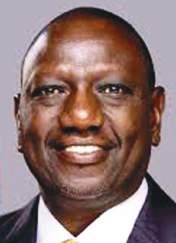
long list of taxes: 16% Value Added Tax on bread, eggs, onions, potatoes and all petroleum products, 15 -20% tax on mobile money transfer charges and similar additional taxes to widen the country’s tax base. In the face of the protests, Kenya’s parliament, June 18 modified parts of the Bill, and removed other parts completely and quickly passed the Bill. The angry youths of Kenya were inconsolable. They did not want any modification. They want the entire Bill dropped. They took to the streets in protest, and from the capital, Nairobi the voices of dissent were echoed in 35 of the 47 counties. Last Tuesday, President Ruto reportedly said those on the streets were “criminals”, and they would be dealt with. On June 24, the lawmakers passed the Bill to be sent for President Ruto’s assent. It was a grave miscalculation. On June 26, the people took their physical anger to Parliament, with the slogan #tupataneThursday – “see you on Thursday.”
Many of the lawmakers took to their heels. Not even the cafeteria was spared. Outside, Kenya burned. The fire of the people’s anger raged like wildfire. President Ruto did not wait for Thursday, penitently he quickly announced that he would not sign the Bill and that he would respect the will of the people. He further announced austerity measures in government spending and promised to hold a multi-sectoral, multi-stakeholder consultation process with the people. On Thursday as promised, the protests continued. The President’s promise not to sign the Bill was not enough. The chant had become #RutomustGo.”
The youths of Kenya have every justification to express personal disappointment with their President. They believe it is Ruto himself that is behind the Finance Bill, using members of his party to see it through parliament. And yet this is the same President who while looking for the job, told the people that he came from a low background like most of the people, he even described himself as “a hustler”, and a champion of the poor and the downtrodden. “I sold chicken at a railway crossing near my home as a child…” he said. “I paid fees for my siblings. God has been kind to me…” It is the same Ruto who wants to tax the people? After the fact, he now wants to consult the people after calling the youths criminals: his arrogance is his undoing. The consultation should
have been the first thing to do. Kenya is one of Africa’s richest economies, but the people have seen their country mismanaged. Even if Kenya wants to take a credit facility from the IMF, the people have the right to know what has been done with all the debts that their government accumulated over the years. Ruto cannot exonerate himself. He was Vice President for 10 years. He has been President since 2022.The youths of Kenya have taught their leader a very strong lesson: that the people own the government, not the other way round. The usual tricks of divide and rule, through ethnicization of all matters political, did not work this time around in Kenya. Neither the ethnic nor the class card could be played against the youths, in Eldoret, Ruto’s home town and among his kith and kin, the Kalenjin, there are on-going protests. To worsen President Ruto’s agony, his own Deputy President, Rigathi Gachagua does not seem to be on the same side with him. It is not only the IMF that he has to worry about. He has his Deputy and the angry youth too, making three sources of headache. Gachagua has openly picked a quarrel with members of the cabinet and he recently accused the Director of the National Intelligence Service of causing the protests because of his incompetence. The Kenya Kwanza Alliance of 2022 seems to be unravelling.
Former President Uhuru Kenyatta and former Prime Minister Raila Odinga must be chuckling. But first, President Ruto needs to rebuild trust with the young people of Kenya who as recently as June 30 were besieging hospitals to donate blood for their colleagues who were shot by the police. What Ruto has done as of yesterday was to scrap the office of the First Lady, Rachel Ruto and the Second Lady, Dorcas Rigathi Gachagua from the new Budget. The Office of the Chief Administrative Secretary (CAS) has also been scrapped. Ruto has also promised to halt opulence and extravagance among Kwanza leaders. He will need to do more. His government must ensure that all the wounded persons who are currently in hospital have their bills picked up by the government and the families of the dead are compensated. Like the youths of Nigeria in 2020, Kenyan youths are insisting that they have no leader that is dictating the pace of the rebellion; they are united by their resolve that the people of Kenya deserve good governance. President Ruto must also take steps to ensure that justice is done. Kenyan policemen behaved exactly like their Nigerian counterparts: firing teargas canisters, water cannons, cracking skulls and shooting live bullets into the crowd, and lying about their brutality, with their faces hidden behind masks. They simply helped to drive a wedge between the people and President Ruto. They must not be allowed to get away with their folly. In 2020, Nigerian youths demanded that the policemen must undergo psychiatric tests. It is an option that the Kenyan government should consider. President Ruto must move swiftly and sack all sycophants around him, in uniform or not. Besides, all the protesters who were abducted and are languishing in detention centres across the country must be released. The Independent Policing Oversight Authority is said to be investigating the conduct of the police. Their report should be made public, and the President should stop saying that he is pleased with the conduct of the police until a proper inquiry is carried out. Many innocent Kenyans lost property running into millions. They deserve to be compensated.
Other African leaders must learn from the Kenyan debacle. Leadership must be driven by respect
for the people. The youths of Kenya have set an example that would inspire other young persons in the continent. Already in Ghana, young persons have gone to X (formerly Twitter) to ask questions about the sale of SSNIT hotels (#HandsOffOurHotels) and they are asking President Nana Akufo-Addo to take note of what is happening in Kenya. Here in Nigeria, not a few commentators have been using the Kenyan situation to illustrate how African leaders take their citizens for granted and the risks that they run in doing so.
Youths in Kenya share a lot in common with their Nigerian counterparts, especially in a post-COVID season. Kenya is in debt. Nigeria is also heavily indebted, and the government at the centre is reportedly trying to run four different budgets in one year creating room for suspicion and doubt. In 2023, President Tinubu promised Nigerians “e lo fokan bale, emi lo kan.” We were told that he has done it before in Lagos, at the centre, he would even do better. He became President in 2023. But there is hunger in the land, with the people shouting “ebi n pa wa” or as Eedris Adulkareem, the musician puts it, “ebi lo kan.” The cost of living is high in Kenya, so it is in Nigeria. Food has become so expensive around here, people who live in communal spaces have learnt to avoid that old practice of leaving your pot of soup on fire to go and pick something in the room. Your pot of soup could get stolen before you get back. In the past, if you went to visit a friend and you met him eating, you were likely to be told to “come and join me, let’s eat.” Not many Nigerians can offer free food again. There is insecurity in the land and it keeps getting worse. Only last weekend, female suicide bombers wreaked havoc in Gwoza and Monguno areas of Borno state, at a wedding, a funeral and a hospital. It is not even safe to get married or fall sick or go to a hospital in Nigeria. Not too long ago, Nigerians were told that terrorists had been decimated, and that the government was winning the war. But it looks like the Boko Haram terrorists are back with greater ferocity. It is frightening. The Tinubu administration has been careful not to tell Nigerians that they would raise taxes. One of the officials has also said Nigeria is not considering asking the IMF for a loan, even if there is widespread suspicion that the government is unusually “friendly” with the IMF/World Bank. One preliminary lesson that Nigerian leaders can take away from the Kenya situation is to avoid the error of careless talk that often gives the impression that the leaders are insensitive. This is certainly not the time for any Nigerian leader to keep saying there is no money to pay Nigerian workers and pensioners a minimum wage. Or that the people should be ready to make sacrifices. The people want better pay, and if there is no money, the leaders should be the ones to take a pay cut. Nigerian leaders cannot ask the people to make sacrifices, and they would be talking about buying new jets, SUVs and building new houses, with taxpayers’ money. Nigerians don’t want to be told by members of the National Assembly that any request that the Executive brings to the Assembly will be granted automatically and there is nothing any citizen can do about it. What Nigerians want to hear are words of hope, reassurance and clear, meaningful attempts to make their lives better. African leaders like to talk loosely. Once they get to power, they forget all the promises that they made, and begin to blame other people for their omissions. President Ruto of Kenya called the youth “treasonous criminals.” He got the answer he did not expect. We can only hope that he has learnt his lesson.